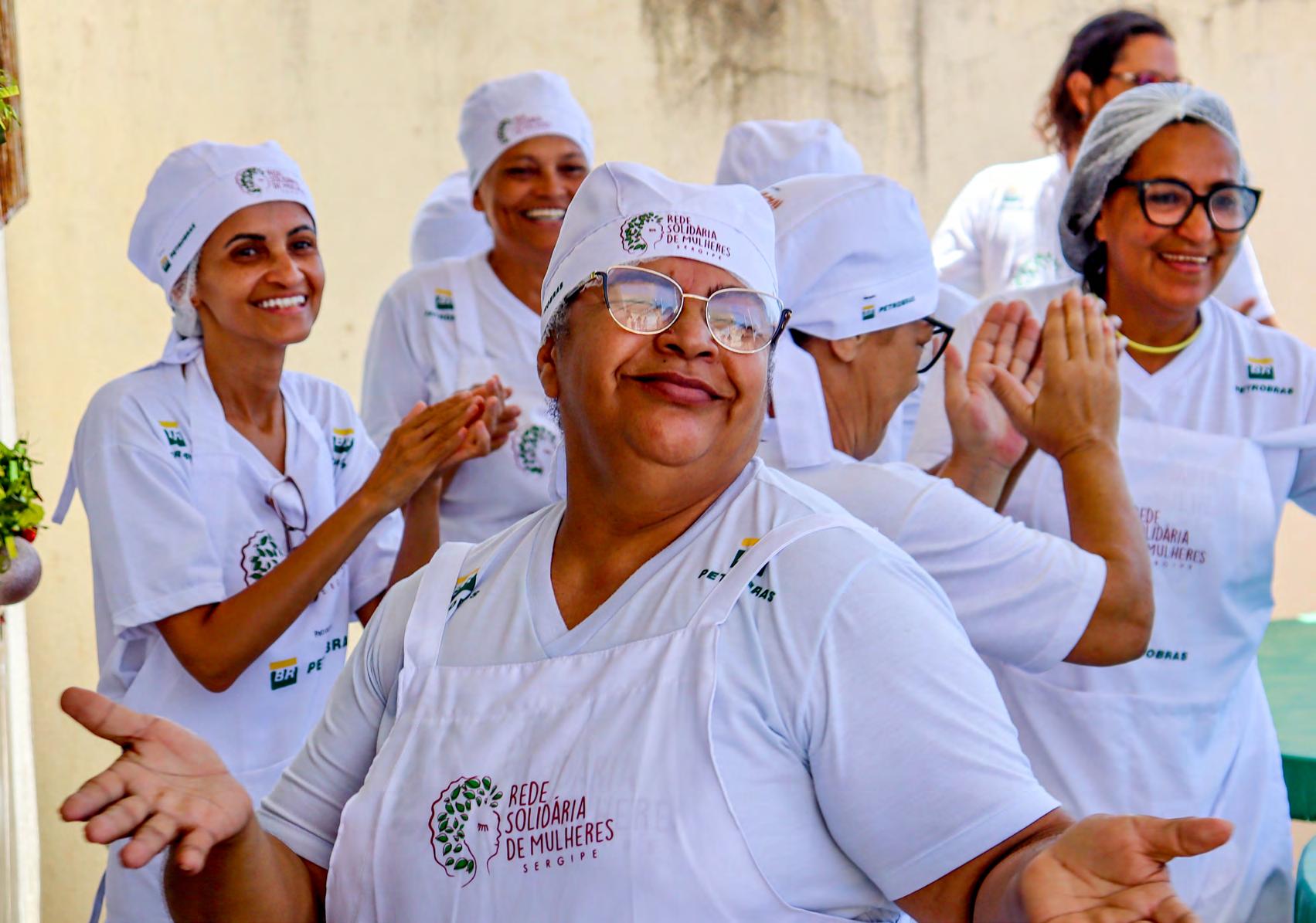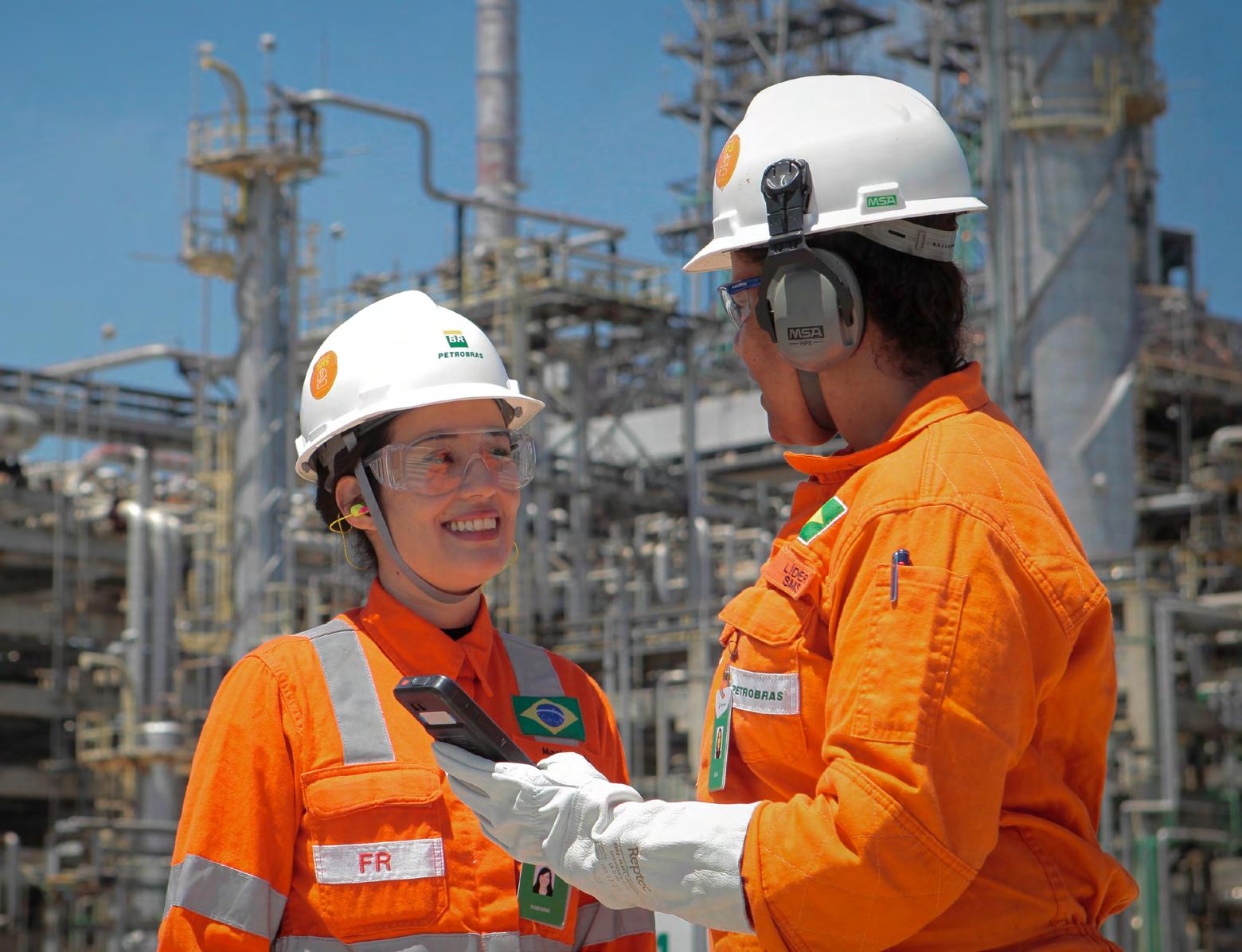

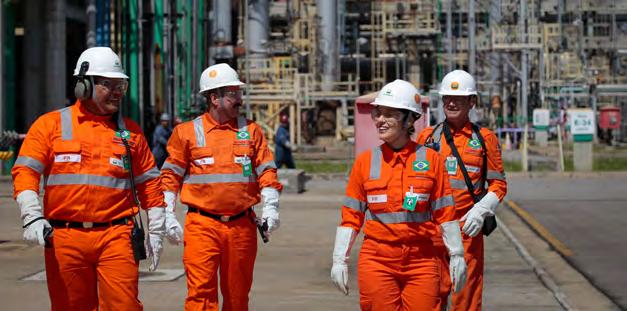




Dear all,
The Petrobras 2024 Human Rights and Corporate Citizenship Supplement represents our ongoing commitment to promoting and respecting human rights in our business and supply chain.
2024 has been marked by significant challenges and achievements in our journey of social responsibility and sustainability. In a global scenario of accelerated transformations, Petrobras reaffirms its position as an agent of positive change.
Our Strategic Plan 2050 and the Business Plan 2025-2029 set forth clear guidelines for our actions as a leading company in the just energy transition. We recognize that this process transcends technological change and incorporates a deep social and environmental commitment to the people and communities that are part of our journey.
In this supplement, we present a comprehensive overview of our initiatives, policies, and practices dedicated to the protection and promotion of human rights. We address fundamental issues such as diversity, equity and inclusion, health and safety at work, relationships with local communities and Indigenous peoples, as well as our actions with our supplier base.
A significant milestone in our human rights journey in 2024 was the implementation of the pilot project for human rights due diligence (HRDD) in our operations. The project will be expanded throughout 2025, aiming to cover all our E&P and refining operations by 2026.
In the supply chain, we have made significant progress in strengthening our commitment to human rights. We implemented a new contractual clause specifically on the subject and initiated a pilot HRDD project with strategic suppliers. These complementary initiatives are essential milestones to ensure that our values and practices permeate the entire value chain, expanding our positive influence beyond the company’s borders.
The Petrobras Program against Sexual and Work Violence has been strengthened, highlighting our determination to provide a safe and respectful work environment. We also implemented the Racial Equity Program, setting a goal of 25% Black individuals in leadership positions by 2029, reaffirming our commitment to diversity and inclusion.
Our commitment to communities is materialized in initiatives such as the Petrobras Socioenvironmental Program, which in 2024 completed its largest public selection, allocating R$ 446 million to 63 approved projects over a four-year period. These initiatives range from environmental conservation to sustainable economic development, prioritizing the empowerment of local communities.
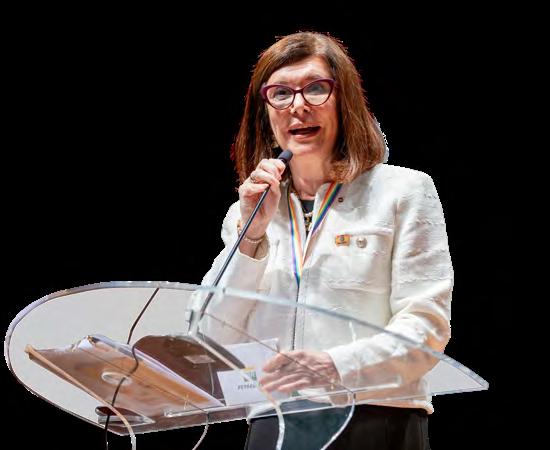
The Autonomy and Income Program deserves special mention for reflecting our commitment to local socioeconomic development. This innovative initiative allocates R$ 350 million over four years to professionally qualify individuals in situations of socioeconomic vulnerability in areas close to our operations. The program prioritizes underrepresented groups, including women, Black, brown, LGBTQIA+ individuals, people with disabilities, and refugees. In addition to technical training and the development of socioemotional skills, we provide grants to participants, with special attention to women with children up to 11 years old.
We recognize that there is still a long way to go. The challenges are complex, dynamic, and diverse, both in Brazil and abroad. However, we are confident that our integrated approach and genuine commitment to human rights keep us on the right track.
I wish everyone an excellent reading!
With respect and determination,
Magda Chambriard CEO of Petrobras

It is our basic principle to respect, raise awareness and promote human rights (HR) in our activities and act in accordance with the Federal Constitution and with the international treaties and conventions ratified by the Brazilian State, such as the International Bill of Human Rights and the International Labor Organization (ILO) Declaration on Fundamental Principles and Rights at Work, as well as the institutional commitments assumed by the company.
Our human rights protection policies, which establish the Company’s strategic guidelines in this area, are approved by the Board of Directors – our highest governance body – and apply fully to our wholly-owned and controlled subsidiaries and, to the extent possible, to our associated companies. These policies formalize our position towards our stakeholders and reinforce the foundational principles for the business continuity of the Petrobras System. Our policies can be found below:
• Human Rights Guidelines
• Social Responsibility Policy
• Guidelines for the Relationship with Indigenous Peoples and Traditional Communities
• Diversity, Equity and Inclusion Policy
• Health, Safety and Environment Policy
• Human Resources Policy
• Policy of the Ombudsman General’s Office
• Compliance Policy
• Protective Intelligence and Corporate Security Policy
• Guide to Ethical Conduct for Petrobras Suppliers
• Resettlement Guidelines
• Petrobras Position on Diversity and Combating Harassment and Discrimination
• Guideline for the Prevention and Combating of Discrimination, Moral Harassment and Sexual Violence
In 2024, we conducted a revision of our Code of Ethical Conduct , adopting a comprehensive collaborative process that involved participation from our workforce, including leadership at several company levels, as well as labor unions.
The document covers ethical conduct, guiding us to put our values into practice, inspiring action aligned with our purpose, and enabling ethical behavior in our daily activities, including a dedicated section on labor relations and human rights protection.
During 2024, we established a working group (WG) to draft Guidelines for Relationships with Indigenous Peoples and Traditional Communities. This WG aimed to define corporate guidelines for engaging with these groups, emphasizing Free, Prior, and Informed Consent. The complete guidelines can be found at: Social Responsibility: actions for a better world | Petrobras. As a result of the WG’s activities, we developed recommendations for related processes and standards.
Corporate policies and guidelines are published on our Management Portal, accessible to our workforce. Our main policies and standards are also published on external portals for public access. Furthermore, we implement a communication and training action plan, considering the scope of the policy, the needs of the target audience, and channel availability. External and internal social media, presentations, and courses are examples of resources used to disseminate our commitments.
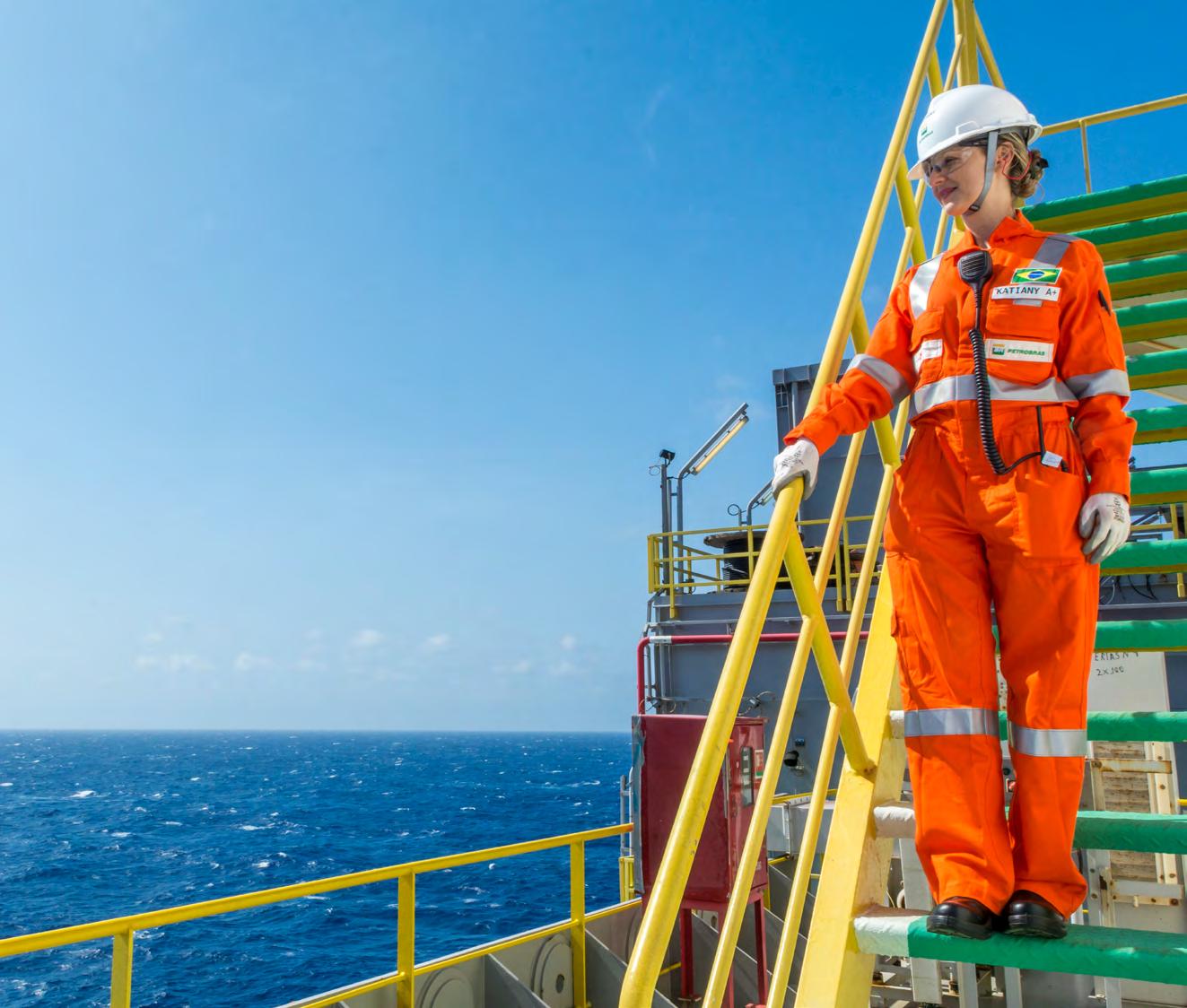

The Strategic Plan 2050 (PE 2050) and the Business Plan 2025-2029 (PN 2025-29) outline the path we will pursue as a leading company in the just energy transition. This involves reducing our emissions, maintaining our share of Brazil’s energy supply, increasing the role of renewable energies in our portfolio, and contributing to the country’s energy security. We believe it is entirely feasible to balance leadership in the just energy transition with responsible oil and gas exploration in the country.
Our current operations, both in the pre-salt layer and new frontiers, are essential for contributing to the country’s energy security and generating the necessary funds to finance the just energy transition. In this sense, our main choices for Petrobras looking forward include:
• Focus on oil and gas, ensuring economic and environmental resilience
• Replenish oil and gas reserves, generating value for society and shareholders
• Expand our industrial facilities, monetizing domestic oil and increasing the supply of low-carbon products
• Aim for operational emissions neutrality
• Lead the just energy transition
With a vision of being the best diversified and integrated energy company in value generation— building a more sustainable world by balancing our focus on oil and gas with diversification into low-carbon businesses (including petrochemicals, fertilizers, and biofuels), while prioritizing sustainability, safety, respect for the environment, and a total focus on people—we reaffirm the following values in PE 2050:
Take care of people, promoting diversity, equity, inclusion, health, well-being and physical and psychological safety
Act with ethics, transparency and actions aligned with words
Create value for the company and stakeholders with a long-term vision and commitment to life, the just energy transition, the environment and society.
Build new pathways for the company, overcoming barriers with collaboration, technology, technical capacity and continuous learning.
Work with excellence and purpose for the development of Petrobras and the country
Our PE 2050 reaffirms the strategy related to environmental, social, and governance (ESG) themes, integrating these elements into a single vision and highlighting four key positions:
We conduct our business with integrity and sustainability, prioritizing safety, pursuing lower emissions, promoting diversity and social development, and contributing to a just energy transition.
Ambitions: (i) Net Zero 2050; (ii Near Zero Methane 2050; (iii) Cap net emissions growth by 2030 (Maintain| emissions at or below 2022 levels, consolidating a 40% reduction since 2015)
Zero Leakage Ambition
Zero Fatality
Ambition
Ambition to be a benchmark in ethics, integrity, and transparency
Our commitment to life is a non-negotiable value, and our recognized safety culture is reinforced daily to strengthen the safety of operations and people. Our ambition within the Plan is zero fatalities and zero leaks/spills.
Regarding the ‘Reduce Carbon Footprint’ position, in addition to the Net Zero 2050 ambition, we specify the ambitions of Near Zero Methane by 2030 and Neutral Net Emissions Growth by 2030 (representing a 40% reduction since 2015).
For each position, we maintain a set of relevant drivers that support and guide our related actions, projects, programs, and commitments. The commitments related to each of the four positions of the “ESG Chart” are presented below, aligned with the concept of integrated ESG:
• Reduce total absolute operational emissions by 30%* by 2030 (Target: 54.8 million tonnes CO2 e/year)
• Achieve zero routine flaring by 2030
Ambitions Net Zero 2050
Near Zero Methane Ambition 2030
Ambition to not exceed by 2030 the absolute emissions level reached in 2022
• Reinject 80 million tonnes of CO2 by 2025 through Carbon Capture, Utilization, and Storage (CCUS) projects
• GHG Intensity in E&P: Achieve a portfolio intensity of 15 kg CO2 e/boe by 2025, maintaining this level through 2030
• GHG Intensity in Refining. Achieve an intensity of 36 kg CO2 /CWT by 2025 and 30 kg CO2 e/CWT by 2030
• Reduce methane emission intensity in the upstream segment by 2025, reaching 0.25 t CH4/thousand tHC, and further reducing it to 0.20 t CH4 /thousand tHC by 2030
Zero Leak Ambition
CARING FOR PEOPLE
Zero Fatality Ambition
* Baseline year: 2015
• Deliver a return to society of at least 150% of the value invested in voluntary socio-environmental projects* (by 2030)
• Be among the top three Oil & Gas companies in human rights rankings by 2030**
• Promote Diversity, Equity and Inclusion:
• Accelerate goal: Achieve 25% women in leadership positions by 2029
• Accelerate goal: Achieve 25% Black individuals in leadership positions by 2029
• Fully implement 100% of the commitments of the Mind in Focus Movement (UN Global Compact) by 203
• Fully implement 100% of the strategic objectives of the WHO Global Action Plan on Physical Activity within the corporate context by 2030
* Per project, measurable (3 years)
** Under Corporate Human Rights Benchmark (CHRB)
Ambition: To be a benchmark in ethics, integrity, and transparency
• Reduce our freshwater withdrawal by 40% by 2030 (Target: 91 million m³/year)
• Reduce solid process waste generation by 30%* by 2030 (Target: 195,000 ton/year)
• Allocate 80% of solid process waste to RRR** pathways by 2030
• Achieve biodiversity gains by 2030, focusing on forests and oceans
• Ensure 100% of Petrobras facilities have biodiversity action plans by 2025
Achieve a net positive impact on vegetated areas by 2030
Increase biodiversity conservation efforts by 30% by 2030
* Baseline year: 2021 | ** Reuse, recycling and recovery

• Promote diversity in Petrobras nominations for positions within our equity holdings: Ensure, by 2030, a minimum of 10% self-declared Black individuals in statutory body positions filled through Petrobras nominations in its equity holdings Achieve, by 2026, a minimum of 30% women in statutory body positions filled through Petrobras nominations in its equity holdings
• Ensure, by 2030, the conclusion of sexual violence investigations within an average timeframe of 60 days
• 100% of relevant suppliers trained in integrity and/or privacy by 2030
• Implement human rights due diligence for 100% of our relevant suppliers by 2030
• Assess the expansion of ESG requirements in 100% of contracts within strategic categories by 2028
• Ensure 70% of relevant suppliers have their GHG emissions inventory publicly available by 2028
Aligned with our strategies, we have top-level metrics that guide our organization towards the main objectives of our plan. These are reflected in senior management scorecards and also incorporated into performance management (PM), the process evaluating competencies and goals for all employees (regardless of position level). For the PN 202529, the following top-level metrics are reaffirmed:
• Greenhouse Gas Emissions Target Achievement Indicator (IAGEE)
• Environmental Commitment Indicator (ICMA), represented by the Volume of Oil and Derivatives Spilled (VAZO)
• Delta Value (DELTA VALUE)
• Commitment to People Safety Indicator (ICSP), represented by indicators considering the Total Recordable Injury Rate (TAR) and the Serious Injury Rate (TAG).
Keeping pace with major global transformations, particularly in the energy, digital, social, and environmental sectors, we are navigating a phase of change and new perspectives. This involves preparing for a just energy transition and a low-carbon economy, including shifts in energy use patterns, while assessing and minimizing social impacts for all stakeholders: our employees, communities, and the entire supply chain.
We understand that the just transition is linked to the promotion of human rights especially through its contribution to the right to a clean and healthy environment and the right to a standard of living that ensures health and well-being for present and future generations. Therefore, the just transition is included as a specific principle in our Social Responsibility Policy, is part of Petrobras’s Sustainability value, and was a theme prioritized by our Human Rights Commission in 2024.
The path we will pursue as a leading Brazilian company in the just energy transition, as outlined in our Strategic Plan 2050, includes decarbonization actions, expanding the supply of lower-emission energy, and socio-environmental projects. Key current practices include:
Selecting and implementing new businesses contributes to a cleaner and healthier environment. We strive to minimize the negative impacts of our new businesses on people and the environment through robust processes for project assessment, licensing, environmental characterization, stakeholder engagement, social and environmental risk analysis, and due diligence for community protection. In 2024, we began integrating regional characterization into the assessment system for low-emission energy projects. This analysis considers local Sustainable Development Goal (SDG) indicators and the potential impacts of the facility. This approach incorporates consideration of risk mitigation needs and opportunities to enhance local benefits into the early phases of project development.
Promoting access to quality energy services. The drivers of our ESG strategy focused on reducing the carbon footprint include seeking energy supply projects that are cost-effective in reducing emissions—that is, projects which promote decarbonization while avoiding increased costs for the end consumers of our products. To achieve this, we have also invested in the energy efficiency of our production processes and in developing technologies to reduce costs and increase the competitiveness of lower-emission solutions, including renewable energies and advanced fossil fuels, as detailed in our Climate Supplement. Our portfolio assessments include metrics related to energy supply and production cost. In collaboration with external partners, we conduct studies on lowest cost decarbonization pathways, aligned with regional potentials, national energy planning, and Brazil’s commitments under the Paris Agreement through its Nationally Determined Contribution (NDC). This enables us to contribute to broader access to lower-emission energy sources with security of supply, reducing energy poverty among our population (especially concerning electricity, cooking fuel, and transport), and providing inputs for a more competitive and sustainable national industry.
In 2024, we began defining social metrics for the just energy transition. The metrics to be tracked include the social benefits derived from investments in energy production, socioenvironmental projects, and technological development, in addition to monitoring the supply of lower-emission energy sources and their respective decarbonization potentials and production costs.
Notably, our businesses aim to provide quality jobs in the energy sector, both directly and indirectly, contributing to social inclusion and the reduction of inequalities.
In the context of the Strategic Plan’s disclosure and discussions for the G20, Petrobras and four other major Brazilian state-owned enterprises – Banco do Brasil, Caixa Econômica, BNDES, and Itaipu Binacional – published a joint letter proposing contributions related to the energy transition, global governance reform, and combating poverty and hunger.
In this document, among other topics, the companies emphasized that coordinated action by state-owned and mixed-capital companies can be a driving force for the just transition, fostering a regenerative and equitable economy that positively impacts Brazil’s population, cities, and supply chains towards a low-carbon economy. Furthermore, committed to due diligence, they reaffirmed their goal of establishing partnerships and relationships with socially and environmentally responsible companies.
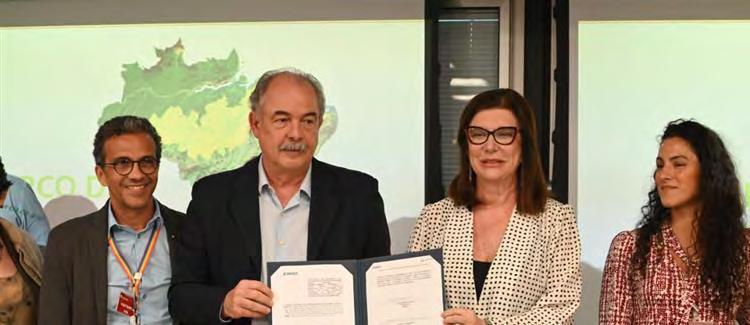
— Due to the nature and scale of our business, we are exposed to risks of human rights violations. Our projects and operations in the exploration, production, refining, and transportation of oil and derivatives involve an extensive supply chain, a significant workforce, and numerous communities located within the area of influence of our facilities, requiring ongoing interactions with society.
We believe that integrated and proactive risk management is essential for delivering safe and sustainable results.
Qualitative risk analysis allows for prioritizing and directing efforts for action plans, aiming to prevent and minimize events with adverse effects while maximizing those that may bring benefits. Our corporate risk management area coordinates the development of the Petrobras Enterprise Risk Matrix, involving all areas within our structure.
The risk matrix update process is continuous but is planned to occur at least twice a year. It involves participation from employees across various disciplines, enabling them to identify and report potential risks throughout the organization, covering risks of all types, including social, environmental, and economic. This process yields the identification of threats and opportunities, their associated controls, their probability of occurrence, assessment of their consequences, and proposed risk responses.
At the end of 2023, the Board of Directors (BoD) approved the inclusion of the social dimension in the corporate guideline that establishes risk probability and impact criteria, as well as guidance for developing action plans and monitoring highseverity risks.
During 2024, enterprise risks began to have their impacts assessed across the social dimension, in addition to the four pre-existing ones (financial; image and reputation; legal and compliance; environmental, health and safety). The social dimension involves assessing potential impacts on rights holders (especially vulnerable social groups, Indigenous Peoples, Quilombolas, and other traditional communities), considering socio-economic aspects, cultural heritage, local infrastructure, and productive activities.
Our Business Risk Matrix includes specific risks related to human rights, such as the risk of human rights violations within our operations and supply chain. This risk and its corresponding response plan will be monitored by the company’s senior management in 2025, including our Board of Directors (BoD), as it has been selected as a strategic risk for the year.
Strategic risks are chosen annually by the Executive Risk Committee and the Executive Board (DE). They are enterprise risks selected for monitoring by the DE, BoD, and their respective advisory committees on corporate risk management, due to their relevance in achieving the company’s strategic goals. Selecting this particular risk as strategic for 2025 underscores the importance Petrobras places on respecting and promoting human rights.
Furthermore, we have an internal audit department responsible for systematically evaluating the risk management process, recommending improvements, and providing senior management and governance bodies with highly transparent and independent assessments.
—
Our governance structure is comprised of: General Shareholders’ Meeting, Audit Committee, Board of Directors (BoD) and its committees (BoD Committees), Audits, General Ombudsman, Executive Board (DE) and its committees (Statutory Technical Committees and Executive Committees).
We are managed by a Board of Directors and an Executive Board, whose responsibilities are set out in the company’s Articles and their respective Internal Regulations. The Basic Organization Plan, in turn, defines the guidelines and models of organization and corporate governance of Petrobras, detailing the general structure of the company and the attributions of its units, whose holders are responsible for submitting proposals to the deliberative bodies provided for in the Bylaws. Our Bylaws and Basic Organization Plan can be found at:
Governance - Petrobras
The decision-making process on sustainability issues, including issues related to human rights, involves several structures of our corporate governance, including the Board of Directors and Executive Board and their respective Advisory Committees. The main responsibilities of these advisory committees are shown below:
BoD Composition:
• 11 members
• Accumulation of the positions of Chairman of the Executive Board and CEO is prohibited
• 1 employee representative
• 55% of independent members. -above the minimum required in the Bylaws, which is 40%.
• 2-year term, with up to 3 reappointments
• It sets the general direction of our business, setting out our mission and strategic objectives, including those related to sustainability.
• Approves Petrobras’ strategic plan and its ESG strategy.
• Defines our corporate governance structure.
• Approves global corporate policies, including those on the environment and social responsibility.
• Approves the senior management compensation program.
• Monitors the most severe business risks, including socio-environmental risks.
• Monitors the company’s performance through financial and non-financial reports.
• Sets the general direction of our business, defining our mission, our strategic goals and our guidelines.
• Establishes our global policies, including strategic commercial, financial, risk, investment, environmental, information disclosure, dividend distribution, transactions with related parties, spokespersons, human resources and minority interests, in compliance with Decree n. 8,945/16.
Advises the Board of Directors on establishing policies and guidelines related to strategic sustainability management, as well as monitoring risks and sustainability indicators.
Advises the Board of Directors on the definition of the strategic plan, including its financeability, and on the evaluation of investment projects, divestments and new business opportunities.
Advises the Board of Directors on matters involving accounting, effectiveness of internal controls, risk management, financial reporting and compliance.
• Acts as an audit committee for companies in the Petrobras conglomerate that do not have their own audit committee.
• Advises Petrobras’ Board of Directors in issuing guidance to the conglomerate’s companies.
• Advises the Board of Directors on establishing appointment, compensation and succession policies, as well as the selection process and eligibility assessment, in accordance with the Law n. 13,303/16 (State-Owned Companies Law).
• Advises the Board of Directors on issues related to the organizational structure and application of the company’s consequences system.
• Composition of the Executive Board:
• 11 CEO and 8 Executive Officers.
• The CEO, the Chief Energy Transition and Sustainability Officer, the Chief Governance and Compliance Officer and the Chief Corporate Affairs Officer are directly responsible for ESG topics, with the other Officers being able to approach the topic within the scope of their responsibilities.
• They are elected by the Board of Directors, with a term of up to two years, with a maximum of three consecutive reelections permitted.
• Advises the Board of Directors (BoD) on related party transactions involving the Federal Union, its autarchies, foundations, and federal state-owned enterprises, particularly when such transactions are identified by the CAE as being outside the company’s normal course of business. This includes reviewing the Onerous Assignment Agreement.
• Issues an opinion to shareholders on certain matters within the competence of the General Meeting, in accordance with our Articles of Incorporation.
• Manages our businesses, in accordance with the mission, objectives, strategies and guidelines established by the Board of Directors.
• Assesses, approves and submits the strategic plan, as well as annual expenditure and investment plans and programs for approval by the Board of Directors.
• Approves the manuals and corporate rules for governance, accounting, finance, personnel management, contracting and execution of works and services, supply and disposal of materials and equipment, operation and other corporate rules necessary to guide the Company’s operations;
• Approves the Sustainability Report.
The Executive Board has advisory committees, linked to the body or one of its members, made up of managers from different areas, in order to guarantee a multidisciplinary vision in the analysis and discussions of matters and in the decision-making process.
• Advises the Executive Board on monitoring and executing investment and divestment projects.
• Analyzes and issues a statement to the Executive Board on Petrobras’ Strategic Plan and Annual Business Plan;
• Analyzes and issues statements to the Executive Board on scenarios and assumptions for the preparation of Annual and Multi-Annual Plans and for investment projects, acquisitions and divestments.
• Provides an assessment on the fulfillment of the requirements and the absence of restrictions on those appointed to act as members of the Board of Directors, the Executive Board and the Audit Committee of the companies in the Petrobras Conglomerate that do not have their own People, Eligibility, Succession and Compensation Committee, under the terms of current legislation and applicable internal regulations;
• Advises the process of appointing members of the Statutory Audit Committees and the People, Eligibility, Succession and Compensation Committees of the Companies in the Petrobras Conglomerate, on the fulfillment of the requirements and the absence of prohibitions for the respective elections, under current legislation and applicable internal regulations;
• Advises the Executive Board on the analysis of matters related to the management of HSE at Petrobras.
• Advises the Executive Board on the monitoring and execution of energy transition and sustainability projects;
• Analyzes and issues statements on decision-making matters involving energy transition and sustainability
• Advises the Executive Committee on the analysis of matters related to the risk management process at Petrobras.
• Assists the Executive Board in monitoring and executing corporate affairs projects.
• Analyze and issue statements on decision-making matters involving corporate affairs
The Social Responsibility Executive Management is specifically responsible for managing the human rights process within the company, ensuring respect for human rights is incorporated across all areas and in relationships with our stakeholders, as well as its broad and cross-cutting integration into our business.
Additionally, we have a Human Rights Commission (CDH) responsible for managing the implementation of the human rights agenda company wide. Currently, the commission comprises 110 members, with representatives from 44 executive and general management units and from 2 subsidiaries (Transpetro and Pbio), operating through three subcommittees.
The commission and its subcommittees are responsible for developing, implementing, and monitoring our Human Rights Action Plan (PADH), and for cascading the human rights commitments set forth in the Strategic Plan down to the management units.
PADH INCLUDES
IMPLEMENTATION
THE PRIORITIZED STRATEGIES FOR DEPLOYING THE HUMAN RIGHTS AGENDA FOR THE 2024-2026 PERIOD WERE:
• Combating discrimination and harassment, including among suppliers.
• Establishing new commitments and public declarations.
• Promoting diversity, equity and inclusion at work, including with suppliers.
• Establishing a human rights due diligence process for operations.
• Integrating human rights into the company’s strategic decision-making.
• Establishing a human rights due diligence process for relevant suppliers.
• Implementing a human rights due diligence in unit decommissioning, investment projects, business partnerships, and joint ventures.
• Centralizing grievance mechanisms, incorporating user satisfaction assessments across channels and continuous monitoring to improve outcomes.
• Human rights training.
In 2024, several human rights training and awareness-raising activities were conducted, aiming to enhance workforce understanding of the subject and strengthen the company’s culture of respect for human rights. Among the actions carried out, the following were highlights:
In 2024, we launched the Valores Petrobras E-Learning program, mandatory for the entire workforce. It provides an in-depth understanding of the company’s new values—Caring for people; Integrity; Sustainability; Innovation; and Commitment to Petrobras and the country—highlighting their importance in the organizational culture and impact on daily operations, aiming to encourage their practical application in the workplace. At the end of the E-Learning program, in February 2025, 41,081 employees had completed the course, representing 98.3%1 of the parent company’s workforce.
- We designed the “Including You in Diversity” learning path, a personalized training open to the entire workforce (Petrobras employees, service providers, interns, and subsidiary staff, subject to access limitations), aimed at promoting critical reflection and the adoption of practices that strengthen diversity within our culture The path focuses on management, careers, and development, considering individuals from diverse ethnic, generational, racial, color, gender groups, and people with disabilities.
The Male Allies Program aims to expand socio-relational skills and competencies to build a more diverse, fair, and balanced corporate environment at Petrobras. The target audience is the entire workforce, with a special focus on men. The program consists of an online course developed by the Papo de Homem Institute and conversation circles among men designed to foster reflection, sharing opportunities, debate, and incorporation of insights into daily actions. There were over 34,000 participations in 2024, with several modules and conversation circles within the program.
1 When considering the target audience—which includes professionals seconded from other equity holdings and external entities, while excluding employees on long-term leave or seconded to other Petrobras System companies and external entities—the completion rate reached 99.8%.
Developed for new employees hired through public entrance exams, the “Human Rights Moment” e-learning training aims to raise awareness about human rights at Petrobras. The e-learning training includes videos covering topics such as unconscious bias; prejudice and discrimination; diversity (gender and race); moral and sexual harassment; inclusion of people with disabilities; sexual diversity; cultural diversity; the Petrobras human rights commission; and privacy and personal data protection. Over one thousand employees participated in this course throughout 2024.
The “Conversation on Masculinities and Violence against Women” initiative aims to encourage reflection on how structural sexism present in our society impacts women, men, and the work environment, acting as a vector for the normalization of conflicts and gender-based violence. Comprising four activities— conversation with leadership, a lecture on “Masculinities, Sexism, and Workplace Relations,” a conversation circle with men, and a listening session with women—the initiative was carried out across 13 company areas, including platforms, refineries, thermoelectric plants, and administrative buildings, and had more than three thousand participants.
“HUMAN RIGHTS AND BUSINESS: A LOOK AT PETROBRAS” E-LEARNING COURSE
Mandatory for employees, the course covers: (i). Human rights and their importance for society and corporate strategic planning; (ii). How Petrobras has progressed in actions aimed at respecting these rights across all its activities; (iii). The main public commitment undertaken by Petrobras regarding human rights, embodied in the Human Rights Guidelines launched in 2020; (iv). How human rights are present in our daily lives, both inside and outside the company. In 2024, there were over two thousand participants, reaching a completion rate of over 98% of employees trained since the course launch in 2022.
IN BUSINESS AND HUMAN RIGHTS FOR SPECIALISTS IN LEGAL, SOCIAL RESPONSIBILITY AND OTHER AREAS INVOLVED IN HUMAN RIGHTS INITIATIVES AT PETROBRAS
In 2024, the first session of the “Business and Human Rights” extension course was offered. It aimed to train 60 employees from strategic company areas—most of whom are representatives on the Human Rights Commission—on the topic of business and human rights, as way to expand their knowledge in this area and improve their effectiveness within their respective management units. The course was taught by the Pontifical Catholic University of Rio de Janeiro (PUC-Rio) and had a total workload of 45 hours.
Training aimed at new leaders includes human rights modules covering diversity and respect for differences, Petrobras culture and values, combating workplace violence, and nonviolent communication. Over 200 participants completed this in 2024.
Consultants’ Journey – an event that promotes the exchange of experiences, practical learning, and connections among Petrobras consultants, fostering idea generation and new possibilities. In 2024, with 100 participants, it included the module “Space for Exposure and - -- Dialogue on Harassment and Molestation,” addressing the prevention and combatting of sexual violence.
General leadership development, which includes modules, lectures, and dialogues on Diversity, Equity, and Inclusion (DEI), Environmental, Social, and Governance (ESG), humanized leadership, and mindfulness.
Senior Leadership Development featuring modules focused on responsible management, including ESG, DEI, and inclusive management practices.
As part of the Racial Equity Program, we held training sessions for all of our leadership for the first time. In this sense, we engaged our Board of Directors, Executive Board and other managers in the discussion around the promotion of racial equity as a strategy to overcome racism and address racial inequalities at Petrobras and in the country. Highly experienced and recognized market professionals led these debates. The training sessions took place in November 2024 and were attended by 799 leaders.
We provided the entire workforce with an e-learning training on “Preventing and Combating Discrimination, Moral Harassment and Sexual Violence.” This training is mandatory for all company employees and is part of the mandatory training cycle for new hires. In 2024, it was made available to the entire contracted workforce. Throughout the year, we also held lectures for the workforce to inform about these forms of violence and their detrimental effects on the work environment and victims.
Our Legal Department developed the Legal Diversity Supplement, comprising several booklets, each addressing a relevant theme concerning the rights of under-represented groups. The booklets contain essential information on existing legislation supporting these rights and imposing responsibilities on individuals and companies, alongside high court decisions and various actions implemented by Petrobras demonstrating alignment with social, market, and legal demands. To date, four booklets have been published: Gender Equity and Women’s Rights; Sexual Diversity; Rights of People with Disabilities; and Racial Equity. The booklets were made available to the entire workforce.
In 2024, we promoted a series of events focused on disseminating the diversity booklets. These interactive dialogue sessions aimed to empower participants to become information multipliers. This collaborative approach seeks to expand human rights education within the company, reaching ever more employees and fostering a culture of respect, inclusion, and diversity at all levels.
Throughout 2024, we carried out several awareness-raising actions on human rights issues with a focus on diversity, equity and inclusion with our workforce. Among the actions carried out, the following were highlights:
On Trans Visibility Day (January 29th), we carried out several actions to promote inclusion and respect for trans people. One key initiative was the live stream “Challenges and achievements in the journey of trans people at Petrobras,” broadcast to the entire workforce. It featured participation from leaders and trans colleagues who shared their experiences. During the live stream, information was presented about the health program for trans individuals and the launch of the LGBTQIA+ Affinity Group.
During March, reflecting on International Women’s Day (March 8th), we held various actions to promote diversity and gender equity. Activities included the lecture “Ethics and gender: how to position oneself today?”, which addressed the importance of ethics and gender in the current context and drew over three thousand participants from the workforce.

We also held a conversation round on the climacteric, menopause, and career, which discussed the impacts of these stages on women’s professional lives. Another conversation circle addressed challenges and opportunities for women in the labor market. Additionally, we developed educational material on the importance of gender equity, which was distributed to the company’s diversity groups.
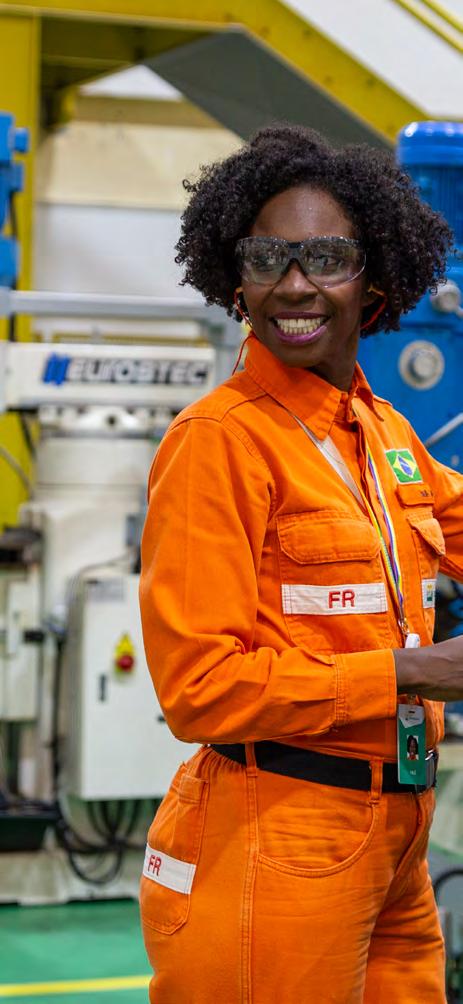
On World Autism Awareness Day (April 2nd), we hosted a live stream aimed at raising workforce awareness regarding autism spectrum disorder (ASD) and promoting a more inclusive work environment. The event also featured a conversation round where autistic employees shared their experiences.

To celebrate LGBTQIA+ Pride Day (June 28th), we promoted several activities focused on diversity and inclusion. The “Proud to Be Who We Are” campaign involved several employees from the LGBTQIA+ community in photos and videos celebrating their pride, shared on internal and external platforms. Twenty-two “Pride Caravans” were held, where members of the LGBTQIA+ affinity group gave presentations on sexual diversity aiming for awareness-raising and education, reaching about 4,000 participants across several units. Online events included the live stream “Mental Health of LGBTQIA+ People” and the lecture “The Career of LGBTQIA+ People,” featuring specialists in diversity, equity, and inclusion.
Additionally, cultural fairs were held, along with a lecture on LGBTQIA+ visibility titled “From Invisibility to LGBTQIA+ Pride in Organizations.” Educational material themed “Shall we talk about sexual orientation and gender diversity?” was also developed and distributed to diversity groups to cascade the presentation within their work teams. Finally, 25 buildings, including administrative and operational facilities, were illuminated with rainbow colors.
During Lilac August, a national awareness campaign focused on ending violence against women, we hosted the live stream “Maria da Penha: A Life Story.” The event featured a lecture by Maria da Penha herself, a Brazilian nominated for the Nobel Peace Prize in 2017 for her activism against domestic and family violence towards women. Streamed to the entire workforce, the event drew around 3,500 people.
For the second consecutive year, we illuminated our platforms, refineries, power plants, and administrative buildings in lilac. We also conducted other awareness actions, including lectures featuring female delegates from Special Police Stations for Assistance to Women (DEAMs) and representatives from the Maria da Penha Patrol.
Additionally, we joined the National Mobilization for Zero Femicide, an initiative launched by the Federal Government that unites efforts from several societal sectors to eradicate femicides by preventing all forms of gender-based violence against women.
On National Lesbian Visibility Day (August 29th), we reaffirmed our commitment to diversity and inclusion by hosting the live stream “Compulsory Heterosexuality and its Impacts on Lesbian Women.”
During September, marking the National Day of Struggle for People with Disabilities (September 21st), we carried out several actions promoting reflection on the current scenario and future perspectives related to key advocacy points for people with disabilities The internal campaign featured participation from employees with disabilities and Paralympic athletes from Team Petrobras, reaching over 175,000 views. Additionally, we illuminated 26 buildings under the Green September campaign and organized several internal events - including lectures on “Neurodiversity and reasonable accommodations” and “Chromatic accessibility and inclusion of colorblind people.” We also held a talk show featuring Paralympic athletes from Team Petrobras 2 .
We also hosted lectures on: “Scenarios of inclusion for people with disabilities in Brazil and at Petrobras – challenges and progress,” and “Biopsychosocial assessment of people with disabilities,” the latter aimed at health professionals. Furthermore, a conversation circle was held focusing on the careers of people with disabilities.
Finally, the “Inclusive Education Week at Petrobras University” took place, involving several specialists and internal participants, as a way to familiarize participants with knowledge and practices regarding the inclusion and accessibility of people with disabilities in educational and work environments.
2 Petrobras’ sports sponsorship of Brazilian athletes reflects the company’s commitment to sports and the development of national talent.
Throughout November, we carried out a series of initiatives to reflect on Black Consciousness Month and promote racial equity. The internal campaign “Stories that build our history” featured Black employees whose photos and stories were presented across several company units.
The program also included diverse lectures on the importance of racial equity at Petrobras and in Brazil, targeting all employees and different leadership levels, including: a panel at the HSE Congress themed “Repercussions of racism in work relations”; a major event titled “Empowerment and self-esteem of Black people as tools to combat institutional racism”; and the activity “Aquilombar - From resistance to empowerment,” featuring participation from Black individuals from Quilombos celebrating the history of Black resistance.
The mentorship program for Black employees, “Negritudes Petrobras,” was also launched as an initiative for professional development, while a live stream focused on the careers of Black and Brown professionals was held. We also organized 24 caravans centered on racial equity, conducting lectures aimed at awareness-raising and education, reaching about two thousand participants across various units.
In addition to the actions above, awareness activities were also held on the following dates: Day Against Religious Intolerance (January 21st), Digital Inclusion Day (March 29th), Day Against LGBTphobia (May 17th), International Day of Black Latin American and Caribbean Women (July 25th), International and National Day of Senior Citizens (October 1st), Day of the Northeasterner (October 8th).
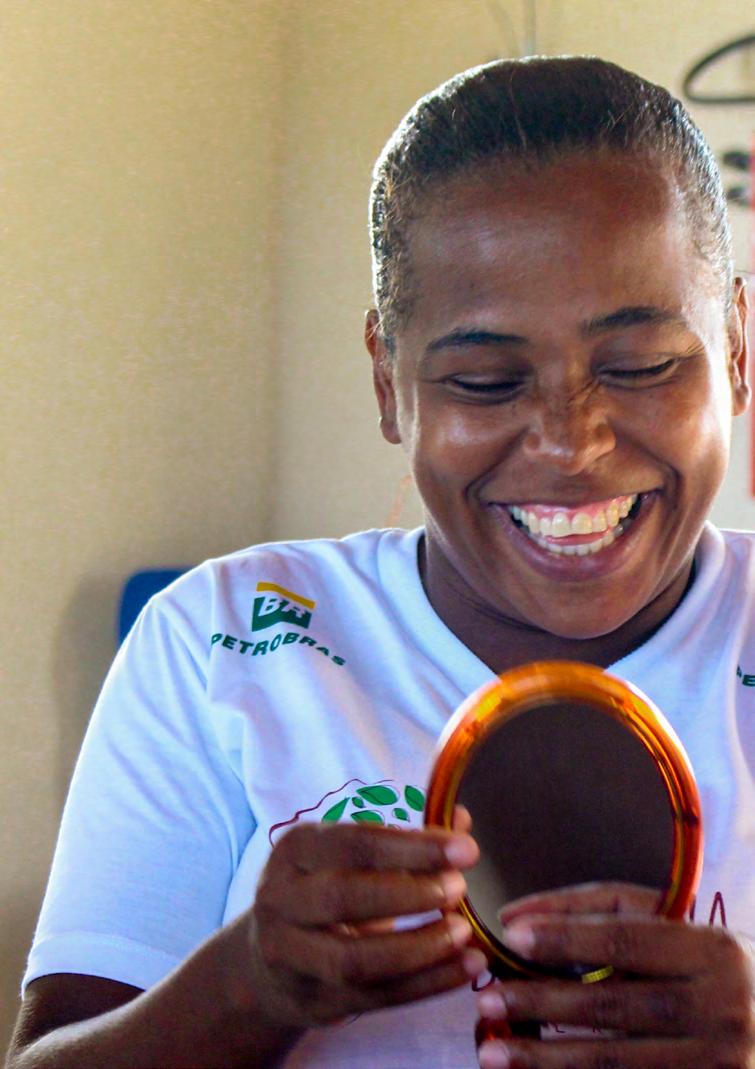

PUBLIC COMMITMENT
Considering our public commitments to respect human rights and fulfill our responsibility to prevent negative impacts arising from our activities, we are working to establish a human rights due diligence (HRDD) process appropriate for our size and complexity and integrated into our E&P and refining operations. .
IDENTIFICATION AND ASSESSMENT OF RISKS AND IMPACTS
HUMAN RIGHTS DUE DILIGENCE
MONITORING COMMUNICATION
INTEGRATION PREVENTION MITIGATION
REMEDIATION & GRIEVANCE MECHANISMS
We possess an institutional framework committed to respecting human rights, incorporated into our policies and management systems, alongside several processes for the identification, assessment, monitoring, and mitigation of human rights risks and impacts. These processes seek to prevent human rights violations, and are organized into three main areas of action:
• WORKFORCE
• COMMUNITIES
• SUPPLY CHAIN AND PARTNERS
The HRDD methodology we adopt is guided by the United Nations (UN) Guiding Principles (UNGPs) on Business and Human Rights and considers the guidance from Ipieca, the global oil and gas industry association for environmental and social performance.
Although we have several processes for managing human rights risks, we recognize that implementing an integrated human rights due diligence (HRDD) process across all our E&P and refining operations—which are carried out in diverse operational units distributed throughout different regions of the country—requires an innovative approach, including robust engagement with rights holders potentially affected by our activities.
In 2024, we continued the pilot project for implementing integrated HRDD at Petrobras. The project was implemented across five operations on a pilot basis, in partnership with a specialized external consulting firm.
The first phase included the Henrique Lage Refinery (Revap) in São Paulo;
the Campos Basin Operations Unit (UO-BC) in Rio de Janeiro; and the Lubnor Refinery in the state of Ceará. In the second phase, the pilot took place at the Espírito Santo Operations Unit (UO-ES) and alongside the Rota 2 Gas Pipeline Project in Rio de Janeiro.
The exercise of implementing HRDD considered important parameters and steps for structuring HRDD as an integrated process. Initially, we identified priority human rights themes for companies in Brazil’s oil and gas industry and subsequently incorporated themes related to the local contexts of each pilot operation.
Based on the critical themes mapped out and through active listening with rights holders, these themes were confirmed during field visits. Having gathered perceptions from interviewed rights holders, the process proceeded to the human rights risk assessment stage, adapting it based on insights from the listening sessions, preliminary studies, and the specific context in which each operation is situated.
Based on the results of the human rights risk and impact assessment, proposals for actions were raised for evaluation and prioritization by each of the pilot operations. Thus, after the conclusion of each of the 5 pilots, Petrobras will deepen its perceptions in order to assess the effectiveness of these actions as measures for prevention, mitigation and remediation of the mapped human rights risks.
The pilot project generated learnings and produced essential inputs for developing execution standards that will assist in future applications of human rights due diligence (HRDD) within our operations, establishing it as a continuous process. Throughout 2025, the project will be extended to the remaining operations, aiming to achieve the Strategic Plan (PE) target of implementing HRDD in 100% of our own E&P and refining operations by 2026.
4 STATES AND 15 MUNICIPALITIES VISITED 5
REVAP, UO-BC, LUBNOR, UO-ES, ROTA 2/LAGOMAR
Listening sessions engaged a wide range of rights holders and stakeholders, including Petrobras workforce (direct and contractor employees), union representatives, CIPA members (Internal Commission for Accident Prevention), Civil Defense, municipal governments, Child Services, municipal public sector representatives, education and health professionals, traditional communities (such as fishing colonies, shellfish gatherers’ associations, fishing associations, Quilombola communities), NGO community representatives, community association leaders, formal and informal local leaders, and local residents, among others.
• Approximately 50 field days conducted
individuals consulted, including members of traditional communities
• Over 100 interviews held with Petrobras workforce professionals, formal and informal leaders, local residents, and public agencies
• 13 focus groups involving direct employees and the contractor workforce
• 9 community conversation circles held
• 4 engagement meetings with leaders involved in the pilot units and 5 workshops on Business and Human Rights with approximately 188 participants
São José dos Campos (SP), Macaé (RJ), Campos dos Goytacazes (RJ),Búzios (RJ), Arraial do Cabo (RJ),Fortaleza (CE),Vitória (ES), Vila Velha (ES),Presidente Kennedy (ES),Itapemirim (ES), Anchieta (ES), Guarapari (ES),Piúma (ES), Linhares (ES),Serra (ES).
The priority human rights (HR) themes for Petrobras consider the HR themes prevalent in Brazil’s oil and gas industry and the global context of due diligence, drawing from international guidance documents and standards.
Priority human rights themes relate to a higher risk of severe negative impacts arising from the company’s activities or its business relationships. In the pilot phase of the human rights due diligence, the following priority themes were identified across the five operations conducted:
Decent work opportunities and working conditions
1 6 2 7 3 8 4 9 5 10
Moral and sexual harassment
Quality of life, health, and safety of communities in the area of influence
Impacts on indigenous peoples and traditional communities
These themes are extremely relevant for the company and direct our human rights diligence actions, as we will detail in the following topics.
Diversity, equity and inclusion
Right to compensation for victims
Through the pioneering implementation of the five pilot HRDD projects—in which active listening with rights holders, information research, and document analysis were conducted and analyzed—we were able to map the priority human rights themes for Petrobras. This pilot exercise will serve as input for defining the priority themes for the entire company and will refine the initial assessment with greater accuracy as the remaining units undergo HRDD throughout 2025 and 2026.
Occupational health and safety
Right to land
Property security and use of force
Retaliation against the work of human rights advocates
As a way to contribute to mitigating and addressing the risks and impacts identified in the HRDD assessments, in 2024 we initiated the development of corporate human rights programs, prioritizing the themes “Addressing the Sexual Exploitation of Children and Adolescents” and “Combating Slave-Like Labor.” These programs, set for implementation starting in 2025, are institutional in scope and aligned with the Petrobras Human Rights Action Plan (PADH), with future application across all areas of our business and in relationships with our stakeholders, offering technical, methodological, and training solutions for deployment by local teams.
—
We provide direct contact channels with us to register complaints, reports and other manifestations, such as the General Ombudsman, the Complaint Channel and the Customer Service Center (SAC).
Our Reporting Channel is prepared to receive incidents from the workforce related to violence at work, sexual violence, discrimination, among other labor and human rights issues.
The General Ombudsman receives and handles all manifestations from stakeholders, both those coming from the internal public and those from the external public. The operation of a corporate structure with autonomy and independence, linked to the BoD, allows the community or any person affected by Petrobras’ business to exercise their right to make demands to the company.
The General Ombudsman’s channels are intended as a second service to stakeholders, with a more individualized, empathetic and welcoming approach. The General Ombudsman’s Office is also responsible for managing the Complaints Channel, through which we receive, process and report, with independence, impartiality and confidentiality, complaints made by all of the company’s stakeholders. Available in Portuguese, English and Spanish, 24-7, it can be accessed via the website or by telephone.
In addition to being a service channel for stakeholders, the General Ombudsman’s Office also works to ensure the effectiveness of the Access to Information Law and the integrity of the complaint handling process in the company.
After dealing with complaints, requests, suggestions or compliments, we carry out surveys to assess the user’s level of satisfaction with the service provided, including in relation to the quality of the information provided.
Information about the reports received by the Ombudsman’s Office is published annually in the General Ombudsman’s Balance Sheet , and on the Transparency Portal
The complaints received are classified in groups and themes, in accordance with best market practices and considering Petrobras’ specificities and sent to the investigation areas.
Since 2022, the Whistleblower Protection Guideline has set forth rules protecting against retaliation—including disproportionate, harmful or potentially harmful, abusive, or unfair treatment—for individuals who report wrongdoing related to company activities in good faith, or who have unequivocally disclosed their intention to do so. The protection also extends to any person who provides information or manages a complaint.
In 2024, we received 127 reports of discrimination 3, and the accused parties were: 45% employees, 43% service providers/ contractors, and 12% unidentified individuals.
3 The information in the reporting channel relates to the entire Petrobras system.
As of December 2024, 37 of these reports were under review, 3 were confirmed or partially confirmed, and 14 were unsubstantiated. When reporters opt for anonymity and do not provide sufficient information, or if the reporter or victim does not authorize proceeding with the investigation, the Ombudsman’s Office shelves the report. Thus, 73 discrimination reports were shelved for these reasons. Information from the whistleblower channel pertains to the entire Petrobras system.
Reports of discrimination involving employees are investigated by a specialized and independent management unit within the Governance and Compliance Directorate. Regarding accountability measures for confirmed cases involving employees, one suspension was applied, and additional training was conducted. In cases involving contractor employees reported for noncompliance with the Code of Ethical Conduct, the matter is handled by Petrobras’s contract management in conjunction with the respective employer.
In May 2023, in response to reports received by the company and issues disclosed in the media, we launched the Petrobras Program against Sexual Violence (PPCVS). This corporate program was created to centralize and monitor the execution of actions—both ongoing and planned—to combat harassment, molestation, and sexual violence within the company.
Composed of initiatives across 4 pillars (Strategy, Prevention, Support, and Complaint Handling), the PPCVS action plan included several actions throughout 2023.
• Creation of the Support Channel for affected individuals
• Publication of new policies, such as the Diversity, Equity, and Inclusion Policy and the Guideline for Preventing and Combating Discrimination, Moral Harassment, and Sexual Violence
• Definition of diversity targets
• Provision of an E-learning module on Preventing and Combating Discrimination, Moral Harassment, and Sexual Violence
• Reduction of the average investigation timeframe for sexual violence complaints
• Centralization of sexual violence complaint investigations within a single, dedicated company department
In 2024, we continued implementing the PPCVS actions. Considering the progress achieved since the program’s creation, our Executive Board approved the expansion of its scope in April. It now also covers combating other forms of workplace violence—including moral harassment, discrimination, and retaliation—and the program was renamed the Petrobras Program against Sexual and Workplace Violence (PPCVST).
As in 2023, suggestions were gathered from the workforce to enhance existing measures for preventing and combating discrimination, moral harassment, and sexual violence, aiming to foster an increasingly respectful, dignified, healthy, safe, and sustainable work environment. At the end of this process, 915 suggestions were received.
Throughout 2024, 17 actions were completed, of which we highlight:
• A communication campaign on combating sexual violence, including the production and dissemination of several related materials such as posters, banners, short videos, stickers, boarding briefings, building illuminations, and posts on the Intranet and Workplace (our internal social network).
• Inclusion of provisions to combat sexual violence in the new human rights clause for service provision contracts, such as commitments not to practice or tolerate prejudice, discrimination, harassment, or sexual violence; non-retaliation against any form of reporting; and full cooperation in audits and investigations related to reports of workplace and sexual violence. This PPCVS action plan, comprised of initiatives across four pillars (Strategy, Prevention, Support, and Complaint Handling), included several actions between 2023 and
• Incorporation of respect for and valuing of differences, along with humanized leadership principles, into the Petrobras Competency Model, aligned with our challenges, strategy, and new company values.
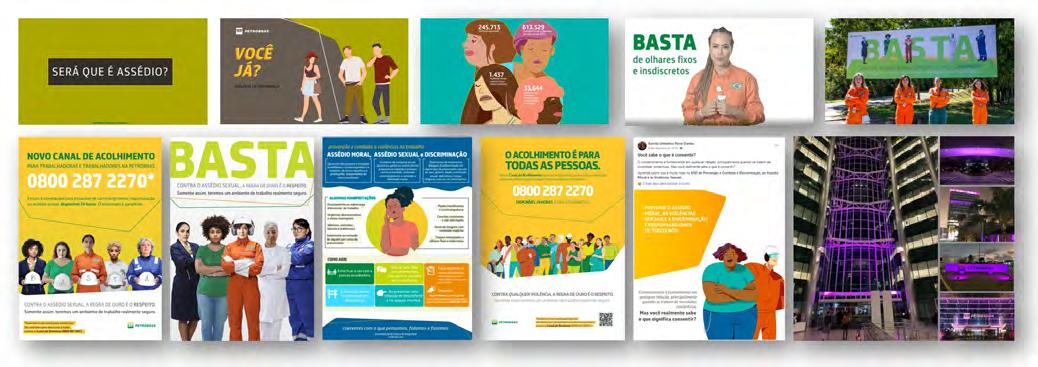
More information on the human rights provision is available in the supplier due diligence topic of this document.
• Revision of the Code of Ethical Conduct, where we adopted a comprehensive collaborative process for the first time, including specific chapters on Labor Relations and Human Rights Protection.
Launch of the Petrobras Values E-learning program
• Implementation of the “masculinities” axis within diversity management, covering the provision of the “Male Allies Program” training path, the implementation of the “Conversation on Masculinities and Violence against Women” initiative, lectures on masculinities, and conversation rounds with men.
• Expansion of the Support Channel’s scope, making it available for listening and guidance to individuals affected by any type of workplace violence, such as moral harassment and discrimination, in addition to sexual violence. Operating 24/7 with guaranteed full confidentiality, the channel features a multidisciplinary team trained in a biopsychosocial approach. It can be accessed not only by victims of violence but by any member of our workforce seeking a safe space to gain strength and cope with challenges related to situations of violence.
• Since its implementation, the Support Channel has received high praise in satisfaction surveys, achieving a favorability index of 83.15% and an availability index of 100%. Both the program and the channel were important innovative responses for mitigating risks related to cases of violence within the company.
• Creation of a dedicated management unit within the General Ombudsman’s Office, staffed exclusively by women, to manage the process of handling and monitoring reports related to labor relations, covering sexual and workplace violence, as well as labor relations incidents.
Provision for victims/reporters in cases of workplace violence (in addition to sexual violence) to designate a companion to assist them in following up on their report with the General Ombudsman’s Office, during investigation interviews, or when requested by the investigation team to appear or provide information/documents.
Aiming to resolve labor conflicts more quickly, reaching settlements is a strategic initiative for dispute resolution and litigation reduction. Focusing on increasing the number of settlements in less complex cases, efforts began in 2022 to engage more closely with the Judicial Centers for Consensual Dispute Resolution Methods of the Regional Labor Courts (TRTs) and the Superior Labor Court (TST). This closer engagement resulted in signing technical cooperation agreements with the TST and TRTs in various states.
The objective of these cooperation agreements is to establish routines and procedures, in coordination with the Courts, for scheduling conciliation hearings in outsourcing-related cases during the execution phase.
With this initiative, in addition to increasing the number of settlements, we expect a reduction in appeals, guarantees, and seizures, as it involves moving towards a consensual and definitive solution with significant social impact. This approach speeds up the receipt of payments due to contractor employees and enables the swift closure of legal cases.
The cooperation agreements themselves do not involve any commitment to financial disbursement. Nonetheless, they signify an important relationship with the Labor Judiciary.

We widely publicize our contact channels to the communities living in the areas of influence of our operations. Complaints and reports can be made through our General Ombudsman’s Office channels, community committees, and the Customer Service (SAC) via a 24/7 toll-free line (0800 Fale Conosco).
In 2024, 483 communityrelated requests4 received via SAC were handled by the Social Responsibility area. This information is categorized by unit and theme and is monitored by a specific dashboard. Communications from communities received via SAC in 2024, classified by complaint type, are indicated below:
Dust/soot
Strong odor/smell
Noise
Vibration/tremorsdetonation
Other community issues
Fire/burning on petrobras land
High flame on torch/flare
Leakage of oil, derivatives, and petrochemicals
Request for information
Emission/smoke
Fire/excavation/encroachment on pipeline rights-of-way
Request for pruning/cutting vegetation in petrobras area
Request for support/assistance
Explosion/fire at Petrobras facilities
Water main issues
Conflict involving petrobras land
Works and installations carried out by petrobras
Request for compensation/indemnification
Water leak/flooding
4 SAC information relates to the parent company Petrobras.
Damaged/stolen equipment
Among the communications received via SAC, one of the most recurring complaints related to the release of non-hazardous particulate matter at the Alberto Pasqualini Refinery (Refap) and the Capuava Refinery (Recap).
In May 2024, there was an unplanned point release of non-hazardous particulate matter from the catalyst used in the process at Recap, in Mauá-SP. The event occurred when the industrial plant was restarting after a maintenance shutdown, during the startup process. This occurrence was duly clarified to communities in the unit’s area of influence and was the main topic discussed in the local community committee meeting, where it was explained that the released product is harmless to people and the environment.
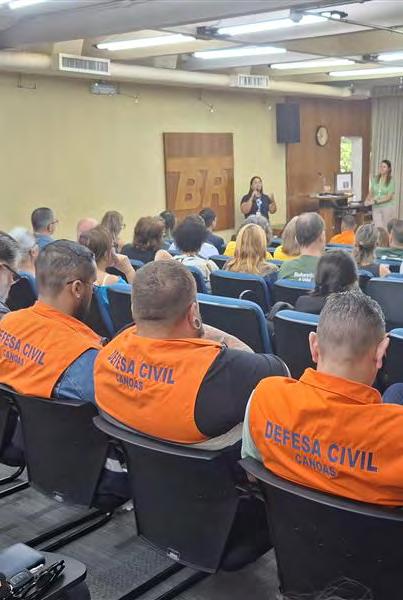
In July 2024, there was an unplanned release of non-hazardous particulate matter at the Refap industrial plant in Canoas-RS. In response to the event, our teams mobilized to assist the residents of the affected area. For weeks, the teams were present to support, guide, and seek solutions for the demands presented by the community, offering continuous and effective support.
Additionally, we established a dedicated technical commission to investigate the causes of both events, aiming to identify the root and contributing causes. This initiative is part of our commitment to develop an action plan that prevents the recurrence of similar situations in the future. We reaffirm our commitment to promoting the safety and well-being of residents, strengthening trust and transparency in our actions.
communication channel with the community
[TRANSPETRO] Our subsidiary Transpetro also has its own communication channel with the community. In 2024, the company’s emergency hotline 168 handled 14,365 calls in total. Of these, 4,215 were classified as valid for analysis. Valid calls were classified into three groups:
1- Everyday occurrences (such as high vegetation, general complaints, registration inquiries, call back to find out how the event is going): 3,024 (72%)
2- Emergency (such as fire, smell, excavation): 1,053 (25%)
3- Pipeline protection (reports of trespassing, suspicious movement, product theft): 138 (3%) .
In 2024, our General Ombudsman’s Office received 387 communications from local communities surrounding the parent company Petrobras’s operations.
22 confirmed
unconfirmed
dismissed 16 in progress
142 complaints 61 addressed 68 not addressed 13 dismissed 0 pending 19 suggestions, opinions and compliments
addressed
Examples of these reports include accounts of abnormal air emissions, fraudulent use of the Petrobras name in job offer scams, invasion or improper occupation of land, and irregularities in the execution of companysupported projects.
Specifically concerning Indigenous Peoples or traditional communities (artisanal fisherfolk, Quilombolas, shellfish gatherers, among others), we received 17 communications via our General Ombudsman’s Office in 2024, comprising 13 reports, 3 complaints, and 1 request. Eleven reports related to improper employee conduct in social projects involving fisherfolk, and two reports concerned compliance incidents in social projects with Quilombolas and fisherfolk. As of December 2024, nine of these reports had been dismissed due to insufficient information, and four were under review. The three complaints and one information request received pertained to issues related to social projects with fisherfolk; two were resolved, one was unresolved due to technical reasons, and one was dismissed for insufficient information.
On September 11, 2024, the 4th Labor Court of Santa Marta, Colombia, granted a protective legal action filed by the Taganga Indigenous Council which, among other requests, ordered the suspension of exploration and production activities in the GUA-OFF-0 exploratory drilling area of interest (previously Tayrona) at the Sirius 2 well (previously Uchuva 2).
On October 29, 2024, the Superior Court of Santa Marta ordered Colombia’s Ministry of the Interior to analyze and issue a binding opinion on whether prior consultation with the Taganga community is appropriate and necessary. This decision allowed drilling operations and related operational activities, which are vital for the country’s energy security, to continue. There are currently no restrictions, orders, or injunctions hindering activities in the contract area, including exploratory or development operations.
Petrobras International Braspetro B.V. – Colombia Branch reiterates its commitment to the country and will continue working safely, respecting life, people, and the environment, while recognizing the importance of dialogue with communities and respect for the decisions of the country’s authorities.
[RS/RSREG] We seek to respond to and address recurring requests from communities through actions established in the social responsibility plans of our business units. Additionally, we present and discuss these issues through community committees held at our operational units. We also respond to community demands in the territories where we operate with mandatory actions stemming from environmental licensing conditions (such as Environmental Education Projects and compensation projects for fishing activities), and with voluntary actions like corporate social responsibility projects and socioenvironmental investments.
Our Whistleblower Channel is also equipped to receive reports related to suppliers, such as those concerning labor practices and human rights issues.
The reports are investigated, and based on the investigation findings, our Procurement department is alerted to mitigate risks in new contracting processes. If contractual clauses are not complied with, the contract manager adopts the appropriate measures.
In 2024, most complaints registered by the General Ombudsman’s Office were related to the theme “Procurement of Goods and Services.”
Key issues within this context involved relationships between contracted companies and their workforce, especially regarding labor irregularities. Our Ombudsman’s Office plays a central role in analyzing these complaints, aiming to identify aspects relevant to human rights protection.
To strengthen these efforts, our General Ombudsman’s Office has widely publicized the Labor Irregularities Matrix, a strategic tool that enables monitoring and proposing corrective and improvement actions within the supply chain. This matrix allows the identification of the types of reported irregularities— such as those of a tax, social security, and labor nature—in addition to mapping their occurrences by company and assessing the scope of impacts (whether localized to one or multiple Petrobras units).
The mapping performed by the tool is essential for ensuring that identified deviations are analyzed by the responsible areas. When confirmed, these deviations are addressed and corrected by contract managers and supervisors, ensuring a swift and effective response.
Overall, the complaints received by the General Ombudsman’s Office have enabled proactive and corrective action within the supply chain, promoting an organizational culture aligned with our values, especially integrity and care for people. This effort reflects our commitment to working with suppliers who share the same ethical and social responsibility principles.
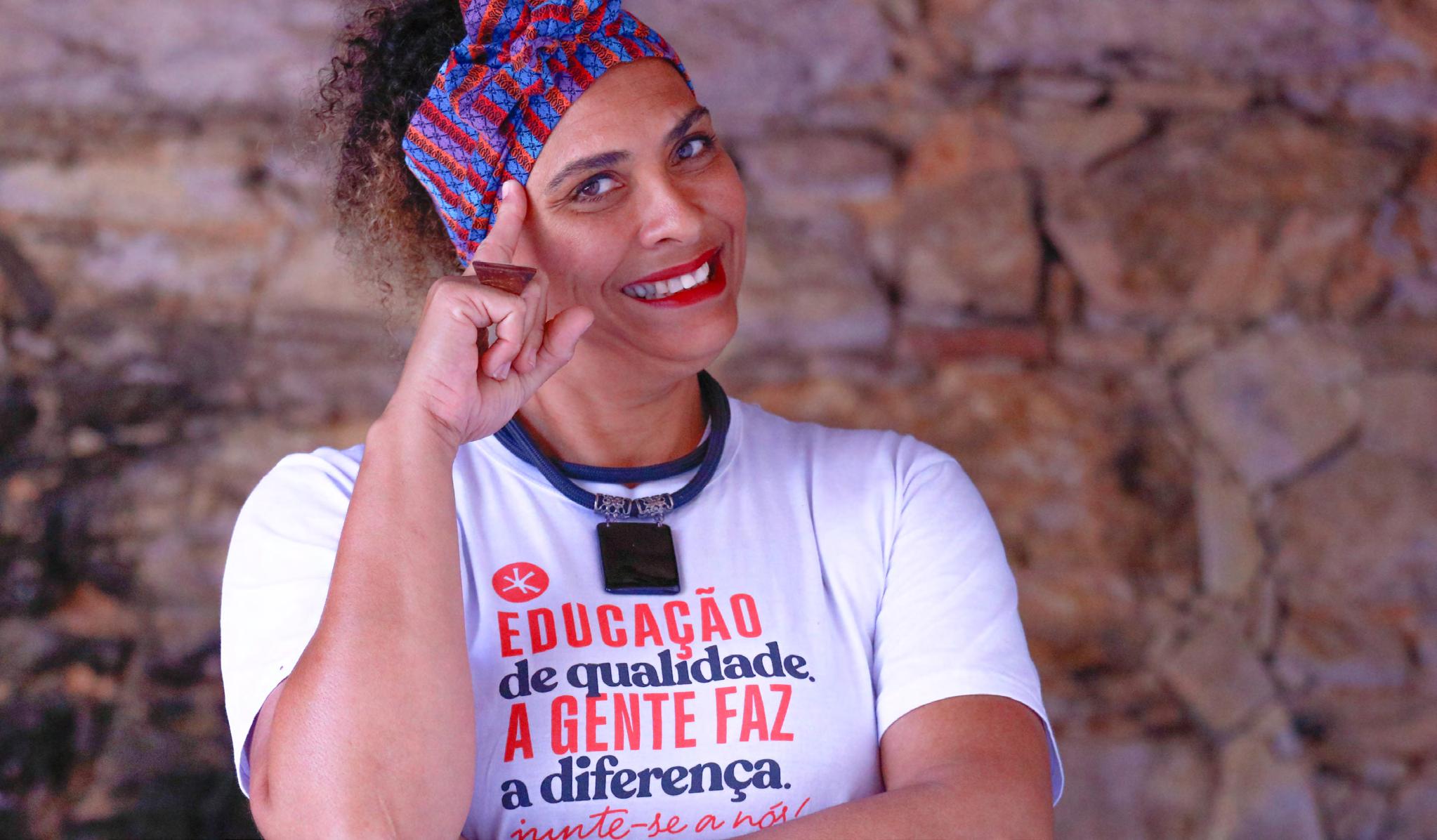
4.1.1 – Workforce engagement
Engagement with our internal audience occurs primarily through workplace relationships between managers and teams, but also via digital interaction on internal communication channels such as the intranet, social network, online communities, message/news dissemination, and both in-person and virtual events. These channels cover a broad range of topics relevant to the workforce, including company strategies, policies, initiatives, guidelines, results, operational highlights, and people management practices. We monitor the main internal communication channels, observing access data, audience reach, and employee feedback.
In 2024, the Portal Petrobras (our intranet channel) received over 92 million visits, with 3.6 million visits to the news section. Another highlight is Workplace Petrobras, our internal social network focused on communication and relationships. In it, communication is made possible through personal profiles, an institutional profile and thematic groups.
In 2024, we reached nearly 86,000 active users, who created approximately 95,000 posts and interacted over 2 million times, counting comments and reactions/likes.
Throughout 2024, we also implemented various corporate actions based on input from the engagement survey conducted the previous year, which had over 17,000 respondents. The survey focused on participants’ perceptions of the work environment and relationships with leadership, teams, and the company. The resulting diagnosis was fundamental for developing improvement actions across different company units and supported corporate initiatives. Key actions arising from this include the revision of Petrobras values, definition of the leadership profile, revision of competencies, implementation of the Well-Being Program (Programa Bem-Estar), revision of the service recognition process (homenagem por tempo de serviço), and implementation of the Petrobras Program against Sexual and Workplace Violence (PPCVST)
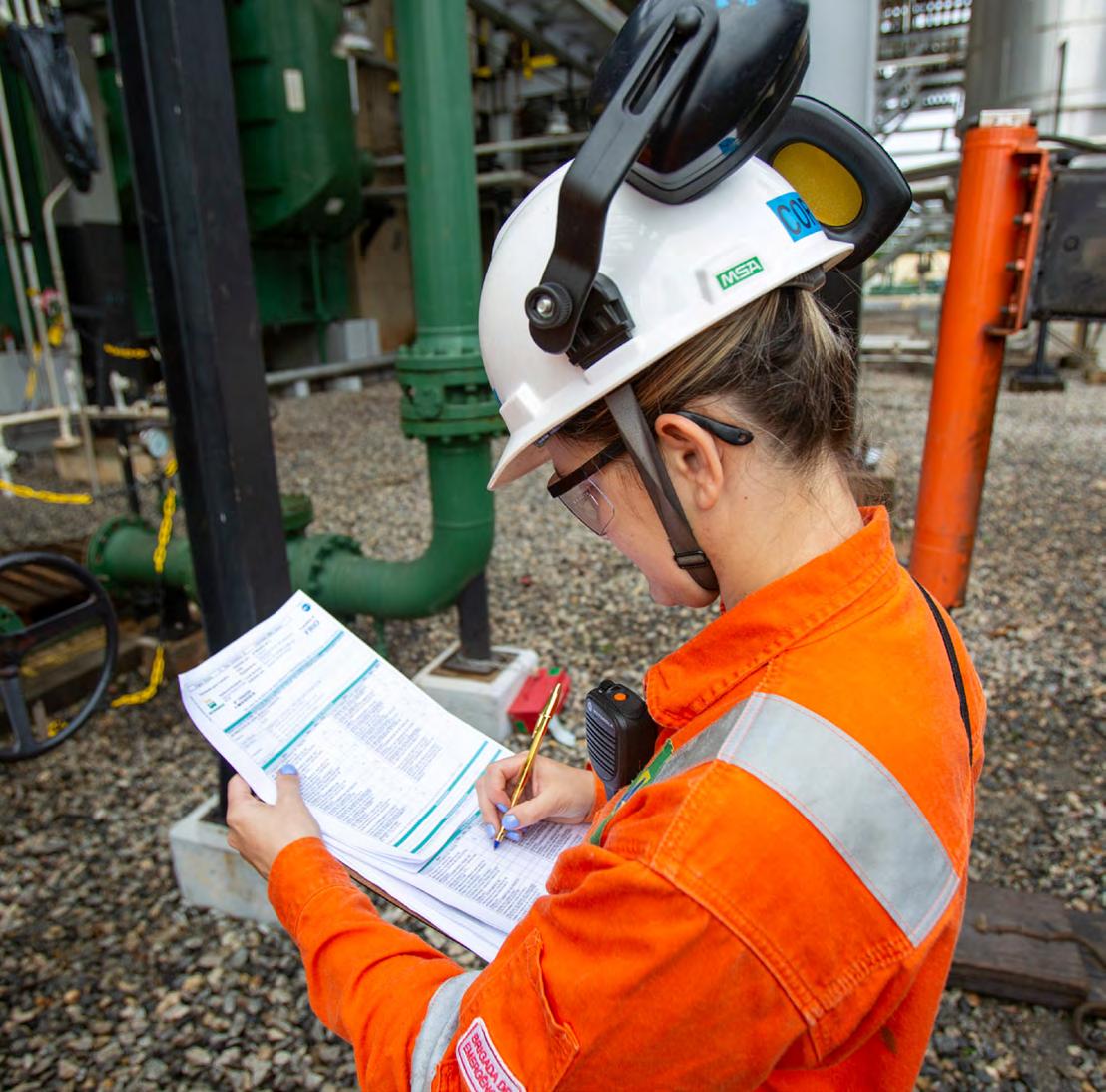

Personnel management within the company is crucial for executing our short- and medium-term strategies, as well as for paving the way towards 2050, the horizon of our Strategic Plan. Operating with integrity, safety, and innovation, sustainably and with total focus on people, is one of our pillars for value generation. Attracting, developing, and engaging people is therefore fundamental, promoting a diverse, inclusive culture focused on excellence and safety. Notably, for the PN 2025-29, our Human Resources area will develop its projects based on four major drivers: promoting a valuesbased culture; preparing leaders and employees for new technologies; workforce management focused on knowledge management and critical skills development; and encouraging innovation.
In terms of diversity, we encompass inclusion and equity, fostering an environment favorable to the expression and recognition of all people’s identities and to consolidating relationships based on respect and trust. Management is carried out through the principles of respect for differences, equal opportunities and non-discrimination.
We seek to advance diversity and inclusion actions, especially with regard to people with disabilities, racial and gender issues and LGBTQIA+ people. In this sense, we achieved important milestones in promoting diversity, equity and inclusion in 2024:
Data-driven diversity management is fundamental to ensure decisions are based on accurate and up-todate information. allows identifying areas needing improvement, monitoring the progress of DEI initiatives, ensuring implemented policies truly foster an inclusive and equitable environment, measuring the impact of actions, and adjusting strategies as needed for optimal results. In this regard, we implemented a guideline on the use and handling of diversity data, ensuring all information is managed ethically and securely.
We established this committee to act as a proactive technical forum on accessibility and inclusion. Its role includes reviewing the entire journey of employees with disabilities and neurodivergence to make it more accessible and inclusive, as well as promoting discussions, proposing actions, and guiding and monitoring accessibility and inclusion initiatives at the strategic, tactical, and operational levels. We also updated the guidelines for the Approach Program for People with Disabilities and/or Neurodivergence, which aims to foster inclusive management through educational actions targeting leadership and focusing on working conditions and relationships.
Understanding the importance of affinity groups, we formalized groups for women, Black people, people with disabilities, neurodivergent people, and LGBTQIA+ people. These groups connect individuals with similar identity characteristics or shared experiences, aiming to foster unity, identification, and mutual support, while potentially advancing the corporate diversity, equity, and inclusion agenda.
To advance actions seeking to increase the inclusion of under-represented groups, we work to promote greater hiring of individuals with diverse profiles into our company through the public selection process. This journey begins with attracting people to the selection processes, which are public and via tests. With the aim of positioning the company among the most desired companies to work for, we began to structure the management of our employer brand. Focusing on underrepresented groups, we have emphasized valuing diverse people in communication pieces and content in outreach actions with students. One of the focuses is representation, through the choice of people from underrepresented groups, to speak, print pieces and bring their stories to the external public. These efforts have yielded robust results, demonstrated by increased applications from groups such as women, Black and Brown people, and people with disabilities.
The results are also achieved through affirmative actions in favor of Diversity.
Between 2021 and 2024, we increased the number of vacancies reserved in public selection processes for people with disabilities (PWD) to 8%, above that stipulated by law (5%), with the aim of attracting this public to our workforce. In the last public notice released by the company in December 2023, we opted for an even more affirmative public selection process, reserving 20% of total positions and incorporating more inclusive language throughout the announcement text.
It should also be noted that, by legal definition, 20% of positions are reserved for Black individuals who apply under this specific category and self-declare as Black or Brown.
Between August 2022 and December 2024 (a period of 29 months), more than 4,770 people were hired, including 240 People with Disabilities (PwD). Throughout 2024, we held four onboarding sessions, welcoming over one thousand new higher-level employees and almost one thousand technical-level employees. In this onboarding process, new colleagues are introduced to the organizational culture and participate in presentations on fundamental company topics, such as our values, strategy, health, safety, and environment (HSE), along with an overview of our businesses. Focusing on diversity and inclusion during this initial phase is crucial.
The success of this format is evidenced in satisfaction surveys from the 2024 onboarding events, which showed a satisfaction rate above 90%.
To ensure the inclusion of employees with disabilities in the reception and orientation events, we created a task force aiming to guarantee genuine inclusion right from the beginning of their journey with the company. Even before these people signed a contract, the accessibility needs of future employees were previously identified and resources – both human, technological and structural – were mobilized so that these people’s experience and journey were the best possible from the beginning. We provide wheelchairs for people with low mobility, Brazilian Sign Language (Libras) interpreters, companions to assist with motor difficulties, audio descriptions at all events and lectures, and sensory models/mockups for blind employees to have an experience closer to that of people without disabilities.
Launched in 2021, the Corporate Women’s Mentorship Program aims to expand the qualification and appointment of women to leadership roles within the company. The 3rd Cycle of the program, launched in August 2023, reserved 20% of its spots for Black and Brown women and 10% for women with disabilities, maintaining the same percentages as in 2022. The program includes development actions targeted not only at mentees but also at mentors, using formats such as lectures, workshops, and conversation circles that enhance knowledge about diversity and, especially, female leadership. Additionally, we provide the “Mentor Training” program, which covers concepts and practices for effectively conducting mentoring conversations.
57.1% of mentees moved into new roles in the 2021 cycle. In the 2nd cycle, the advancement rate is currently 50.0%, and for the 2023 cycle, this percentage was 36.0%, considering leadership and consulting group positions.
We also conducted a study, broken down by directorate,
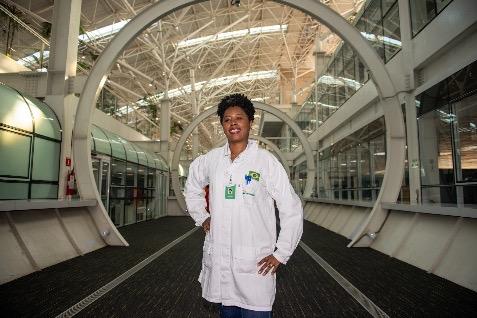
In November 2023, Petrobras’ Racial Equity Program was launched. The Program establishes initiatives that seek to strengthen an organizational culture associated with the values of racial equity, influence the supply chain for the topic and strengthen the health and well-being of black workers at Petrobras, incorporating racial equity commitments into the company’s Strategic Plan. The program’s main goal is to achieve 25% Black representation in leadership positions by 2029.
Within this scope, we launched the “Negritudes da Petrobras” Mentorship Program for Black employees in July 2024. The program will run until September 2025 and includes mentoring meetings as well as participant completion of actions outlined in a specifically designed development path. This path features workshops, labs, coaching sessions, development of management and leadership competencies, along with lectures and meetings where racial themes are discussed.
Demand for this initiative was remarkably high: there were 789 applications for the 40 available spots, the highest number to date for mentorship selection targeting under-represented groups. Of the total spots, 20 were allocated to individuals in non-managerial roles, and 20 were designated for supervisors, coordinators, and sector managers. Additionally, 10% of total spots were reserved for people with disabilities (PwD). It is important to note that all mentors in this program are Black.
We also promoted training sessions with specialists on the theme specifically for leaders, which addressed the importance of the racial issue in work relations and leadership’s role in promoting racial equity.
Throughout 2024, we also conducted the first stage of racial equity training for health professionals. This initiative aims to train the company’s health corps on the Brazilian racial context. The second stage of training is scheduled for March 2025.
The “A Dream Platform for Everyone” Program was developed from the meetings of the Diversity Committee of the Ultra Deep Water Executive Management (AGUP). In 2022, we identified the need to actively listen to women working offshore, given their small numbers in that environment. Following research, extensive material was collected and discussed in the program’s first workshop, held in May 2023. During this event, research results were debated, and various actions were proposed to address the difficulties faced by women onboard.
The project was structured into five pillars:
• Diversity management
• Learning
• Inclusive communication
• Inclusive infrastructure
• Diversity in contracts.
In 2024, the second workshop was organized, aiming to gather other Petrobras partner companies on the theme of diversity and to expand the program’s scope to include other diversity dimensions, such as race, disability, and LGBTQIA+. The goal of PSTP is to create a diverse and inclusive offshore environment for platform projects starting from the conceptualization phase. The program operates in areas such as training and development; recruitment and retention; culture and work environment; and community support and engagement, among others.
Regarding DEI in the offshore environment, we established targets for the number of women onboard and female leaders for the “Platforms of Dreams,” while continuing this year to qualitatively monitor themes related to race, sexual diversity, and accessibility. Furthermore, we set 2028—the date of first oil from the first Dream Platform for Everyone —as the target year for the cultural transformation to be effectively experienced onboard, permeated by education and awareness actions.
On August 6-7, 2024, the 7th Petrobras Diversity Forum was held, with the central theme “Diversity, equity and inclusion as a strength.” The objective was to reinforce the focus on themes related to DEI, considering its various dimensions and social markers.
We debated the importance of inclusive leadership, networking and allies, the relevance of establishing diversity targets, and the need to consider intersectionality from the perspective of building bridges, multiplying voices, and connecting differences. During the event, seven good diversity practices implemented by different company areas were also recognized.
The Petrobras Young Apprentice Program (PPJA) has the mission of promoting the social inclusion of young people through professional training, creating opportunities for a promising future. In the 2022-2024 cycle, more than 600 young people completed the program, representing different regions of Brazil – from north to south, in 25 municipalities in 14 states, in addition to the Federal District. During this period, 34 professional training courses were offered, expanding horizons and boosting careers.
Furthermore, in September, we started a new cycle of the program (2024-2026), with a record number of participants: more than a thousand young people joined, beginning a new stage of development and social transformation.
The PPJA is carried out in partnership with the Ministry of Labor and Employment, ensuring that inclusion quotas are met. Also, we reserve 10% of the vacancies for people with disabilities and another 10% for adolescents in protective measures (institutional or family), in addition to 15% for those leaving child labor, reinforcing the commitment to social transformation.
In the 2024-2026 cycle, we created an exclusive class for teenagers undergoing socio-educational measures in the city of Ipojuca (PE), with young people appointed by the Secretariat for Children and Youth of Pernambuco. This initiative reinforces the role of PPJA as an agent of change in the lives of thousands of young Brazilians.
We welcomed a new class of interns with a special onboarding featuring extensive knowledge exchange. The group will have access to development paths, mentorship, and experience in dozens of projects across diverse areas such as Finance, Procurement, Refining, Exploration & Production, and Gas & Energy, among others.
We inaugurated physical spaces in our properties for in-person assistance. These spaces were carefully designed to be inclusive, providing an environment where people feel comfortable and have their requests met in a welcoming and humane manner, putting into practice our value of care for people.
As part of an ongoing commitment to promoting DEI, in 2024 we launched a corporate standard to promote diversity, equity, and inclusion in Managerial and Specialist Recruitment and Selection processes.
Faced with the under-representation of certain identity groups within the company— such as women, Black people, Indigenous people, people with disabilities (PwD), and LGBTQIA+ people—this standard seeks to strengthen the inclusive culture in these selection processes through affirmative actions. This initiative stems from the Strategic Plan (PE), which includes targets related to increasing female and Black representation in the company’s leadership positions and guides us to promote nondiscrimination and equal opportunities, including through affirmative actions for under-represented groups.
In 2024, we identified 26.48% of processes with affirmative actions among the 253 management and specialist recruitment and selection processes carried out in the company.
In 2024, Transpetro established internal processes to promote a more diverse, equitable, and inclusive environment. To this end, its recruitment and selection processes now mandate that the pool of candidates selected for the interview stage must represent the diverse composition of Transpetro’s workforce. Currently, 45% of those selected in these processes are women, and 45% are Black individuals.
To advance women’s careers, the company expanded its women’s mentorship program, which currently includes 25 mentees. n the selection for this program, 20% of spots were reserved for Black women, and ultimately, 51% of the women selected were Black or Indigenous. Among the program participants, four have already been approved in internal selection processes. Focusing on inclusion, breastfeeding rooms were also implemented at operational terminals.
The focus on DEI also permeated the orientation of about 400 new employees, which featured panels on diversity and inclusion, as well as accessibility resources.
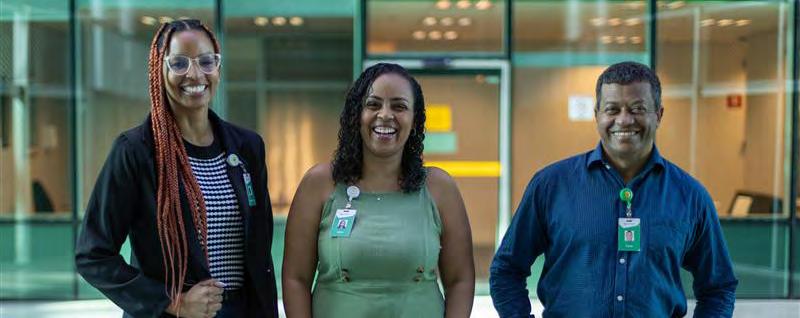
On our engagement front, the company had more than 40 actions during the year, with an impact on the entire workforce, such as “Black Awareness Week”, “Transpetro Dialogues” and workshops at its units. The company also extended human rights training to the entire workforce, with the provision of two courses in the Human Rights training itinerary: Basic Human Rights Training Course and Course on Combating Violence Against Women. The first course was taken by all of its own employees (around 5,000 people), and the company also aims to train its almost 11,000 service providers on land and at sea, a process that is currently underway.
Through the Program to Combat Violence, Transpetro strengthened the promotion of diversity and the fight against all forms of discrimination in the workplace, with numerous educational actions at the company’s headquarters and in all operational units. The course on Combating Violence Against Women has already been taken by 73% of its own employees and 32% of service providers.
Also in 2024, the company carried out around 120 awareness-raising actions for leaders and employees, including lectures, DSMS, discussion groups on human rights and related topics, organized by the Social Responsibility Management, Diversity and Inclusion Management, affinity groups and CIPAs.
Transpetro guides its relationship with the communities that live around its facilities based on respect and promotion of human rights. The company’s work in this area received an award in recognition of its actions at the 2024 Rio Oil and Gas.
Our subsidiary Petrobras Biocombustível (PBio) also develops programs to promote diversity, equity and inclusion. In 2024, the subsidiary maintained the affirmative internship program for high school and college students, in which 60% of the vacancies were reserved for women, 30% for Black and Brown individuals, and 10% for people with disabilities. Furthermore, over the last three years, 11 young people have participated in the company’s Young Apprentice Program, the majority of whom are Black and Brown youths, spread across Bahia, Minas Gerais and Rio de Janeiro.
In 2024, PBio institutionalized the Diversity, Equity and Inclusion Committee, with the aim of raising awareness and multiplying diversity issues within the company. Among the actions developed, the following stand out: the Female Mentoring Program, the celebration of diversity anniversaries and campaigns to collect items for donation to institutions that support women in vulnerable situations.
Furthermore, the subsidiary carried out its first diversity census, achieving an impressive result of over 75% of respondents, which provided materiality for the preparation of a multidisciplinary strategic plan focusing on education, communication, representation in leadership positions and in the composition of teams, in addition to valuing diversity in recognition and reward processes.
In addition to internal actions, in September 2024, Petrobras and more than 30 other federal state-owned enterprises (SOEs), in an initiative coordinated by the Ministry of Management and Innovation in Public Services in partnership with four other ministries, signed the Pact for Diversity, Equity, and Inclusion in Federal StateOwned Enterprises.
Through the pact, a space for exchanging experiences between the companies will be promoted for sharing best practices and carrying out joint actions, potentially optimizing costs and increasing the visibility of the topic in society and the business environment. As a result, the initiative is expected to develop more effective and agile ways to identify problems and implement solutions and strategies to foster diversity, equity, and inclusion within public companies.
in Public Services; the Ministry of Human Rights and Citizenship; the Ministry of Women; the Ministry of Racial Equality; and the Ministry of Indigenous Peoples supported the pact’s actions, especially the dissemination of best practices from participating institutions, with a view to promoting the voluntary, educational, and guiding initiatives that are the objectives of the Pact. A work plan is underway with the actions that will be implemented.
Our employees work under standard administrative schedules as well as various special arrangements, such as shift work and on-call duty, among others. The expected weekly workload varies according to the regime in which the employee is engaged. Employees in administrative regimes have a weekly workload of up to 40 hours and employees in special regimes have an average weekly workload of 33 hours and 36 minutes. Hours resulting from overtime work can be accumulated in
Our employees are hired through a public selection process, with a minimum age requirement of 18 years old to participate in the selection process. However, it is important to highlight that there are minors who work at the company under the Petrobras Young Apprentice Program (PPJA), which is a federal government program that aims to introduce young people from low-income families into the job market. Program participants work within the parameters established in the legal system, within school units or in administrative areas, without exposure to products that may cause any harm or hazard.

Our Health, Safety and Environment (HSE) management system includes measures aimed at promoting, preventing and preserving comprehensive health, aiming at the well-being of our workers and corporate sustainability. Among the premises for its execution are the current legislation and resolutions of regulatory bodies, such as the regulatory standards of the Ministry of Labor and Employment, the legislation of the Ministry of Health, the resolutions of the councils of health professionals, the General Data Protection Law, social security legislation and the resolutions of the National Agency of Petroleum, Natural Gas and Biofuels (ANP), among others. Our Collective Bargaining Agreement contains more than 20 clauses related to health and safety, expanding the company’s activities beyond what is required by law.
Currently, all our employees are covered by the HSE management system. Service providers also make full use of this system when they are on the company’s premises and participate in the Internal Audit Process for Health, Safety and Environment Management (PAG-SMS).
Aiming at the continuous improvement of our HSE management system, programs and initiatives are developed, such as the Commitment to Life Program, the Golden Rules and the Fundamentals of Process Safety.
Launched in 2016, the Commitment to Life Program is made up of structuring projects defined based on a critical analysis of HSE management. Since the launch of the Commitment to Life Program, we have had a significant reduction in the Recordable Injury Frequency Rate (TAR), from 2.15 to 0.67. We are working to have a high-performance culture, which demands health, respect for the environment and safety.
Based on best market practices, the Commitment to Life Program seeks to achieve the ambitions of zero fatalities and zero leaks and to strengthen our vision of being a reference in safety, environment and health in the industry. The program’s progress is periodically monitored at several organizational levels, culminating in an evaluation by the Executive Board and the Board of Directors’ HSE Committee.
Despite our efforts to continuously improve safety management and culture, we recorded and regret the occurrence of four fatalities in 2024.5. In all fatal accidents, our first action was the personal support of the leaders to the families of the victims. The occurrences were immediately reported to the Officers, the CEO of Petrobras and the Chairman of the Board of Directors, in addition to the Executive Manager of the area where the event occurred, starting the analysis of the scope of the accident and the implementation of emergency actions to block possible occurrences of the same nature. We have conducted the investigation and analysis process, under the coordination of executive managers and a multidisciplinary team, to identify the causes of accidents. We have consolidated and publicized actions to prevent the recurrence of these accidents. Lessons learned are discussed in forums with managers and disseminated to employees.
We care for workers’ health from the very first step of their journey with the company, through the promotion, prevention, and preservation of physical, mental, and social well-being. To this end, our administrative and operational facilities are equipped with dedicated multiprofessional health resources and teams focused on occupational health, urgent and emergency care, health surveillance, and health promotion.
5 Fatal events information is related to the Petrobras system.
In 2024, we maintained our commitment to comprehensive worker health care by expanding the annual health assessment. In addition to the mandatory occupational examination, all employees had access to a comprehensive assessment involving a doctor, nutritionist, and dentist, highlighting our focus on well-being and health promotion.
We encourage participation by offering personalized support during and at the workplace. We recorded a high level of satisfaction (over 92%) among employees who opted for non-mandatory assessments. This approach allows for the definition of comprehensive care pathways, addressing healthy eating, physical activity, mental health, dental prevention, pregnancy and lactation care, chronic disease prevention and control, in addition to focusing on fitness for work and occupational risks.
Through Health Surveillance, we work to identify, monitor, and evaluate health risk scenarios. In 2024, we highlight the continued quarterly issuance of epidemiological bulletins and the publication of 15 specific epidemiological scenarios to monitor outbreaks and epidemics. This information is essential for guiding measures in public health situations and planning disease prevention and health promotion actions. Among the monitored cases involving workers in Brazil and abroad were avian flu, mpox, influenza, and arboviruses.
We conduct epidemiological analyses of the employee population and monitor the external epidemiological scenario. These inputs guide our strategic drivers, allowing for the prioritization of health actions. In 2024, we maintained strategic actions focused on mental health promotion and encouraging an active lifestyle, initiatives that were reaffirmed in the PN 2025-2029.
Petrobras, Ambassador of the Mind in Focus Movement (UN Global Compact – Rede Brasil)
. Continuing the actions initiated in 2023 when we joined the Mind in Focus Movement, in 2024 we took on a prominent role by becoming an ambassador company for the movement. In this capacity, we committed to taking the lead and influencing other companies to strengthen this movement for mental health and develop healthy environments within Brazilian organizations.
Mind in Focus Movement aims to promote mental health in the organizational environment by creating a safe space for conversations, awarenessraising, and practical actions that reduce the stigma surrounding mental disorders.
In this context, we advanced in implementing measures to promote mental health in the workplace, aiming to help curb the trend of increasing mental disorder cases observed in Brazil and worldwide, and to drive positive and sustainable changes for the well-being of our employees.
We were recognized at the 2024 Mind in Focus Awards by the UN Global Compact – Brazil Network, receiving first place in the category “Carry out engagement and training actions for managers to act regarding the mental health theme.” This recognition highlighted the relevance of the actions carried out by the company throughout 2023, when we committed to training 100% of our leadership on Mental Health. This objective was fully achieved, with over 6,500 leaders trained, indirectly benefiting over 190,000 members of the workforce. In 2024, continuing our mental health training efforts, events were held for senior leadership, including the presidency and Executive Board members, alongside ongoing training for all other leadership levels on this topic. Additionally, we reaffirmed in our Business Plan 20252029 (PN 2025-29) the commitment to implement 100% of the Mind in Focus Movement’s Commitments by 2030.
Our Mental Health Program encompasses actions structured across five levels of care: culture and promotion, protection, surveillance, support, and readiness/response. The program includes stratification of the target audience based on health criticality criteria and provides biopsychosocial support.
Continuous and systematic monitoring of employees is carried out, focusing on identifying needs for work adaptation and reorganization to contribute to health restoration. Support is available to all employees, who also have 24/7 access to the Psychological Support Hotline.
Our subsidiary Transpetro also joined the UN Global Compact’s Mind in Focus Movement in June 2024. At the end of the year, the 2nd Transpetro Mental Health Journey was held. The subsidiary also implemented a new psychology teleconsultation service for its entire workforce, designed to support victims of violence and serve as a channel for the Mental Health Program.
Recognizing the importance of structured, comprehensive, and integrated initiatives for building and maintaining healthy work environments, we established the Petrobras Well-Being Program (PPBEM). Anchored in the conceptual model of the World Health Organization (WHO), the PPBEM was implemented in 2024, resulting from collective development involving various company areas and listening focus groups with worker participation.
The program defined strategic guidelines that contribute to a healthy, psychologically safe, productive, sustainable, and engaging work environment at Petrobras, strengthening our care for people. The objective is the effective and comprehensive promotion of mental health at work, aiming to positively impact organizational wellbeing within the company.
It is based on diagnostics and technical foundations that effectively guide the actions and initiatives to be implemented. The program involves integrated action at all levels of the organization in planning and executing well-being initiatives. Active participation from workers and the involvement of trained professionals are essential, as is the commitment and proactive engagement of leadership. To this end, its governance structure consists of well-being committees in each directorate, composed of representatives from all executive management units. The PPBEM Operational Committee brings together committee leaders and a network of approximately 200 well-being agents who represent the different areas of the company, ensuring the effectiveness of the proposed actions. At the end of 2024, listening sessions were held involving the well-being agents, CIPA members (Internal Commission for Accident Prevention), and labor unions, aiming to gather input and contributions from workers for the program’s strategic planning for 2025.
In recognition of the company’s efforts to implement PPBEM, we were finalists in the Global Healthy Workplace Awards in 2024, an international award that recognizes companies committed to promoting healthy work environments, based on the conceptual model of the World Health Organization (WHO).
In 2024, we will intensify initiatives to encourage the practice of physical activities through the Ativa Petrobras project, focusing on adapting and improving the physical, social and organizational environments. We trained healthcare professionals to assist employees and developed an engagement plan to promote an active lifestyle. The Petrobras Running and Walking Circuit brought together around 14,000 people in fourteen stages, while the Health Game, which addresses healthy eating, mental health and physical activity, attracted approximately 10 thousandparticipants in five editions.
By 2024, we will reach 39,46% of physically active employees, based on the International Physical Activity Questionnaire (IPAQ). For PN 2025-29, we will remain focused on positively impacting the adoption of healthy habits through the commitment to implement 100% of the strategic objectives of the WHO Global Physical Activity Action Plan in the business context by 2030. The new strategy prioritizes structural changes recognizing that an adequate environment is essential to reduce barriers and support the practice of physical activities.
In addition to the initiatives prioritized in PN 2025-29, we offer continuous health actions that contribute to the adoption of healthy attitudes and behaviors. Our health promotion programs include individual, collective and environmental actions, as described below:
• Healthy Eating Program: Its aim is to promote healthy eating habits, crucial in protecting against chronic non-communicable diseases (NCDs). The program encourages changes in eating habits and seeks to comply with the legislation of the Worker Food Program (PAT). The actions include periodic nutritional assessments for all employees, agroecological product fairs and the provision of healthy and safe food at the units.”
• Chronic Non-Communicable Diseases (NCD) Prevention and Control Program: With the aim of promoting comprehensive care for workers, our program adopts an intersectoral approach and relies on the work of a multidisciplinary team. In 2024, we advanced the development of a methodology for a care prioritization matrix which, through data analysis, will allow automated identification of employee health risk levels. This health risk assessment will enable a more targeted preventive approach and worker-centered care management through established care pathways.
• Pregnancy and Lactation Care Program: The program offers comprehensive health care, suitable working conditions, and support for maintaining work potential, aligning with legal aspects, internal norms, and rights related to maternity and paternity. It provides care from the gestational period until the return to work and promotes responsible paternity. In 2024, we highlight the holding of courses on pregnancy and parenthood, conversation circles, and the provision of a booklet for working mothers. We currently have breastfeeding support rooms in 26 properties.
• Blood donation campaigns: We encourage blood donation through educational actions and blood donation campaigns held at company facilities in partnership with local blood banks. In 2024, campaigns were held at 7 properties, totaling 535 collected blood units and the registration of 18 people for bone marrow donation.
The health and well-being initiatives implemented by Petrobras are inclusive, with several extending beyond direct employees to encompass the entire workforce. Notable examples [of inclusive health and well-being initiatives] include the Petrobras Running and Walking Circuit, offering discounts at sports events, health games, access to healthy and safe food, agroecological product fairs, and the provision of breastfeeding support rooms. Additionally, the company promotes educational health actions such as lectures, live streams, thematic campaigns, and the health week. Similarly, the Support Channel is available to the entire workforce, ensuring that contractors, interns, and young apprentices also have access to emotional support and active listening. Furthermore, the Gympass/Wellhub benefit is extended to interns, young apprentices, and their dependents.
To ensure the safety and health of everyone, we have emergency response plans at all our facilities. Our actions are based on rigorous operational procedures, advanced technological resources, adequate materials, and a team of highly qualified professionals. These plans are guided by previously mapped scenarios and tested through simulated exercises, ensuring an efficient and safe response in urgent and emergency situations.
Urgent and emergency health care is guaranteed for the entire workforce, 24 hours a day, 7 days a week, at all our units, in addition to support for workers and their families, covering follow-up on social and health issues. Petrobras maintains health readiness teams at various onshore and offshore facilities, along with seven aeromedical evacuation bases that serve multiple units and vessels.
We have 40 units with telemedicine capabilities and carried out 110 training sessions for professionals to ensure the effectiveness of this service. In 2024, we carried out more than 100,000 urgent and emergency services, both for offshore and onshore workers, in addition to social service and psychology services. To ensure teams are prepared for emergency scenarios, we conducted more than 450 simulations throughout 2024.
In 2024, we completed the deployment of telemedicine/ telehealth equipment across all of Petrobras’s own offshore units and expanded it to onshore operational facilities, enhancing healthcare delivery and diagnostic reliability. It is worth highlighting the pioneering implementation of teleodontology in offshore care, validated with key support from the Regional Dentistry Council of Rio de Janeiro (CRO-RJ), representing and aligned with the Federal Dentistry Council (CFO). By associating specialized assessment with technology, a direct impact on the second leading cause of offshore medical evacuations is evident, achieved through higher quality of care, increased safety, and a reduced volume of disembarkations for dental reasons.
We also advanced the “Support for Decision-Making in Offshore Units” project, initiated as a pilot in 2023 and enhanced in 2024. The purpose of this project was to develop products enabling monitoring (including real-time), analysis, and recommendations for specific, effective actions for preventing and controlling adverse health events.Our subsidiary Transpetro has 17 occupational health centers spread across Brazil assisting onshore and offshore employees, meeting occupational requirements, promoting health, and handling urgent and emergency situations. At the Integrated Health Nucleus, located at Transpetro’s headquarters, remote coordination is provided for urgent/emergency situations involving onshore units and ships, whether in national or international territory, including prompt recommendation and/or activation of external resources.
Actions under Transpetro’s Onboard Dental Health Program were also intensified: eight company ships were included, and 150 crew members received dental evaluations and guidance.
Understanding that individual and family healthcare assistance is fundamental for maintaining employees’ comprehensive health and peace of mind at work, we offer a supplementary health plan with differentiating features that reflect the special value the company places on this aspect. This benefit functions as a strategic tool, supporting individual engagement in self-care and addressing priority needs diagnosed during occupational examinations.
The Multidisciplinary Health Care Plan (AMS) is a health care benefit offered by the company, which operates in the dimensions of health promotion, prevention and recovery.
The benefit is available to active employees, retirees, pensioners and their respective family groups. The plan’s care segmentation covers outpatient, inpatient, obstetric and dental health care services, with an area of national coverage and performance and individual type of inpatient accommodation.
The AMS Plan also offers coverage for complementary programs, such as the Care Program (Programa Cuidar), Pharmacy Benefit, the Retired Employee Health Assessment Program (PASA), the Special Assistance Program (PAE), and the Home Care Program (PAD) The Pharmacy Benefit Program is primarily intended for individuals undergoing treatment for chronic diseases prioritized by the World Health Organization (WHO) and Brazil’s Ministry of Health, as well as psychiatric and neurological diseases.
In 2024, the Care Program (Programa Cuidar) expanded its initiatives by launching a care coordination line focused on primary care. This aims to promote preventive health, providing a better quality of life for all beneficiaries through the definition of continuous personalized care plans and monitoring by a multidisciplinary health team.
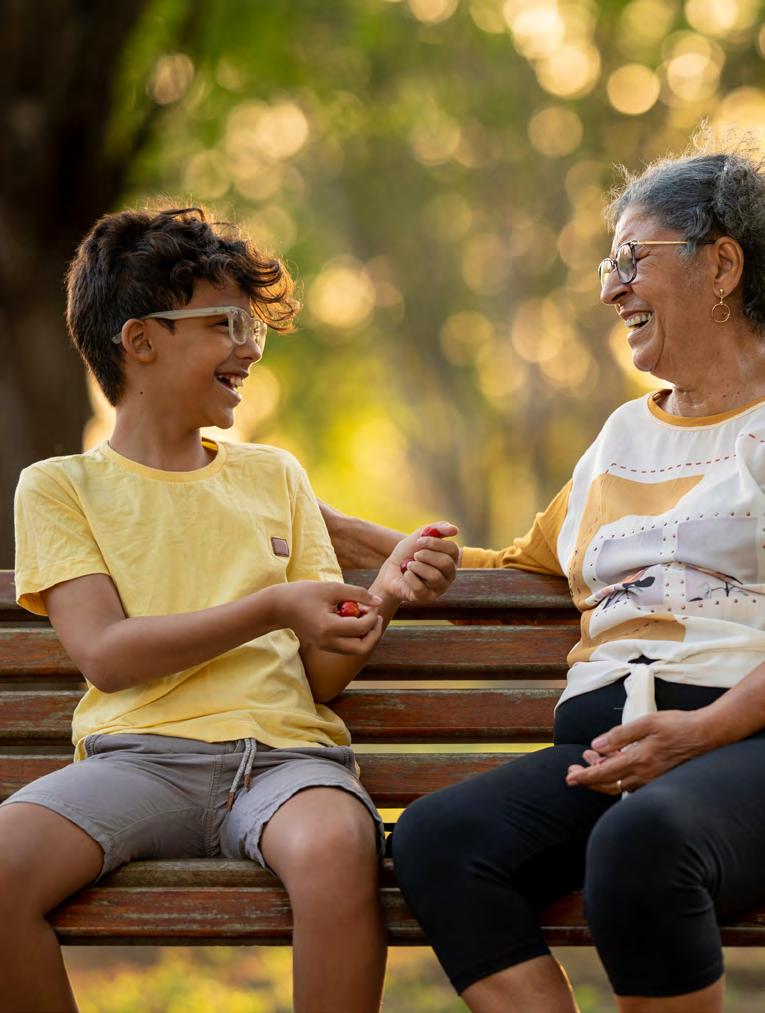
At Petrobras, the parent company, compensation is defined based on the compensation policy approved by the Board of Directors and represents an instrument for attracting, engaging and retaining talent, being competitive with the market in which we operate and aligned with our high-performance culture. As a result, we remunerate our employees fairly, with a package that involves fixed, variable compensation and benefits that has proven to be competitive in relation to companies of similar size and operating in the same market.
Salary practices are discussed annually during collective bargaining processes with the unions, or whenever a specific need for review is identified. Salary amounts are paid monthly and without any distinction, be it gender, race, ethnicity or any other.
We have a conceptual model for variable compensation, consisting of the Performance Award (PRD) and Profit and Results Sharing (PLR) programs, both applicable to employees regardless of whether they hold bonus-eligible positions. The PRD was implemented in 2023 to replace the former Performance Bonus Program (PPP), which is now only in force for members of the Executive Board. These programs were formatted in light of the company’s new strategic guidelines, with a close eye on people and our remuneration policy. Unlike what has been practiced in recent years, this program is intended to complement the PLR, which becomes our main variable compensation practice. With the PRD, the company intends to reinforce the recognition of the effort and individual performance of each employee to achieve Petrobras’ results.
The PLR (Profit and Results Sharing) is governed by a Collective Bargaining Agreement (CBA), resulting from negotiations between the company and employee representative unions, with the proposed CBA being submitted for employee approval in a deliberative assembly. In order for the PLR payment to occur, the following conditions must be met:
• approval of dividend distribution by the Annual General Shareholder Meeting;
• calculation of the net result for the reference year;
• achievement of an average (weighted) percentage of at least 80% for target indicators established by the Board of Directors in the PLR agreement.
Additionally, as a way of recognizing the contribution of our employees, reflected in the performance management process, we apply the annual professional career progression program, called Increase by Merit, which aims at promoting a culture of meritocracy through recognizing and rewarding employees with improved performance, considering deliveries and behaviors at the different levels of complexity required and levels of compensation.
Our values and remuneration practices are frequently compared to those of other competing companies through market research, conducted by specialized consulting firms that are independent of the company’s management. The research results demonstrate that our compensation is aligned with the remuneration policy approved by the Board of Directors and is competitive when compared to the best practices in the oil and gas market in Brazil.
In addition to direct remuneration, we offer several benefits to employees, such as, for example, meal/food vouchers, education assistance, health plan and supplementary pension. Consequently, the total compensation offered by the company has been highly competitive over the years, contributing to low turnover (3.00% in 2024, reflecting hires plus separations, and 1.06% reflecting separations only) and a large number of applicants in the public selection process (around 161,000 confirmed applications in the 2023.2 process).
Petrobras, the parent company, follows the Constitution, Declarations and Conventions of the International Labor Organization (ILO) ratified by Brazil, which deal with the rights of free association and collective bargaining, in addition to being, since 2003, a signatory to the United Nations Global Compact, whose principle 3 provides for the effective recognition of the right to collective bargaining. This commitment is strengthened by the Human Resources Policy, approved by the Board of Directors (BoD), which mandates the implementation of sustainable agreements developed through dialogue, ethics, and transparency, with the aim of bridging differences in negotiations with employees and their representatives. In turn, the Code of Ethical Conduct guarantees the right to free union association, in line with Brazilian legislation and international regulations. It is also worth mentioning that our Collective Bargaining Agreement contains a chapter dedicated to union relations, where the obligations and rights between Petrobras and unions are stipulated.
In recognition of the legitimacy of unions as representatives of employees and interlocutors in collective bargaining, Petrobras invests in social dialogue, aiming to search for negotiated solutions, through periodic meetings to address topics such as work regime, benefits and monitoring of the Collective Bargaining Agreement (CBA). When necessary, we also provide informative presentations to unions on relevant topics such as strategic planning, maintaining a safe and healthy work environment, diversity, equity and inclusion, among others.
We have CBAs in force with all unions representing employees, with 100% of our own workforce covered by a Collective Bargaining Agreement. As provided for by art. 457 of the Consolidation of Labor Laws (CLT), these agreements include social clauses relating to working conditions, industrial safety, benefits, occupational health, diversity, maintenance of a safe and healthy working environment.
Transpetro, Petrobras
Biocombustível, Termobahia, Termomacaé and TBG, companies in the Petrobras System that have their own employees, also respect the effective right to collective bargaining and the right to freedom of association. The employees of these companies are represented by independent unions, with which periodic meetings are held to discuss issues such as work regime, benefits, remuneration and other issues covered by collective bargaining agreements. In general, Petrobras System companies work together with the parent company in CBA negotiations around a single agenda set by union entities, even if the agreed terms are different, based on the realities, limitations and governance of each company. With regard to coverage, 100% of employees at Transpetro, Petrobras Biocombustível, Termobahia, Termomacaé and TBG are covered by CBAs.
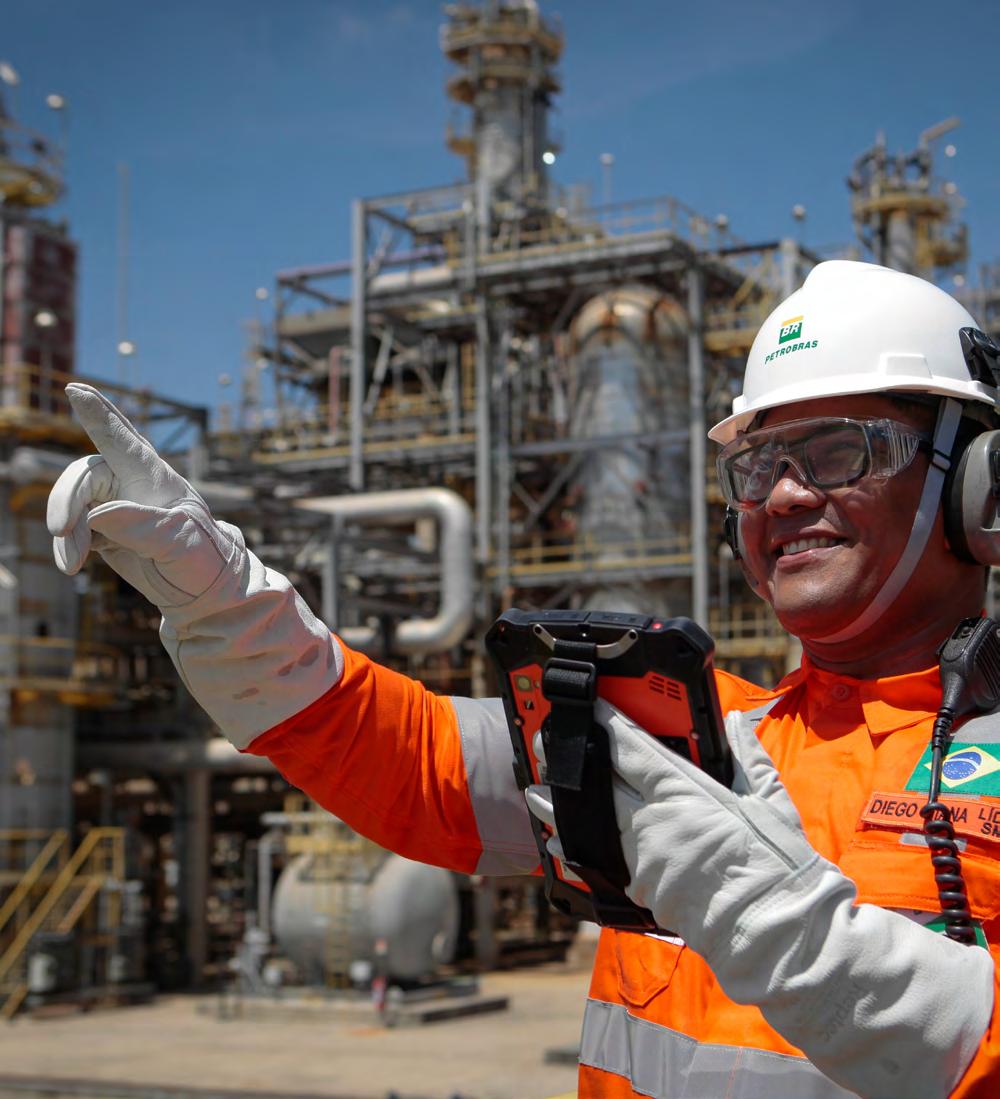
communities —
Engagement with local communities occurs through public hearings and social communication programs, established throughout the environmental licensing processes, and through the community relations process.
As part of the environmental licensing of new projects, the environmental agency requests social participation in a consultative manner with a view to analysis aimed at issuing the license. Social participation takes place through public hearings that we hold with the participation of different bodies and communities inserted in the areas of influence of the undertaking or activity.
In these meetings, based on the disclosure of the environmental study, all sectors of society can express their doubts and, mainly, make proposals to be incorporated into the environmental licensing process, in order to mitigate and compensate for negative impacts and maximize positive ones.
In 2024, we had the following public hearings, informational and public meetings held:
• - Two public meetings held as part of Stage 4 of the Environmental Licensing Process for the Santos Basin (BS) Pre-salt, engaging fishing community stakeholders from Guanabara Bay and Sepetiba Bay.
• * 1st Informative Meeting on Preliminary Licenses (LPs) for the Campos Basin (BC) Cluster and Deepwater BC
• 2nd Informative Meeting - BC Cluster and Deepwater BC LPs
• 3rd Informative Meeting - BC Cluster and Deepwater BC LPs
• 4th Informative Meeting - BC Cluster and Deepwater BC LPs
• Public Hearing - GASLUB Thermoelectric Park Project
NOV. 26 AND 28, 2024
18/11/2024
02/12/2024
04/12/2024
09/12/2024
14/08/2024
At present, we have 158 assets either being installed or already in operation. Of this total, 93% (148 active) had some type of consultation with communities. Among the projects under development, we have 30 projects being implemented, of which 94% (28 projects) had their Environmental Impact Reports, for the purposes of public hearings, made available by the Brazilian Institute of the Environment and Renewable Natural Resources (IBAMA), at state environmental agencies and/or on the Petrobras website, in addition to having been distributed at the locations indicated by the environmental agencies, such as city halls, the Public Prosecutor’s Office and conservation units, depending on the stage of the licensing process.
Throughout the life cycle of the licensed enterprise, society’s participation continues through environmental licensing conditions. Among the conditions, the Environmental Education Programs (PEA) stand out, which are aimed at communities in the area of influence and are based on critical, dialogical and emancipatory training, as well as the Social Communication Programs (PCS), which maintain communication channels (Call Center, 0800 Channel and online information portals) that provide information on operational activities, social and environmental projects developed.
Community relations are developed continuously in communities located within the scope of our operational units and are guided by a corporate standard that establishes a methodology and recommends specific actions, which are included in local social responsibility plans that are periodically reviewed and monitored.
Local social responsibility plans aim to provide responses to community issues in business units, such as the inappropriate use of land pipelines by community members and the inconvenience caused by possible emissions and maintenance shutdowns involving a significant number of workers. The plans are carried out annually and the process also provides for periodic reviews and updates. The actions foreseen in the plans seek to respond to the social risks identified in the socioeconomic diagnosis and increase the level of engagement of communities with us, seeking to maintain a permanent communication line and expand community participation in the planning of actions.
In 2024, 23 local plans were executed at the parent company Petrobras, covering 100% of the refining and E&P units, with the execution of 310 relationship actions. All planned actions are monitored by a management system that tracks the planned and completed percentages.
Our primary forums for dialogue with communities that are or may be impacted by our operations are the community committees, which are present in 21 locations across the country. The calendar with the dates of the meetings held and planned can be consulted on our Transparency Portal ( Transparency Portal | Petrobras | Transparency Portal | Petrobras) . Community committees allow for active and qualified listening to the demands of local communities and include the participation of community leaders, third sector organizations, members of the public authorities, local companies, among other relevant social actors.
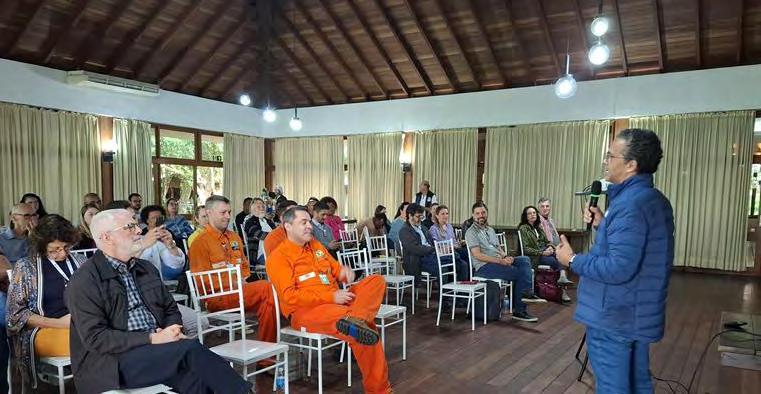
With the aim of raising awareness among communities on human rights issues, we will also hold several presentations on human rights issues throughout 2024 during community committee meetings. The main topics covered were the right to equality and the fight against discrimination and prejudice of any nature and the right to social security and the realization of economic, social and cultural rights.
An innovative practice implemented in 2024 was the establishment of unified community committees in territories impacted by more than one Petrobras Operating Unit. In the state of Rio de Janeiro, for example, we held two meetings in Maricá, two in the municipality of Itaboraí and two related to communities living near Guanabara Bay, with the participation of around 300 people in total. These regions are impacted by the operational activities of the Boaventura Energy Complex, the Duque de Caxias Refinery (Reduc), the Leopoldo Américo Miguez de Mello Research and Development Center (Cenpes), the Búzios Field and the Libra Field, and even our subsidiary Transpetro.
The objective of this new committee structure is to address community demands and concerns more effectively, leveraging the participation of technical representatives from the various operational units within the territory. Topics discussed in these meetings include Petrobras’s socio-environmental investment in the region, operational safety, employability of the local workforce, climate change, and other impacts generated by our local operations.
Our local social responsibility plans also include actions aimed at reinforcing the safety culture and risk prevention awareness within communities, guiding them on how to proceed in emergency cases. This occurs through awareness actions, such as lectures and visits to our facilities, or through simulated emergency drills involving community members. In 2024, we had active community participation in eight drills conducted at operational units.
An innovative practice took place during a simulated drill at the RNEST refinery (Abreu e Lima Refinery), where we invited students and teachers from three classes of the technical course in occupational safety at the Federal Institute of Pernambuco (IF-Ipojuca) to experience the drill firsthand. Another first-of-its-kind initiative was carried out during a simulated drill at the Paulínia Refinery (Replan). Following preparatory activities with the communities, we conducted a live drone broadcast of the drill to 350 students and teachers from a public school in the municipality of Paulínia. During the event, safetythemed workshops were also held in partnership with Transpetro, and seedlings of native Atlantic Forest species were distributed by the Petrobras-supported “De Olho nos Rios” project.
The Autonomy and Income Program focuses on the professional qualification of people in situations of socio-economic vulnerability and/or unemployment to expand employability opportunities in the Oil & Gas segment in locations within the area of influence of Petrobras operations. The Program prioritizes the qualification of under-represented groups, such as women, Black and Brown people, transgender people, people with disabilities (PwD), and refugees.
In addition to training in technical-level careers and initial and continuing vocational training, students receive reinforcement in Portuguese Language and Mathematics and have access to development activities for socio-emotional and personal competencies (soft skills). While enrolled in the courses, participants receive a monthly financial allowance of BRL 650.00. Women with child(ren) up to 11 years old receive a higher allowance of BRL 858.00.
The Program is aligned with the Petrobras Strategic Plan (PE), which includes among its ESG (Environmental, Social, and Governance)
Drivers the company’s aim to be a driver of socioenvironmental development. The amount allocated to the program is BRL 350 million in resources for disbursement over four years.
The Petrobras Autonomy and Income program aims to expand the supply of qualified labor for work within the supply chain, particularly during maintenance shutdowns at our operational units and for the investment projects outlined in our Strategic Plan. Additionally, the program addresses the frequent demand from communities for professional qualification and greater opportunities for utilizing local labor in our operations.
The courses and number of spots per location were defined considering labor shortages in certain professions and the company’s planned investments for the regions.
In 2024, professional qualification classes were initiated for 1,064 students across the seven Brazilian states participating in the program. Of this group, approximately 75% of enrolled students are Black and Brown people, 60% are women, and 4% are people with disabilities (PwD), reinforcing Petrobras›s commitment to diversity, equity, and inclusion.
After completing the courses, students are advised to register their resumes with the National Employment System (SINE) or local Worker Assistance Posts (PAT) in the municipalities covered by the program. Likewise, companies within Petrobras›s supply chain are encouraged to make their job openings available through these agencies, aiming to help expand hiring opportunities for graduates of the Autonomy and Income Program courses.
Furthermore, Petrobras is working on revising contractual requirements and technical specifications in its bidding processes to incentivize the hiring of local labor, as well as incorporating percentages for workforce members without prior experience and those from minoritized groups. Detailed information about the profile of those enrolled in the Autonomia e Renda are shown in the graph as follows:
INITIAL AND CONTINUOUS EDUCATION
GENDER IDENTITY
1.065
TECHNICAL COURSES
Family income
< 1 minimum wage
Our subsidiary Transpetro also develops a professional qualification initiative aimed at training residents of communities surrounding its facilities, thereby improving their employability prospects at its operational units. The Transformar Program began at the São Sebastião Terminal (SP), where Transpetro joined forces with the São Sebastião City Hall (SP) and SenaiSão Paulo to implement professional qualification actions benefiting the community affected by heavy rains in 2023. The first four classes for the boilermaker and masonry constructor courses included 56 students. The duration of each course is two months, with the completion of all classes expected by May 2025.
Aiming to expand the Transformar Program’s actions, in May 2024, the company signed an agreement with the Madre de Deus (BA) city hall to bring the program to the region’s communities. In December 2024, it also formalized a partnership with the Youth Sea Life Center (CCMar) of the Federal University of Rio Grande (FURG), in Rio Grande (RS). This partnership lasts for two years and will provide training for 830 people in situations of social vulnerability.
Our social and environmental risk management processes seek to prevent and mitigate environmental impacts, in order to guarantee the right to a healthy environment for communities in the areas where we operate, respecting their health and livelihoods.
Our E&P and refining operations can pose risks (potential impacts), primarily to artisanal fishing and tourism in the event of spills related to offshore oil and gas exploration activities; injuries from operational accidents; and disturbances caused by labor migration during large investment projects or major maintenance shutdowns.
In terms of actual impacts, notable examples include: greenhouse gas (GHG) emissions, use of water resources, waste generation, impacts on biodiversity, the fishing exclusion zone defined by the Brazilian Navy around platforms during offshore oil and gas exploration activities, disturbances resulting from noise, vibration, high flaring, or particulate emissions in refining activities, pressure on general traffic due to the movement of people and cargo, and unmet expectations regarding job and income generation.
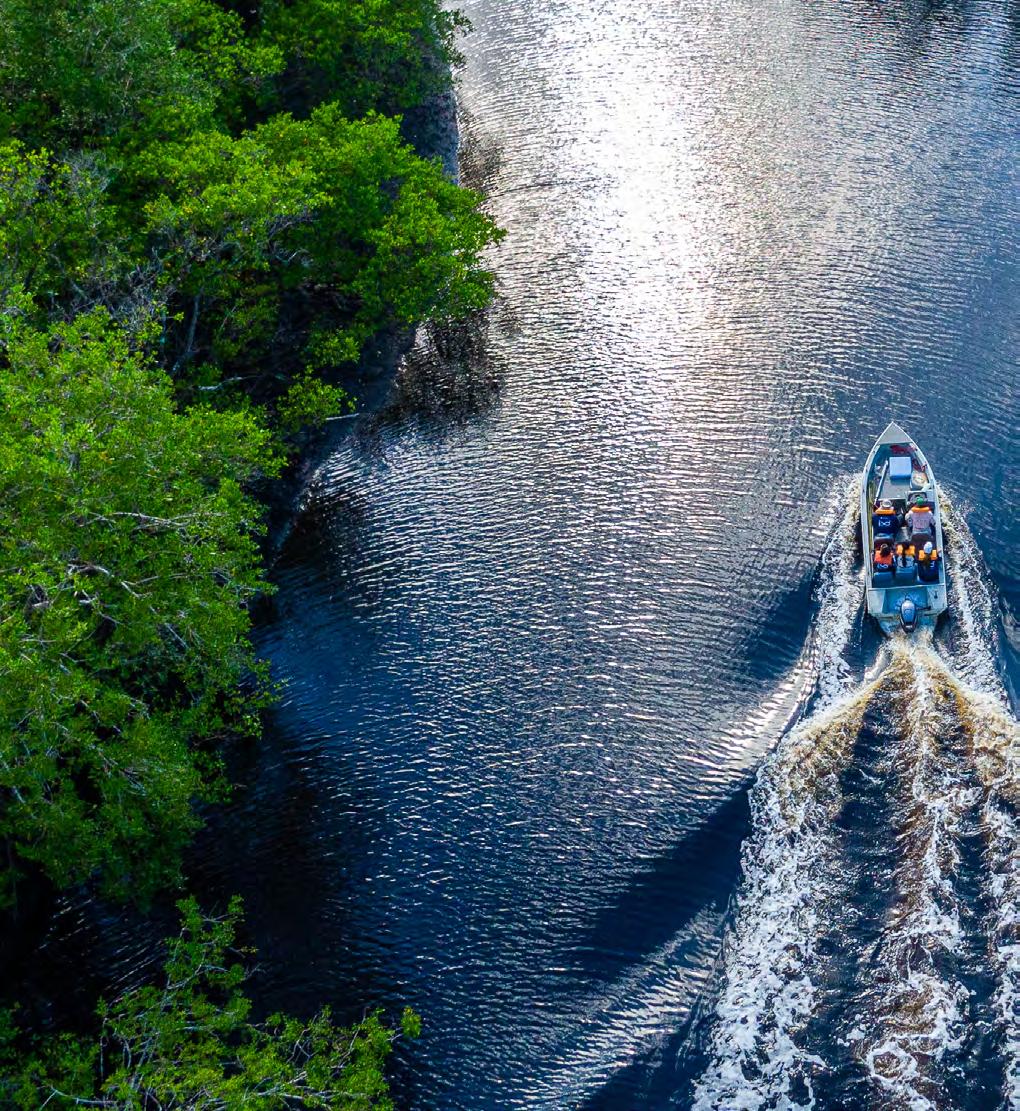
To prevent and mitigate the negative risks and impacts of our activities and enhance positive impacts on local communities, we implement environmental and social plans and programs approved through environmental licensing processes, as well as community engagement actions, socio-environmental investments, and social and environmental risk management throughout the entire business life cycle.
As a legal obligation, environmental licensing requires our strict adherence to all implementation guidelines and standards, including key frameworks like federal law 6,938/81, complementary law no. 140/2011, and CONAMA resolutions no. 001/86 and no. 237/97.
The environmental licensing process includes an analysis of socioeconomic impacts in the region, considering the survey of all aspects of the activities and their respective impacts, according to the environmental impact studies and current regulations. For those impacts identified as negative, mitigation or compensation measures are developed and implemented, while for positive impacts, actions are defined to enhance them.
The impact assessment is carried out on a per project basis, or set of projects, and the starting point is the identification of the activities inherent to each phase (project, installation, operation and decommissioning), characterizing the socioeconomic environment, qualifying the environmental risk, and proposing respective monitoring, mitigation or compensation measures. In 2024, the total amount invested in projects to mitigate/compensate for socioeconomic impacts was BRL 148 million and the amount invested in environmental monitoring in licensing processes was BRL 381 million.
In 2024, we also completed the full payment of approximately BRL 1.4 billion, referring to the settlement that aims to compensate for the environmental impacts of the accident that occurred in 2000, when the Santa Catarina–Paraná Oil Pipeline (OSPAR) ruptured, a pipeline connected to the Presidente Getúlio Vargas Refinery (Repar), in Araucária. The rupture caused the leak of 4 million liters of crude oil, contaminating the Arroio Saldanha basin and the Barigui and Iguaçu rivers. This amount will be invested by the State of Paraná and associated institutions in environmental actions in the affected regions, with an emphasis on the Iguaçu River basin, one of the main water resources in the region.
In addition to the legal obligations of the environmental licensing process, we develop social and environmental risk management processes throughout the life cycle of our business. The main purpose of managing social and environmental risks is to prevent negative impacts resulting from the interaction between our activities, society and the environment.
We understand that access to drinking water and sanitation is essential to our activities and to society, and water resource management at Petrobras seeks to rationalize water use. In
the last four years, freshwater withdrawals have been reduced by more than 20% and a commitment has been made to reduce freshwater withdrawals by 40% by 2030 based on 20216. We are committed to water security and one of our ESG drivers is to be water positive in the critical water areas where we operate, contributing to the maintenance of this important resource for society. In addition to striving to minimize water use, we also rigorously monitor the treatment of the effluents generated to ensure proper disposal.
We promote environmentally appropriate disposal and adopt circular economy practices, including partnerships with organizations of collectors of reusable and recyclable materials made up of low-income individuals. More information about projects supporting initiatives to strengthen collectives of recyclable material collectors can be found in the topic Actions for Sustainable Development.
The management of risks and impacts on biodiversity is integrated into the company. Our management of risks and impacts on biodiversity has well-established governance, corporate and area-specific guiding documents, georeferenced systems, a process of systematic monitoring of national and international trends on the subject, voluntary research and development actions associated with environmental licensing processes, establishment of partnerships with interested parties, training actions and other activities to disseminate information and raise awareness about biodiversity for the workforce.
More information about our environmental management can be found in the Sustainability Report, available at: Annual Reports: transparency is essential | Petrobras
6 Information related to Petrobras parent company, Transpetro, Pbio, Pecoco and Termomacaé.
Setting the context is the foundational first step underpinning our entire social risk management process. This crucial stage involves a socio-territorial assessment, essentially translating the lived realities of communities within a defined geographical area. In January 2024, we began gathering and analyzing both primary and secondary data across 786 communities near our facilities.
These communities were prioritized based on identified social risks and potential impacts stemming from 38 of our units, spanning 141 municipalities across 16 Brazilian states. In addition to strategic drivers, our prioritization process incorporates several inputs, including environmental impact assessments (EIA/Rima), iso-risk mapping, corporate image survey results (Sismico), records of community feedback (complaints, criticisms, and suggestions via our Ombudsman, Customer Service, etc.), potential administrative and legal challenges, and the insights of our dedicated community relations teams at these sites.
These social assessments allow us to characterize the socioeconomic landscape of communities within our operational footprint. They are instrumental in planning our community engagement initiatives and socioenvironmental investments, all with a focus on
securing our social license to operate. Gaining specialized knowledge about the communities surrounding our operations enables us to identify both vulnerabilities and opportunities within these areas, allowing us to develop impactful projects with actions tailored to the most pertinent socio-environmental concerns.
Simpler assessments involve gathering secondary data – information obtained indirectly from third-party databases like the Brazilian Institute of Geography and Statistics (IBGE) census; while more complex diagnoses also include primary data collection through questionnaires administered to local residents, semi-structured interviews with community leaders and public officials, and participatory dialogues.
The questionnaires given to residents comprise 71 questions, both open-ended and multiple-choice, analyzing information related to employment and household income, housing conditions, local infrastructure and services, and perceptions of Petrobras’s presence in the area. We plan to administer over 45,000 questionnaires by 2026 across hundreds of communities. In 2024 alone, 18,024 questionnaires were completed in more than 150 communities.
For the semi-structured interviews, we invited Petrobras employees, community leaders, and representatives from social assistance, education, public safety, housing, civil protection and defense, local commerce, and health sectors, as well as civil society organizations. Through this, we aim to incorporate diverse perspectives on our relationship with the surrounding areas, focusing also on analyzing their perceptions of the socioeconomic aspects of these localities. To date, we have interviewed 1,229 individuals.
Throughout 2024, we conducted 32 participatory dialogues – focused conversation sessions with local leaders and other community representatives – to gain a deeper understanding of the areas. Participants can discuss and list positive and negative aspects, as well as suggest improvements for local issues.
Our work also includes meetings with our teams operating at the facilities to capture their personal insights from daily interactions with the community and to identify key areas for future work. The critical analyses of each community will be developed using reports, presentations, dynamic data analysis dashboards, and the provision of georeferenced data.
Upon completion of the assessments for our units, we will have georeferenced maps identifying community social infrastructure, dashboards with socioeconomic indicators, and an understanding of local strengths and vulnerabilities. This will help us make decisions that consider the perspectives of the communities and their primary concerns. By 2025, we will conclude the assessments for over 60% of our units.
We also conduct risk assessments for investment, divestment, acquisition, and decommissioning projects, considering aspects of social responsibility (RS) and safety, health, and environment (SMS), among others.
In 2024, 21 investment projects underwent RS and SMS assessments for phase progression. This included 100% of our non-operated joint ventures (JVs) in the project phase with a Petrobras working interest (WI) exceeding USD 300 million for E&P projects and USD 25 million for refining segment projects. For Petrobras’s non-operated JVs in the operational phase, 100% of SMS and RS assessments are conducted, as stipulated in their respective joint operation agreements.
As outlined in our internal systems and standards for company acquisitions and partnerships within our mergers and acquisitions project management framework, the Social Responsibility area analyzes the socioeconomic characteristics of the relevant territories even before an opportunity is integrated into the company’s project portfolio, offering preliminary insight into the social context of the potential business.
Our aim is to identify situations that could positively or negatively influence the decision regarding the project’s direction.
Once included in the portfolio, the social risks and impacts of this business are identified and analyzed. We also evaluate information about the potential partner’s social responsibility management system (including policies, guidelines, and regulations), their stance on diversity, equity, and inclusion, their culture of social responsibility and human rights, among other factors. Our internal process also includes sending inquiries, site visits, sessions with specialists, and internal meetings to develop the Social Responsibility Report. Throughout 2024, 31 projects benefited from social responsibility assessments and reports that informed our decision-making process.
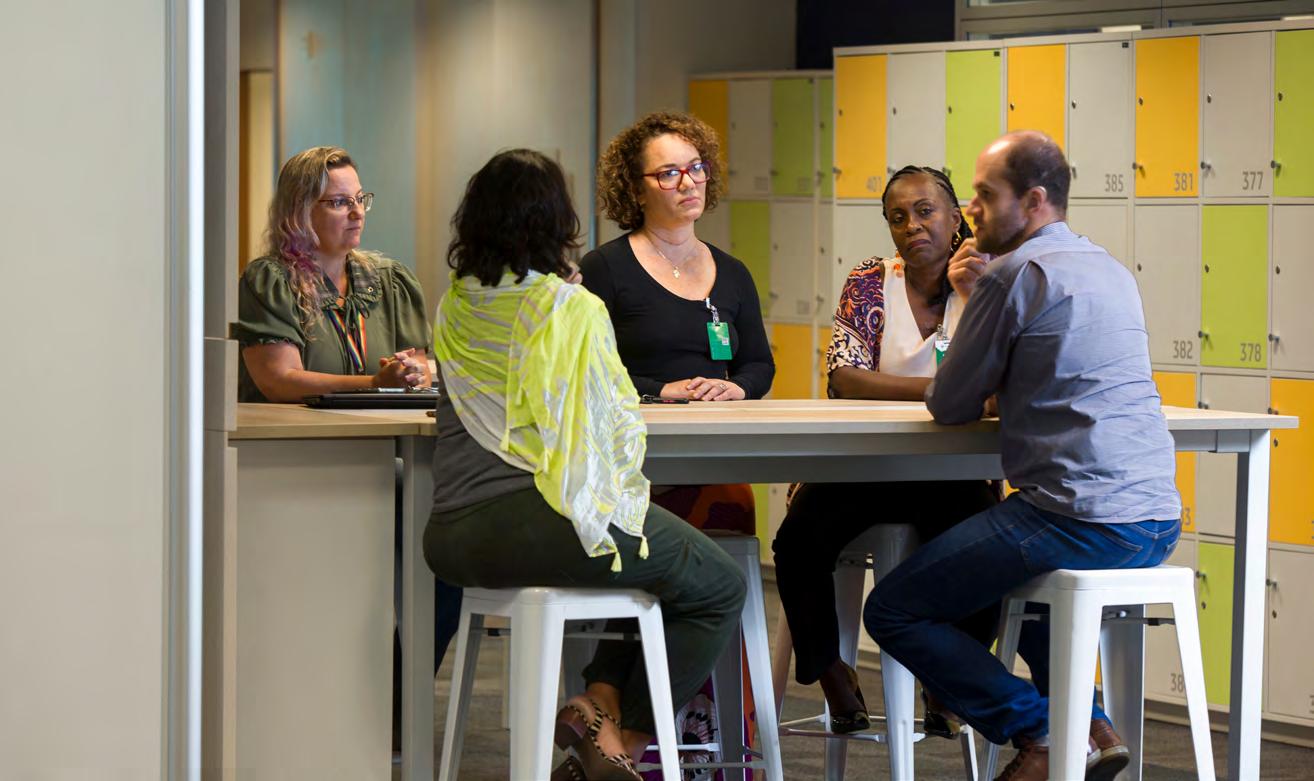
As disclosed in our 2025-2029 Business Plan, we plan to invest approximately BRL 3.0 billion in the Brazilian Equatorial Margin, which represents 38% of Exploration Capex, over the next five years, with the expectation of drilling 15 exploratory wells in the region. Located in the north and northeast of the country, between the states of Amapá and Rio Grande do Norte, the Equatorial Margin is considered an important exploratory frontier in deep and ultra-deep waters.
Regarding the FZA-M-59 exploratory block, situated in ultra-deep waters off the coast of Amapá state, approximately 175 km from the shoreline and 540 km from the mouth of the Amazon River, in water depths exceeding 2,800 meters, we are seeking authorization from the Brazilian Institute of Environment and Renewable Natural Resources (Ibama) to conduct a Pre-Operational Assessment (APO) and subsequently obtain the Operating License for drilling an exploratory well within the block area.
It is important to note that there are no records of nearby conservation units or indigenous lands in this area, nor is it located near rivers, lakes, floodplains, or reef systems.
Concerning potential environmental impacts in the region, due to the remote possibility of an event involving an oil spill at sea, we are employing advanced techniques to model oil dispersion in the ocean, following the requirements of the Terms of Reference issued and approved by Ibama. All modeling studies presented to and approved by Ibama for the FZA-M-59 block indicate no likelihood of oil reaching the Brazilian coast. Nevertheless, the structure proposed by Petrobras includes wildlife response actions in offshore and coastal areas, including monitoring and onboard veterinary care.
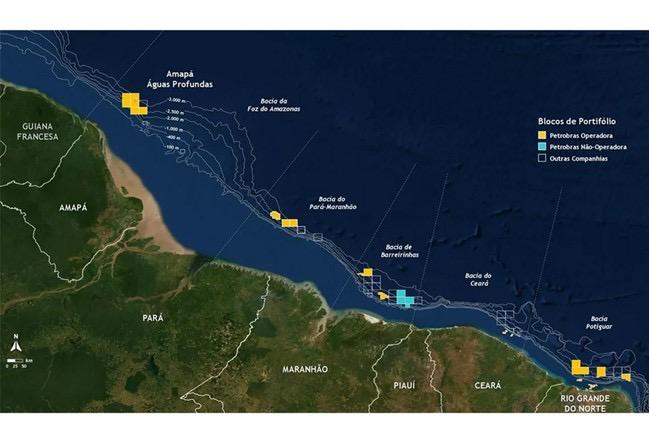
In the event of a potential leak, our wildlife response will be swift, with a fully equipped vessel, carrying specialized personnel and resources for wildlife rescue and stabilization, stationed near the drilling rig. Furthermore, five additional wildlife support vessels, equipped with climate-controlled containers and animal stabilization equipment, will be permanently dedicated to the operation. This approach has reduced response times, including travel to the Oiapoque Wildlife Response Center, aligning with Ibama’s best practice guidelines. Over 100 specialized professionals will be dedicated to animal protection, and we are committed to providing additional resources such as monitoring and aerial rescue aircraft, as well as mobile wildlife reception units.
Regarding indigenous communities, our activities in the Amazon River Mouth Basin do not directly impact them. Nevertheless, we have adjusted flight paths and aircraft altitudes to minimize noise, as requested by Ibama. Current flight paths maintain a minimum distance of 13 km from the nearest indigenous village. On average, two flights will be carried out daily.
In May 2023, we submitted a request for reconsideration to the environmental agency, following our proposal to expand the entire emergency response structure and adjust logistical operations in the municipality of Oiapoque, Amapá. Recently, Ibama requested further clarification on the Wildlife Protection Plan and the new Oiapoque wildlife response center. Our technical team has provided detailed responses to each query and awaits the environmental agency’s assessment of our request for reconsideration.
We remain optimistic and continue working on the construction of the new fauna unit in Oiapoque, with the understanding that it is possible to carry out the Pre-Operational Assessment (APO) to obtain the license for deepwater drilling in Amapá.
We value respect for life, people and the environment, and we will continue to carry out all our operations in strict compliance with operational safety standards and good social relationship practices, always seeking to act safely, with total respect and care for the environment and the population of the region to provide a positive social impact in the communities where we operate. This commitment is reinforced by holding specific discussions with public authorities, scientific institutions, Quilombola communities, indigenous peoples and other traditional communities in the region throughout the entire process.
At the Equatorial Margin, we will seek to implement solutions aligned with best ESG practices, prioritizing innovation and efficiency with a focus on reducing the carbon footprint. This approach reflects our commitments to a just energy transition, sustainability and creating value for local communities and future generations.
It is worth highlighting that we have been implementing environmental projects since 2022 in the Equatorial Margin region and we hope to fulfill the investment of BRL 350 million, as foreseen in the Petrobras 2025-2029 Business Plan, with a focus on environmental licensing management, scientific research and development, in addition to voluntary socioenvironmental investments in the region.
As an example, we’re undertaking projects like monitoring sea turtle nesting on the sandy shores of Amapá and Pará, tracking coastal and migratory birds in the region, implementing biodiversity protection initiatives, conducting social communication and environmental education programs, and carrying out projects dedicated to monitoring and caring for local wildlife.
Beyond these, we’ve conducted extensive mapping of coastal and oceanic areas in the region. This data, along with all environmental monitoring information, will be made available to the scientific community on dedicated websites. We are also planning initiatives for: (i) Environmental characterization of ecosystems in the Equatorial Margin; (ii) Regional characterization of the Amazon River Mouth, Pará-Maranhão, and Barreirinhas Basins; (iii) Socio-environmental study of traditional marine extractive communities in the coastal mangrove areas, including population characteristics, resource use, and fishing practices; (iv) Mapping of mangrove forests and classification of their degradation status; and (v) Quantification of carbon storage capacity in mangrove ecosystems.
Identifying social risks is a crucial step in ensuring that exploration and production activities in the Equatorial Margin are conducted responsibly, fostering a balance between economic development, respect for local communities, and the protection of human rights. This process involves a detailed analysis of potential impacts on local communities, considering economic, social, cultural, and environmental aspects.
In new exploratory frontiers, particularly in remote regions, the challenges of planning and executing operational activities become more complex due to the specificities of the local contexts. The presence of traditional peoples and communities, socioeconomic indicators revealing vulnerabilities, issues related to border territories, and the occurrence of illegal activities demand rigorous and strategic planning, ensuring safe operations aligned with respect for human rights and the needs of these communities.
To achieve these goals, a social assessment has been initiated through the acquisition of primary and secondary data in communities within the area of influence of Petrobras’s units in the Equatorial Margin. The purpose is to update information on social actors, socioeconomic data, challenges, and demands of these communities, fostering a more accurate understanding of their realities.
Integrated and proactive risk management is essential to ensure safe, sustainable, and socially responsible outcomes. The collected data will serve as the foundation for mapping and analyzing social risks, as well as informing the development of community engagement plans tailored to the specificities of each area. This approach seeks not only to increase the effectiveness of our actions but also to strengthen continuous and constructive dialogue with communities, ensuring a positive and sustainable impact.
In 2024, we held informative meetings with communities to share details about our activities in the area and provide clarity on the environmental licensing process. These meetings took place in the municipalities of Oiapoque, Calçoene, and Vila Velha do Cassiporé, in the state of Amapá. Additionally, we met with the team from the Federal Public Defender’s Office, through the Human Rights Regional Office in Amapá, to present our planned actions and interactions with the region’s traditional communities. This reinforces the company’s commitment to dialogue and transparency in its operations.
Furthermore, we supported 18 socio-environmental projects in the Equatorial Margin region, aiming to foster positive transformations in the communities and territories where we operate.
One example is the “Dignity for Childhood” project, developed by the “O Pequeno Nazareno” Charitable Association. This initiative promotes education as a means to overcome multiple rights violations in childhood and adolescence, prioritizing children from zero to six years old. The project also includes psychosocial support for participants, socio-emotional support for pregnant or parenting adolescents, and skills development for young people entering the workforce. Over ten thousand children and adolescents in the states of Ceará, Rio Grande do Norte, Pará, Maranhão, as well as Amazonas and Amapá, will be supported throughout the project’s three-year duration.
Another project underway in the region is the “Pesca para Sempre 3.0” (Fishing Forever 3.0) Program, implemented by Rare Brasil. This program aims to enhance income generation and the sustainability of artisanal fishing, a vital source of livelihood for coastal communities in the Amazon. It is guided by principles of financial resilience and data-driven management for decision-making. The project will offer financial literacy and entrepreneurship training to 14 communities in the Amazon coastal zone (Pará, Amapá, and Maranhão), alongside workshops on skills requested by the communities. The aim is to foster a fairer market for the Amazonian fish value chain and raise community awareness about the development of a sustainable bioeconomy, the maintenance and conservation of natural resources, and traditional ways of life.
These are some examples of the over BRL100 million that will be invested in the Equatorial Margin region between 2024 and 2028 in initiatives covering a variety of topics, such as education, culture, sports, the environment, and economic and social development, contributing to the promotion of equal opportunities and the strengthening of diversity.
Our commitment is to foster sustainable development, creating significant and lasting impacts that benefit communities and drive progress in the regions where we have a presence.
Regarding land rights, our Resettlement Guideline directs and governs our actions for the removal and resettlement of individuals or communities affected by our projects and/or activities. Community removal and resettlement include cases of physical displacement (removal and loss of housing) and economic displacement (impacts due to loss of income) caused by land acquisitions or restrictions on access and use. In 2024, we had no resettlements associated with our investments.
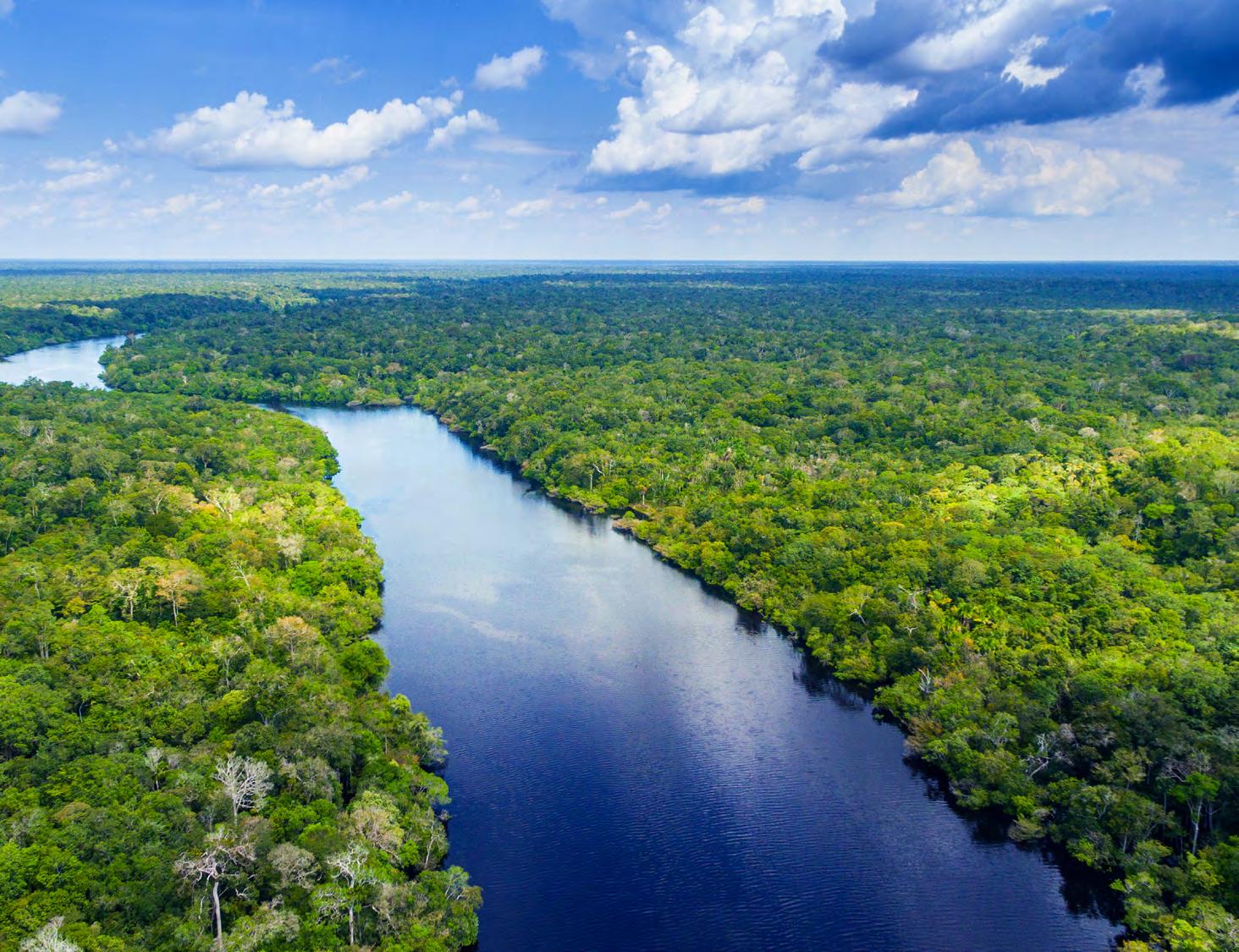
We develop several corporate citizenship practices to address the needs of communities in the territories where we operate, achieve positive socioenvironmental transformations, contribute to a just energy transition, protect the environment by promoting conservation, restoration, and biodiversity gains, and strengthen relationships with our stakeholders. These actions can occur through socioenvironmental investments and sponsorships, donations and volunteering actions.
ECONOMIC DEVELOPMENT
* It also includes projects focused on educational sports and strengthening the Child and Adolescen
Our voluntary socio-environmental investment, structured within the Petrobras Socio-environmental Program, aligns with the 2050 Strategic Plan and the 2025-2029 Business Plan, contributing to the sustainability of our business. Through the program, we develop socio-environmental solutions for issues relevant to the energy industry and the territories where we operate.
The Petrobras Socio-environmental Program’s focus areas are Education, Sustainable Economic Development, Ocean, and Forests. Through these lines, we prioritize the contribution to four Sustainable Development Goals (SDGs): (4) Quality Education, (8) Decent Work and Economic Growth; (14) Underwater Life and (15) Life on Land. Early childhood, innovation, and human rights are cross-cutting themes that can be integrated into the actions carried out by the projects within our portfolio.
The planning of our socio-environmental investment is structured based on the analysis of socioeconomic assessment results from the territories where we have operating units, mapped social risks, social and environmental issues relevant to our business, community demands, actions identified in the units’ Biodiversity Action Plans, as well as the evaluation of ongoing and completed project portfolios during the period.
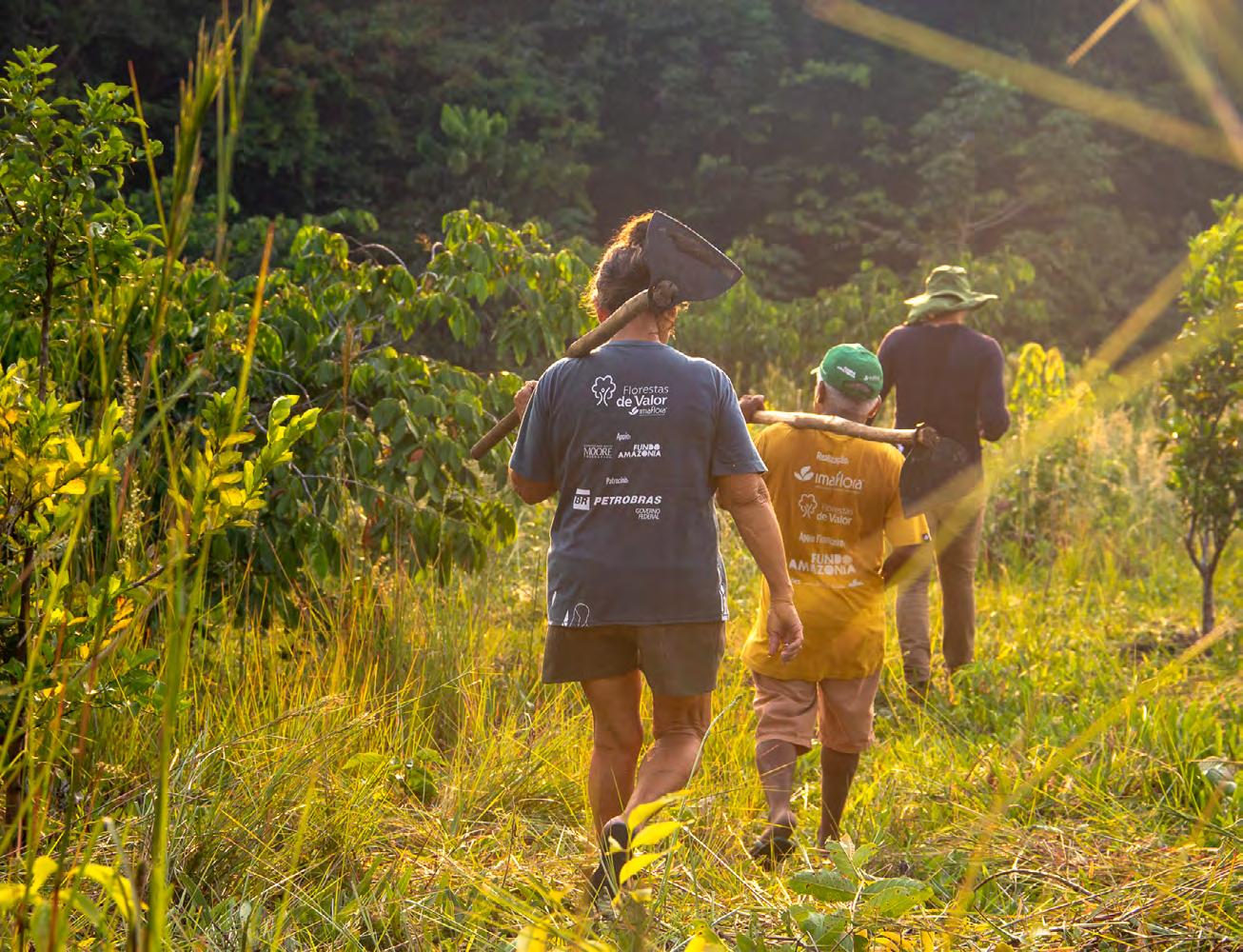
Based on this information, we identified gaps and opportunities for the project portfolio and assessed the need for public calls for proposals or the incorporation of projects present in our proposal bank. The portfolio of socio-environmental projects for 2025-2029 was planned considering the following guidelines: Level of criticality in relation to the social risks of the Operations Units, need to rebuild the project portfolio in the North, Northeast and South regions of the country, possibility of expanding the use of state and federal tax incentives and extension of project duration and budget to maximize positive impacts and contribute to the sustainability of the Program’s partner civil society organizations. As a result, opportunities for new socio-environmental projects were defined, leading to the largest public call for proposals in the Petrobras Socio-environmental Program’s history. This process, concluded in 2024, foresees the investment, over a 4-year period, of BRL 446 million in 63 approved projects, the largest volume of resources invested in a single public selection process in the history of Petrobras. The selected projects will complement the current project portfolio, totaling around 160 projects and BRL 1.5 billion to be invested by the company in the period from 2025 to 2029.
During the planning process, opportunities were identified, for example, to support initiatives aimed at strengthening associations, cooperatives, and other collectives of recyclable material collectors. Thus, two projects focusing on recyclable material collectors were selected for the Montes Claros (MG) area, within the operational scope of Petrobras Biocombustível. The “ Catador, Óleos e Gorduras: Sustentabilidade em MOC ” (Waste Picker, Oils and Fats: Sustainability in MOC) Project, by ADENOR - Development Agency of the Northern Region of Minas Gerais, aims to reduce environmental impacts in the municipality of Montes Claros by implementing the collection of residual oils and fats for biodiesel production. This initiative will generate income for cooperative waste pickers while ensuring the environmentally appropriate disposal of these residues.
The “ Viva Macaúba: Fortalecimento da Governança e Cadeia de Valor da Macaúba no Norte de Minas Gerais ” (Viva Macaúba: Strengthening Governance and the Macaúba Value Chain in Northern Minas Gerais) Project, carried out by the Community Association of Small Rural Producers of Riacho D’Antas and Adjacencies, aims to consolidate the local productive arrangement (APL) of Macaúba - the focus is on conserving the territory’s socio-biodiversity, professional qualification, productive structuring, and market access, thereby contributing to job and income generation.
In the Rio de Janeiro (RJ) metropolitan region, Petrobras is supporting three socio-environmental projects that involve 175 recyclable and reusable material waste pickers In addition to receiving waste from four of the company’s properties, the projects “ As Carolinas de Jacutinga ” by COOPCARMOCooperativa de Trabalho e Coleta Seletiva de Mesquita Ltda, “ Eu Sou Catador ” (I Am a Waste Picker) by ACAMJG - Waste Pickers Association of the Jardim Gramacho Metropolitan Landfill, and “Cooperar para Reciclar” (Cooperating to Recycle) by COOPAMA - Cooperativa Popular Amigos do Meio Ambiente Ltda, will receive investments of approximately BRL 9 million over three years.
These resources will be directed towards training and expanding the productive capacity of the waste pickers, improving the infrastructure of the cooperatives, and providing technical, legal, and accounting advisory services. The projects aim to improve the income and quality of life of cooperative members and contribute to maximizing the reuse, recycling, and recovery of waste, promoting circular economy practices and zero landfill disposal.
Another highlight is the contracting of the project “Conexões Sustentáveis: Fortalecendo a cadeia da reciclagem no estado do RS” (Sustainable Connections: Strengthening the recycling chain in the state of RS) to mitigate the impacts of the climate crisis in the municipalities of Canoas and Esteio. Over BRL 17 million will be allocated over two years for actions focused on restructuring waste picker organizations in these municipalities, starting with an assessment of the flood impacts directly on this population. The project will be developed in partnership with the Pragma Institute and includes the qualification and restructuring of cooperatives comprising over 350 waste pickers, support for the organization and inclusion of individual waste pickers, social mobilization, and the promotion of entrepreneurship. There will also be training offered in technical and management skills for the organizations, with the provision of financial aid to participants, as well as the involvement of the local population, especially those in flood-affected areas, through awareness activities, clean-up drives, and environmental education initiatives.
Strengthening projects focused on recyclable material waste pickers aligns with the guidelines of the Federal Government’s Interministerial Committee for the Socioeconomic Inclusion of Reusable and Recyclable Material Waste Pickers (CIISC), in which Petrobras holds a seat, and with the company’s strategic commitment to “generating value for society.”
An innovation in the 2024 public call for proposals was the consideration, during the planning of support opportunities, of the priority actions and municipalities mapped in the company’s Biodiversity Action Plans, tools used to strengthen management and the pursuit of biodiversity gains. In this way, the selected initiatives can represent additional conservation and habitat restoration actions, benefiting species in the biomes surrounding the covered units.
The opportunities in this selection also broadened the range of endangered fauna species protected by the projects, such as manta rays and various threatened shark species in the Ilha Grande Bay region, including the hammerhead shark and the blacktip shark. Among terrestrial species, new species of felines, canids, and primates will also be targets for conservation or monitoring by the projects, such as the jaguarundi, the bush dog, and the brown howler monkey.
One of the themes identified in the planning was the need to expand the project portfolio focusing on the Equatorial Margin region in the North and Northeast of the country. In this regard, new socioenvironmental projects resulting from this most recent public call will also be integrated into the portfolio.
Among the projects selected for the Equatorial Margin region, we highlight the Strengthening of Productive Chains in Amapá, Pará, and Maranhão, carried out by the National Service for Industrial Training (Senai), to promote the bioeconomy in the Legal Amazon. The initiative aims to encourage local sustainable development through professional education and technology, the creation of new socio-environmental products and businesses via collective
organization and community participation, as well as respect for the environment and local communities. The project prioritizes traditional communities, such as artisanal fishing families, Quilombola communities, and indigenous peoples.
The Mediation School Project, developed by the Formação Centro de Apoio e Educação Básica institution, was selected in the process focused on projects incentivized by the Federal Sports Law. It will operate in the states of Maranhão, Pará, and Amapá, benefiting over three thousand children and adolescents through educational sports activities. The project’s objective is to offer quality education with a focus on physical development through sports activities in schools, training teachers, and integrating areas such as education, health, and social assistance.
In the environmental dimension, the initiatives will seek to address the need for income generation through fishing, artisanal aquaculture, and/or family farming activities, as well as relevant issues such as the conservation of species and environments, including the sustainable use of natural resources and the preservation of the ways of life of indigenous peoples and other traditional and local peoples and communities.
An initiative working towards the conservation of coastal environments and biodiversity in the region of the Lençóis Maranhenses National Park and the Preguiças River Mouth Environmental Protection Area, carried out by the Institute for Research and Conservation of Anteaters in Brazil, is the Na Rota do Tamanduaí Project. Anteaters and other animals of the Xenarthra order (which also includes armadillos and sloths) are the flagship species of this project, which aims to reduce the socio-environmental vulnerability of traditional communities. The actions include population studies of these species, along with mangrove and Cerrado restoration initiatives, as well as environmental education activities for residents and tourists, in addition to teachers and students from traditional communities. Seeking to encourage sustainable development, residents will be offered training to provide lodging and community-based tourism services, as well as the dissemination of social technologies, such as eco-efficient stoves.
With the new projects joining the portfolio, the company hopes to expand partnerships aimed at strengthening the social, environmental, territorial, and cultural rights of local communities and populations, generating positive outcomes for both the business and society.
A new feature is that the projects selected in the 2023–2024 public call for proposals of the Petrobras Socio-environmental Program have had the execution period for activities extended from two to three years. This one-year increase in the contractual term compared to previous selections aims to enhance the consistency of each project’s results and promote the sustainability of partner organizations.
We are also expanding our support for naturebased solutions through a more diversified portfolio of voluntary socio-environmental investment models. These initiatives align with corporate strategies and the Social Responsibility Policy, establishing innovative strategic partnerships to scale up forest restoration and conservation actions.
To expand our investments in a more diversified portfolio of nature-based solutions projects, we have strengthened our partnership with the Brazilian Development Bank (BNDES) through the Floresta Viva matchfunding initiative.
The initiative aims to provide joint financial support of BRL 118 million over seven years to 20 native species reforestation projects across Brazil’s biomes, generating social and environmental benefits.
Managed by the Brazilian Biodiversity Fund (FUNBIO), the funds are being applied to projects chosen in two notices: Mangroves of Brazil (Manguezais do Brasil) and Biodiversity Corridors (Corredores de Biodiversidade), which cover the Amazon, Atlantic Forest, Cerrado and Pantanal biomes.
In total, the supported civil society organizations are expected to restore 4,200 hectares.
We have signed a memorandum of understanding with BNDES for joint action in the Restaura Amazônia Program, through which we will invest BRL 100 million over the next five years in native species reforestation projects in the Legal Amazon.
We will jointly contribute resources to amplify the impact of projects selected through public calls and restore approximately 15,000 hectares of native vegetation. The program operates in the states of Amazonas, Acre, Rondônia, Mato Grosso, Tocantins, Pará, and Maranhão, reaching strategic territories such as the so-called Arc of Deforestation, aiming to transform it into the Arc of Restoration.
Expected benefits include biodiversity preservation, water resource availability, erosion reduction, microclimate improvement, carbon dioxide removal from the atmosphere, as well as job and income generation. The program also contributes to the implementation of the National Plan for the Recovery of Native Vegetation (Planaveg) by strengthening the recovery production chain, attracting investments, and consolidating a monitoring system.
In 2024, we launched an Impact Fund for Socio-environmental Bioeconomy Projects and Nature-Based Solutions (Petrobras Bioeconomy Fund) in partnership with Régia Capital, a managing company focused on sustainable investments and financial solutions, resulting from a strategic partnership between JGP and BB Asset.
With our initial investment of BRL 50 million, combined with another BRL 50 million from funds managed by Régia Capital, the fund aims to complement our Social Responsibility initiatives. It will do this by fostering the transformation of socio-environmental projects into sustainable businesses with positive impact, preserving the allocated capital and reinvesting financial returns so that the projects can scale their socioenvironmental benefits.
The selection of projects will prioritize initiatives in areas considered critical for climate action and biodiversity preservation; actions in areas under deforestation pressure; initiatives with a positive impact on job and income generation; projects with the potential to generate high-integrity carbon credits; and biodiversity and fauna and flora restoration credits. Adopting the Impact Linked Compensation model, the fund’s performance fee is tied to the socio-environmental impact of the projects, and specific governance ensures the consideration of economic, social, and environmental indicators in the selection process. The creation of the fund aligns with our 2050 Strategic Plan and the 2025-2029 Business Plan, which include guidelines for promoting environmental conservation and restoration actions throughout Brazil.
Also in 2024, Petrobras and BNDES launched a joint public call for proposals called Sertão + Produtivo, focusing on the selection of 10 social projects to operate in all states of the Brazilian semiarid region. The two companies will jointly invest up to BRL 100 million over the next five years in projects that contribute to the strengthening and structuring of family farmers’ associations and cooperatives, the production of healthy food and the reduction of food insecurity, as well as income generation for people in situations of social vulnerability.
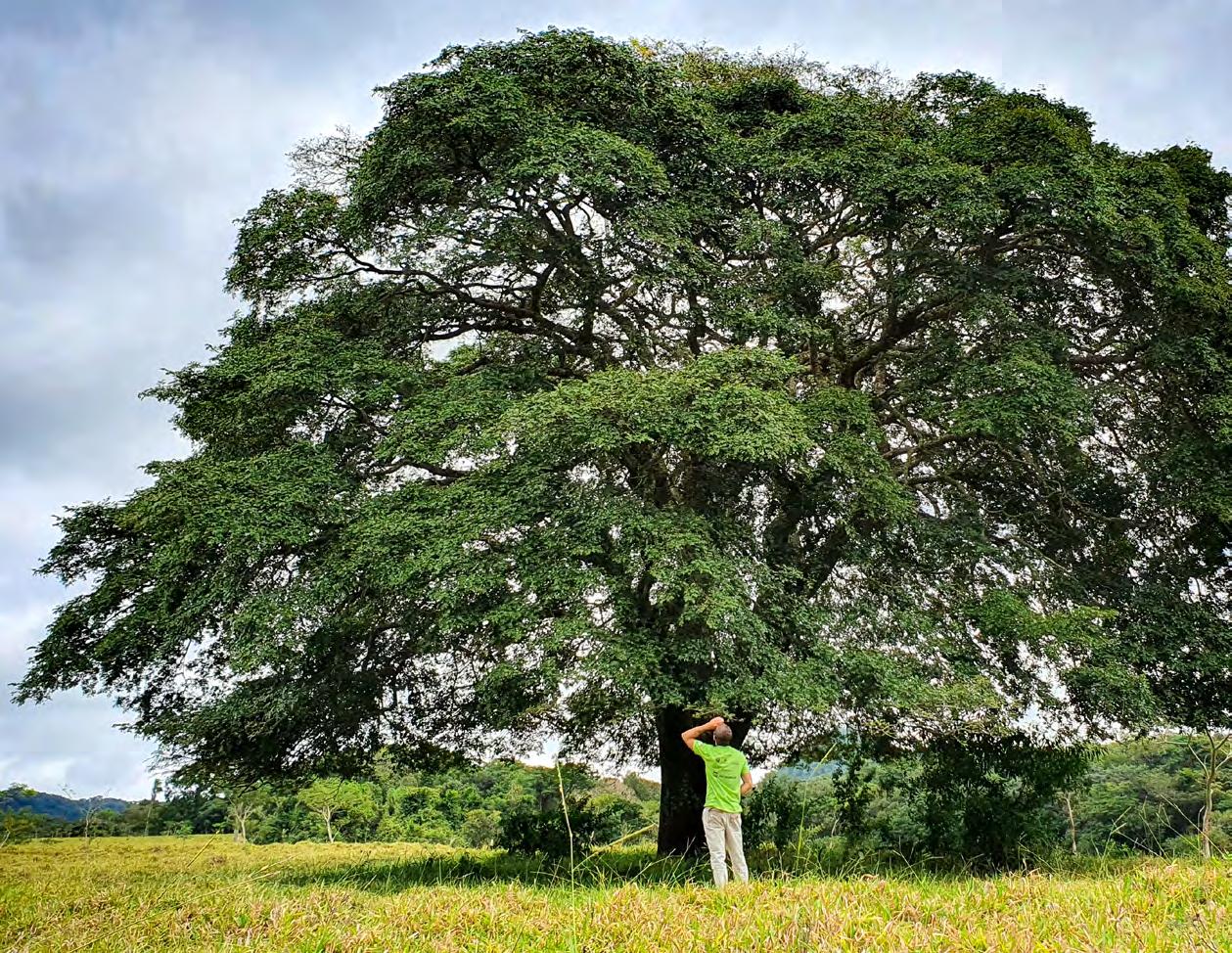
121,483 regular participants, 2,838,351 eventual participants and 27,550 in training
115 projects* totaling BRL 284 milion invested throughout 2024
182 ton of collected solid waste
4,806 engaged producers
5,551 scholarships granted
37,703
0-6 year old children beneffited by the projects actions
629 researchers supported within the projects
More than 1,108 fauna and flora species protected, studied or monitored, 99 endangered species
396 technical and scientific publications produced
535 mil hectares (2,557 hectares recovered and 532,671 directly preserved)
2,784 jobs directly created by the projects
7 Results achieved by the Petrobras Socioenvironmental Program and the Floresta Viva Initiative
3 million tCO2 potential in net removal and avoided emissions
3.441 participants with income increase
27.9 million hectares f protecteced areas with strenghtened management
3.1 million planted seedlings
To work from a long-term results perspective and improve the management process of supported socio-environmental projects, Petrobras has begun using the Theory of Change for the presentation of socio-environmental project proposals and the Social Return on Investment (SROI) and Cost-Benefit Analysis (CBA) methodologies for impact assessment of the projects in its portfolio.
In this way, in addition to monitoring indicators, we also conduct analyses of the socio-environmental return on investment, converting the environmental, social, and economic transformations resulting from project implementation into monetary values. The assessments are carried out by a third party, the Institute for Social Investment Development (IDIS), and include the involvement of project beneficiaries to identify perceived changes.
In the 2050 Strategic Plan and the 2025-2029 Business Plan, we have committed, within the scope of socioenvironmental investments, to providing a return to society of at least 150% of the value invested in voluntary socioenvironmental projects by 2030.
As a result of these initiatives, we can cite a social impact of BRL 750 million generated by 40 socio-environmental projects evaluated since 2019. On average, the evaluated projects returned BRL 4.80 in social and environmental benefits for every BRL 1.00 invested by Petrobras.
In 2024, Transpetro also increased its investments in socio-environmental projects. The subsidiary’s agreements and projects directly impacted approximately 67,417 people over 12 months. to sponsorships initiated in previous years –the Faixa Limpa II (Clean Strip II), Do Mangue ao Mar (From the Mangrove to the Sea), and Cine Transpetro (Transpetro Cinema) projects – three other projects began in 2024:
• Botos da Barra in Osório/RS (Bar Dolphins in Osório/RS): The project aims to safeguard cooperative fishing as a guardian of the socio-biodiversity conservation of the Tramandaí River estuary. For at least 120 years, local fishermen have practiced cooperative fishing alongside 13 Lahille’s bottlenose dolphins that live in the area. The animals signal the ideal moment for fishermen to cast their nets. The fish that escape feed the dolphins. This centuries-old tradition survives in only three places on the planet. To this end, the agreement with the Center for Coastal, Limnological and Marine Studies (Ceclimar) of the Federal University of Rio Grande do Sul (UFRGS) has been renewed.
• Cultura na Faixa (Culture on the Pipeline Right-of-Way): This project aims to promote family and community interaction, prevent situations of social risk, and strengthen the company’s ties with communities to ensure the social license for the pipeline right-of-way team to operate in the Ana Clara (Duque de Caxias), Geneciano (Nova Iguaçu), and Jardim Ueda (Itaguaí) communities in Rio de Janeiro – areas with high social vulnerability. The project is implemented in the area of influence of Tecam (Campos Elísios Terminal) by the NGO SER – Se essa rua fosse minha (If This Street Were Mine). The project will directly benefit around 600 people, who will be involved in Coexistence and Bonding Workshops with Community Therapy, and sociocultural activities such as Social Circus and Folia de Reis (Epiphany Celebrations).
• Jovens Líderes pelo Clima em Paracambi/RJ (Young Climate Leaders in Paracambi/RJ): This project aims to train 100 young people aged 16 to 29, high school, technical, and higher education students from federal and state institutions (FAETEC and IFRJ) and state schools in Paracambi-RJ, on the topic of climate change. With a workload of 366 hours, the course includes ten modules of theoretical-practical classes and technical visits. The project aims to serve 100 people.
We have revamped the Petrobras Cultural Program, which now comprises four thematic pillars: “Icons of Brazilian Culture”; “Festivals and Popular Celebrations”; “Production and Circulation”; “Cinema and Digital Culture”, and two transversal dimensions: “Diversity” and “Creative Economy”. We also launched the largest public call for cultural projects ever undertaken by the company, with an investment of BRL 250 million, supporting 140 projects across all Brazilian states, to be implemented starting in 2025.
In sports sponsorships, the highlight was the continued support for the training of Olympic athletes who together form Team Petrobras and represented Brazil at the Paris 2024 Olympic and Paralympic Games. The sponsorship involves 55 high-performance athletes and para-athletes across 31 different sports. From the Team, 44 athletes participated in the Paris 2024 Olympic or Paralympic Games, winning 21 medals – 8 Olympic and 13 Paralympic. In 2024, we also resumed sponsorships in motorsports, including Fórmula Truck, Rally dos Sertões, and F4 Brasil.
Sponsorships of business, science, and technology events intensify our relationships with partners, investors, clients, the academic and scientific community, among others. We have a presence at the main innovation ecosystem events in the country, as well as in initiatives that spark curiosity and promote experiences for different audiences on topics related to science and the transforming world.
Several methodologies are used to select, manage and evaluate sponsoring projects, individually and jointly, including technical assessments, potential assessment, scope achievement assessment, measurement of brand exposure in the media, in order to assess the value achieved in financial return equivalent to sponsoring cultural, sports and business, science and technology events.
All selected sponsorships, as well as others that already make up the portfolio, will undergo an assessment of the IDP indicator (Sponsorship Performance Index). The IDP is a process indicator that evaluates the performance of sponsorships contracted by Petrobras in the Culture, Sports and Business, Science and Technology lines of action. Each sponsorship project is unique, and even between editions, there may be variations in the scope and items proposed. The process considers the IDP of contracted sponsorships, aligned with the strategic drivers and opportunities for the company.
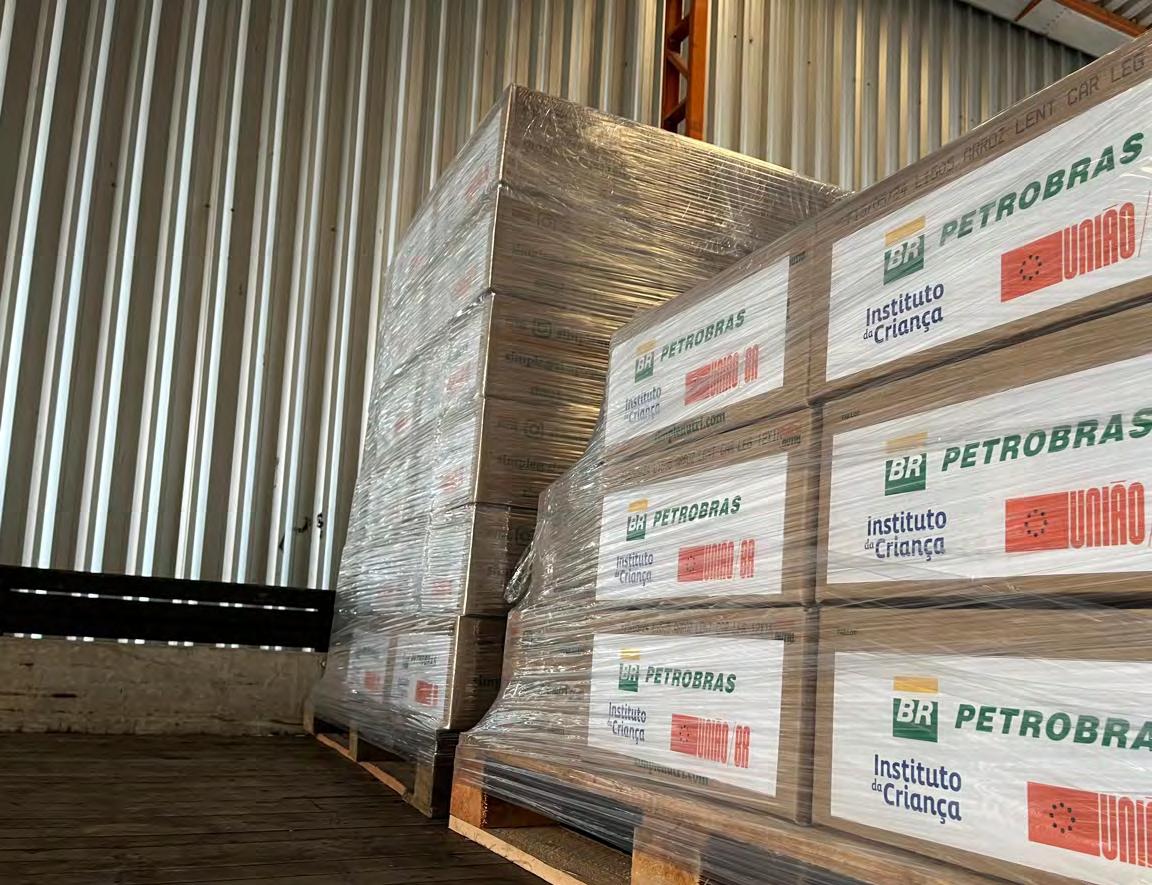
Throughout 2024, our main donation was directed towards emergency actions resulting from the heavy rains that struck Rio Grande do Sul between April and May 2024. These rains caused significant material and environmental impacts on the lives of the population, infrastructure, the economy, and the functioning of public institutions. Recognizing that recovery efforts will require structured and consistent long-term initiatives, we organized a series of crisis response actions, with a special focus on impacted communities living near our facilities.
We formed a team to structure and manage our actions in the region, analyze donation requests, and adopt necessary measures for strategic support, emergency management, and ensuring business continuity to mitigate potential local impacts.
As a result of these activities, we donated over BRL 26 million in financial resources and equipment. Key actions included the acquisition of essential items such as basic food baskets and household appliances, 60,000 dehydrated meals and water filters, as well as 126,000 liters of potable water for shelters and Civil Defense. We also arranged for the installation of portable toilets to serve the sheltered population and provided aviation fuel for support aircraft, as well as fuel for boats, vehicles, and power generators for the fire department, which enabled rescues to be carried out at night as well.
At the request of the Ministry of Mines and Energy, we provided three pumps available at the company’s environmental defense center bases in Imbé (RS) and Itajaí (SC). With a suction capacity of 270 cubic meters per hour, these units help to dewater smaller areas, confined spaces, or the interiors of public buildings. One unit was used to remove water from flooded areas in the Sarandi neighborhood of Porto Alegre, and the other two served the metropolitan region.
In addition to financial and material donations, we mobilized our specialized teams to contribute to the physical and mental health of our employees, service providers, and the affected population, offering psychological and social assistance, as well as actions to combat infectious diseases and leptospirosis.
Starting in November 2024, we implemented a long-term program to support the people and the economic recovery of Rio Grande do Sul. The goal is to continue working on the state’s recovery with projects supporting education, health, and culture, and with actions to stimulate community training in search of new sources of employment and income. Furthermore, environmental projects will be developed for the prevention and mitigation of climate disasters through partnerships or sponsorships of research institutes or other organizations.
Reaffirming our commitment to reducing inequalities and fostering national development, we will invest approximately BRL 100 million in the Movimento Petrobras pelo Rio Grande (Petrobras Movement for Rio Grande) Program, which comprises a series of actions for the state of Rio Grande do Sul.
The program will operate over the next two years across four pillars: society, environment, company assets, and institutional relations. A working group will centralize and monitor the implementation of these initiatives.
[RS/RSREG] In addition to the support actions for RS, in 2024, we carried out the third cycle of donations of refurbished notebooks to federal and state public schools located in communities within the operational scope of our activities in the states of Amazonas, Amapá, Bahia, Minas Gerais, Pará, Paraná, Pernambuco, and Rio Grande do Sul, as well as partner institutions of the Petrobras Socio-environmental Program.
Between January and June 2024, 153 educational institutions received a total of 4,101 notebooks, expanding digital access for teachers, children, and adolescents. Furthermore, we delivered 1,230 machines to 65 Civil Society Organizations (CSOs) that develop social or environmental projects through the Petrobras Socio-environmental Program.
1.499,00 EMERGENCY SITUATIONS BRL 26,723,202.12
AND FOOD
8 The information on Donations pertains to the Petrobras system.
We also developed 719 volunteer actions throughout 2024, with the participation of 1,718 volunteers. Our actions reached an audience of 12,890 beneficiaries.
This year, we highlight the second mentoring initiative for the Petrobras Young Apprentice Program, with 45 learning groups distributed across 27 technical or basic vocational training courses.
Another relevant action was the “Empresário Sombra” (Shadow Entrepreneur) initiative, in partnership with IBP and Junior Achievement. In the final module of the Annual Entrepreneurial Path Program, we welcomed high school students from the Rio de Janeiro state public school system for a workday at Petrobras. Volunteers offered the young people a real-world experience of the workplace to inspire and familiarize them with the professional environment.
In 2024, we approved the expansion of the Petrobras Volunteer Program to include the participation of contracted workers. We also increased the possibility of up to 80 hours of paid leave per year for permanent employees to engage in volunteer work in officially declared emergency or public calamity situations by government administrative authorities.
1,020
HOURS SPENT VOLUNTEERING DURING OFFICE HOURS
9 The Volunteering information pertains to Petrobras’s controlling company
2,052
HOURS
Vulnerable groups are those at higher risk of experiencing severe negative impacts due to the company’s activities or business relationships. Among these groups, we highlight:
• Children and adolescents;
• Women;
• Black individuals
• Indigenous peoples and traditional communities
Accordingly, in our internal policies and guidelines, we establish premises for careful attention to vulnerable groups, in addition to specific programs and initiatives for these populations.
Access to culture, play, recreation, and sport are fundamental and constitutional rights guaranteed by Articles 215 and 227 of the Federal Constitution of Brazil of 1988, by Statute of the Child and Adolescent (ECA) and by Article 31 of the United Nations Convention on the Rights of the Child (UN). Seeking to guarantee these rights and increase the presence of children, adolescents, and young people in vulnerable situations in artistic and cultural spaces, the Petrobras Socio-environmental Program invests in educational, artistic, and sports projects throughout Brazil.
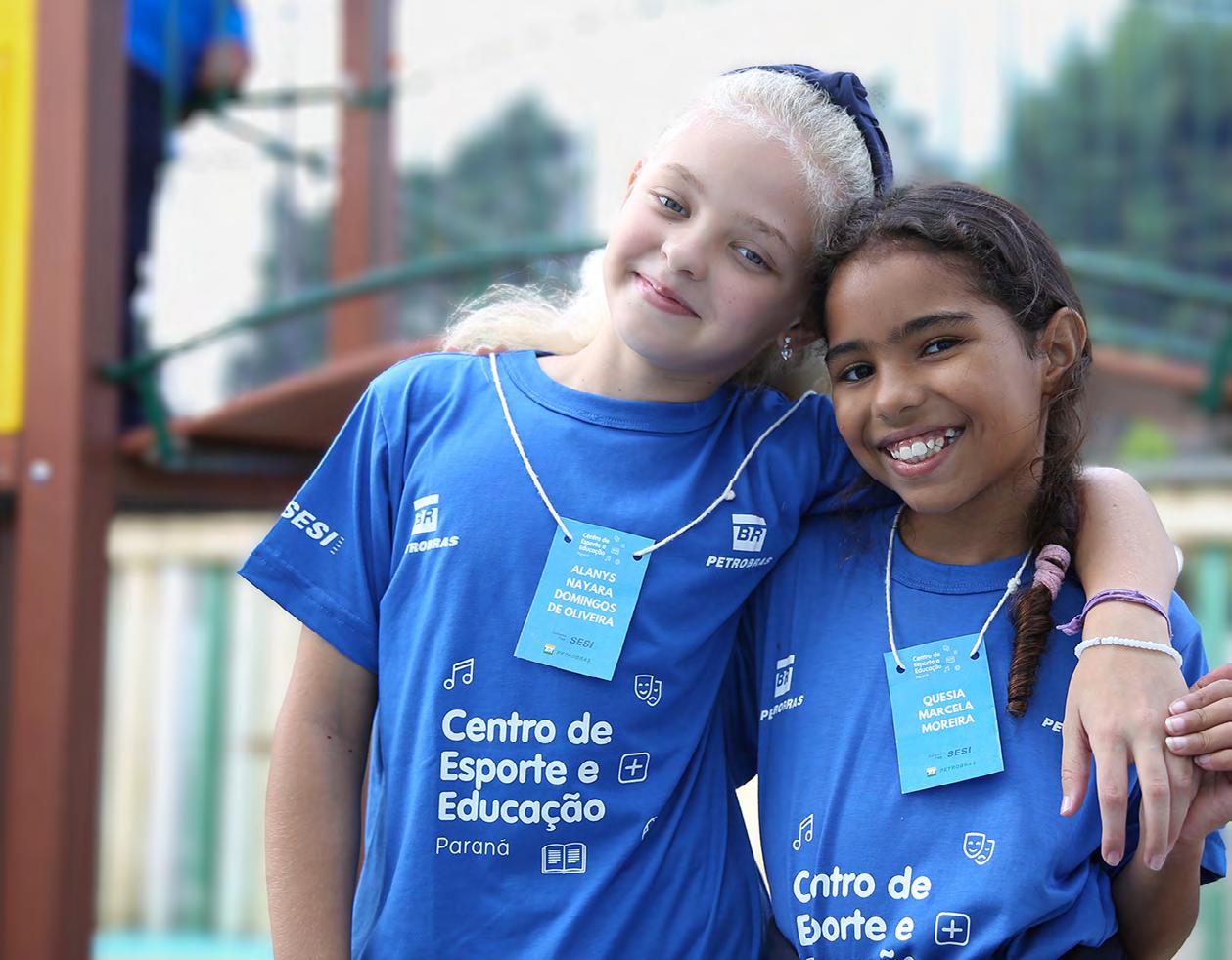
Among the projects is Unicirco Arte, Educação & Comunidade VI (Unicirco Art, Education & Community VI), carried out by the São Francisco de Assis Cultural and Assistance Institute. Through circus arts, it promotes pedagogical, artistic, cultural, and socio-environmental activities in seven centers within communities and public schools in the municipality of Duque de Caxias, in the Baixada Fluminense region of Rio de Janeiro state. The initiative actively seeks talent, monitors participants’ academic performance, promotes extracurricular pedagogical cultural activities and training, with inclusive approaches for people with disabilities. In the 2023-2027 cycle, the project will routinely serve over 600 beneficiaries with more than 3,800 free social circus, dance, and artistic training workshops.
The Canarinhos da Terra project , carried out by the Canarinhos da Terra Institute of Education, Culture, and Sport, has been supported by Petrobras for 16 years. Developed in the municipalities of Paulínia and Cosmópolis, in the interior of São Paulo state, the project seeks to enhance the protagonism of children and adolescents in art and culture through musical education and choral singing activities, stage preparation, body expression, as well as workshops on scriptwriting, text creation, costume design, and set design.
We also add to these the actions of the Semeando Cidadania, Saber e Cultura (Sowing Citizenship, Knowledge, and Culture) project, developed by the Salão do Encontro Assistance Service, which serves over 900 children and adolescents with education, arts, and sports activities during after-school hours. The project also revives techniques of Minas Gerais craftsmanship, in addition to developing choral singing activities and teaching Libras, the Brazilian Sign Language, in Betim, Minas Gerais.
In the Jurujuba neighborhood of Niterói, the Projeto Grael –Mar de Oportunidades (Project Grael – Sea of Opportunities), developed by the Instituto Rumo Náutico (Nautical Path Institute), provides swimming, sailing, and canoeing activities for children and adolescents aged 9 to 17. Participants also have access to workshops with playful activities related to the environment on low-wind days and a community library. The project also trains young people between 18 and 29 years old in upholstery and nautical electrical installations, naval carpentry, fiberglass, and outboard and diesel engine mechanics.
The initiatives supported by the Petrobras Socioenvironmental Program reaffirm the company’s commitment to the integral development of Brazilian children, adolescents, and young people, broadening their horizons and inspiring personal and community transformations that multiply over time. Through the encouragement of culture, sport, and education, Petrobras participates in stories of overcoming challenges, creativity, and inclusion, contributing to the construction of a fairer, more sustainable future full of possibilities for the next generations.
Beyond education and culture initiatives, and aware of our responsibility in addressing the sensitive issue of child and adolescent sexual exploitation, considering the characteristics of our industry’s activities, we act to prevent this type of violence and to promote the improvement of the quality of life in communities. In partnership with our Social Responsibility area, we promote dialogue on this topic in meetings with representatives of the Municipal Councils for the Rights of Children and Adolescents (CMDCA), with the participation of leaders from communities neighboring our operations.
Since 2010, we have been committed to the Declaration of Corporate Commitment to Confronting Sexual Violence Against Children and Adolescents. In it, we position ourselves among companies that work to protect the rights of children and adolescents.
Recognizing that sexual violence against children and adolescents is a social risk mapped in our internal standards, especially when considering large construction projects that can impact nearby communities, we have also established internal norms within our Code of Ethical Conduct, Human Rights Guidelines, and Ethical Conduct Guide for Suppliers, which help in combating this type of violence.
We have established partnerships with third-sector organizations through the Petrobras Socio-environmental Program to support initiatives focused on protecting children and adolescents in situations of violence and strengthening the Rights Guarantee System. Here are two key projects working on this issue:
The Mobilizar e Agir (Mobilize and Act) Project, developed by the Santo Antônio Child and Adolescent Assistance Institute (IACAS), works to strengthen public policies aimed at protecting children and adolescents, especially focusing on confronting sexual violence. In addition to assisting victims of violence and their families, the project conducts social diagnoses, workshops, and awareness events on the topic within communities in the municipalities of Manaus, Coari, and Carauari in Amazonas, and with the Child and Adolescent Protection Network. This contributes to strengthening family bonds, promoting youth protagonism, mobilizing professionals in the Protection Network, and raising community awareness about responsibility in childcare. In total, nearly 2,000 people will directly benefit from the project’s activities.
The Neaca : Tecendo Redes (Neaca: Weaving Networks) Project, developed by the Women’s Movement in São Gonçalo, aims to act within the special social protection policy, guaranteeing the rights of children, adolescents, and young people. The project offers specialized interdisciplinary support in the areas of social work, psychology, law, and pedagogy through the Specialized Centers for Assistance to Child and Adolescent Victims of Domestic and Sexual Violence, located in São Gonçalo, Itaboraí, and Duque de Caxias in the state of Rio de Janeiro. The focus is on minimizing the psychological, physical, emotional, and cognitive harm suffered by children, adolescents, young people, and their families exposed to various forms of violence. In total, nearly 5,000 participants will be assisted by the project over the next four years.
In March 2024, we signed a Technical Cooperation Agreement (ACT) with the National Council of Justice (CNJ) to support the nationalization project of the Novos Caminhos Program.
This initiative by the National Justice Ombudsman focuses on developing the potential and building the autonomy of young people in situations of social vulnerability living in institutional care, offering training possibilities and employment opportunities, and contributing to the autonomy and financial independence of this population.
According to data from the National Adoption and Foster Care System, in 2024, there were over 34,000 children and adolescents sheltered in foster homes and public institutions in Brazil. Children and adolescents who are not adopted or cannot return to live with their biological families face significant challenges when they reach adulthood. Upon turning 18, they must leave foster homes and survive on their own, often encountering great difficulty in economic and social integration.
Petrobras’s support for the Novos Caminhos Program involves making vacancies available for this population in professional training and educational improvement projects supported by the company and developed in locations near institutional care facilities.
Additionally, the Petrobras Young Apprentice Program (PPJA) has synergy with the CNJ initiative. In alignment with the Apprenticeship Law (No. 10,097/2000), the PPJA allocates 10% of its professional apprenticeship vacancies to young people in institutional care. Through the partnership with the Courts of Justice, it will be possible to expand the attraction and registration of these young people to fill the apprenticeship vacancies offered in the company’s recruitment and selection notices.
With efforts that date back to the 19th century, the different groups of Brazilian women have gained their autonomy through the rights to education, voting, and political participation, recognizing their citizenship, and the guarantee of formal employment, among others. But neither these rights, nor others that arise from them, translate into true equality of opportunity. And they differ when we look at the racial divide between Black, indigenous, and white women. But, above all, with the gender divide between women and men.
Disparities resulting from gender and race distinctions impact women’s financial autonomy, highlighting structural inequalities that undermine other areas of their lives. And that can facilitate other forms of violence, given the vulnerable situation in which these people may find themselves. In other words, also representing a fragility in the guarantee of human and fundamental rights for them.
Check out topics 2, 3, and 4 for other Petrobras actions to guarantee the financial autonomy, security, and well-being of women in society in general, but also in our areas of operation. The actions also involve reflections on masculinity.
Therefore, we believe it is essential to strengthen the protagonism of women in vulnerable situations through professional training and income generation opportunities. To this end, we develop various socio-environmental projects and actions specifically aimed at women.
Among the socio-environmental investments, we highlight the Mão na Massa – Mulheres na Construção Civil (Hands-on – Women in Civil Construction) project, carried out by the Maria Imaculada Shelter Protector Institute for the Poor and Children (IPPCAMI). The project
contributes to strengthening the protagonism of women in situations of social vulnerability by offering professional qualification for work in civil construction, expanding opportunities for economic autonomy and restoring citizenship. The project has already trained over a thousand women in professions such as bricklayers, formwork carpenters, painters, and electricians, in addition to guiding them in their careers. The project is developed in Itaboraí, in the state of Rio de Janeiro, with the goal of certifying 300 low-income, female heads of households, and unemployed women over the next three years.
Another project focused on strengthening female protagonism is the Rede Solidária de Mulheres de Sergipe (Solidarity Network of Women of Sergipe) project, developed by the Association of Mangaba Pickers of Indiaroba (ASCAMAI). The initiative encompasses 400 women, belonging to the traditional community of mangaba pickers. The participants are predominantly Black, with low levels of education, in situations of vulnerability, and residing in the municipalities of Carmópolis, Divina Pastora, Indiaroba, Estância, Barra dos Coqueiros, Pirambu, Japaratuba, Aracaju, Santo Amaro das Brotas, Neópolis, and Poço Verde, in Sergipe. Through this project, women are working collectively in mangaba extractivism, taking care of the production and conservation of this crop, with sustainable practices and respect for the environment.
Current activities include the development of skills and abilities through workshops and courses in areas such as food processing, artisanal clothing, agroecology, and nursery seedlings. The project also implemented the construction of fruit processing units and the diversification of marketing lines with new, higher value-added products, such as jellies, pulps, cookies, and candies. The project also invests in the use of information and communication technologies, such as e-commerce for the sale of mangaba products, and promotes training activities, such as workshops, webinars, and seminars, always with the active participation of the communities involved.
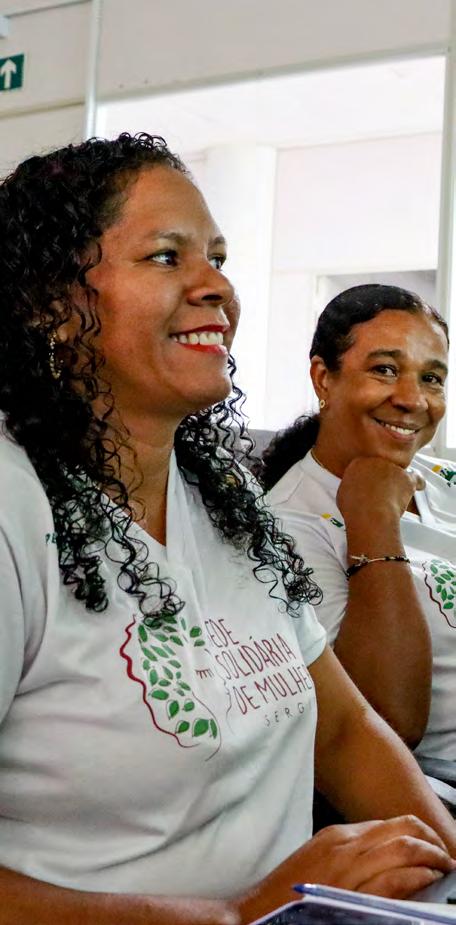
We consider it essential to promote actions to increase the presence of Black professionals in our workforce, as well as the training of young people for future professional opportunities. Furthermore, we highlight the importance of raising awareness among our employees about the anti-racist struggle in the business environment.
See the company’s additional actions described in topics 2 and 4. These measures also address the valorization of Black and indigenous peoples in the formation of the country through their cultures.
In this context, we develop actions to promote racial diversity and overcome racism. Among them, we highlight the Advocacy for All Program, which aims to train self-declared Black students for public tenders in the legal career, especially the advocacy career at Petrobras, promoting greater representation of Black people in corporate advocacy.
The course was an initiative of Petrobras, in partnership with the Business Initiative for Racial Equality, a movement formed by large companies and institutions committed to promoting racial diversity in the corporate environment and overcoming racism.
Course instructors are lawyers from Petrobras’s workforce who participate in the Pro Bono Legal program.
100 vacancies were offered, and the selection criteria were self-declaration and OAB registration number.
50% of the vacancies were reserved for Black women.
On 08/14/2024, we held the graduation ceremony with the delivery of certificates to the
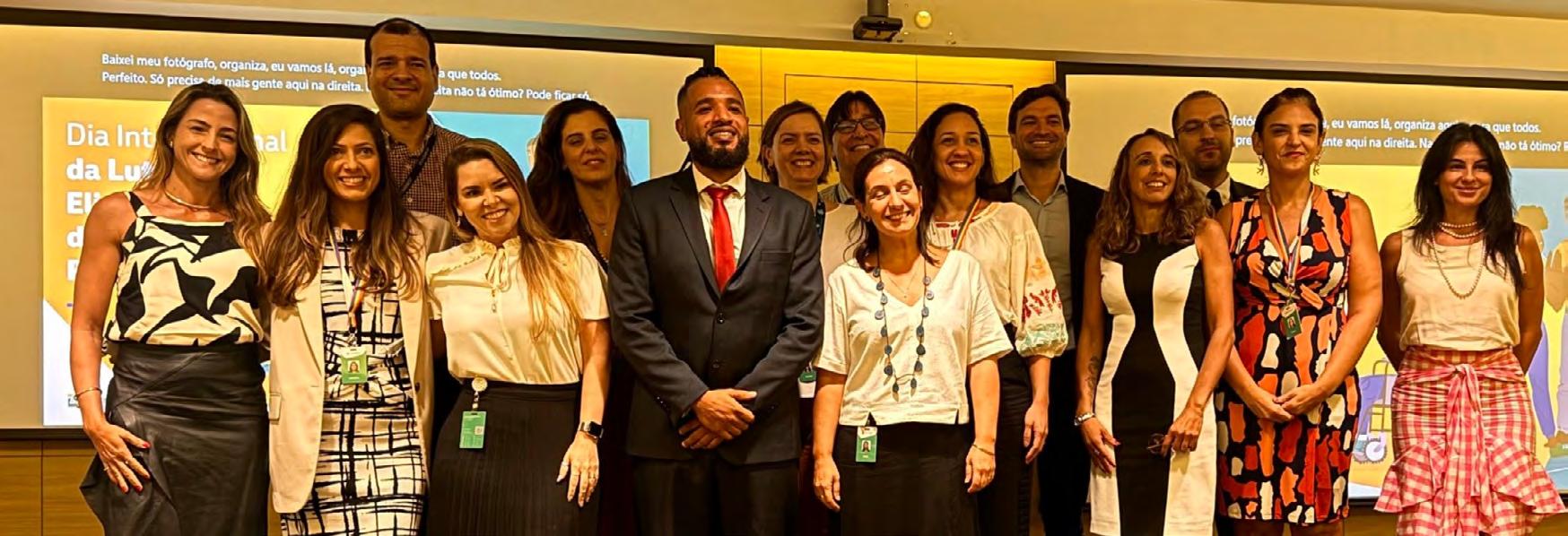
on girls, women and Black people in STEM
The Women and Girls in Science, Technology, Engineering, and Mathematics Project, which in 2023 hosted 11 groups visiting our facilities with the participation of over 400 girls, was expanded and reformulated in 2024 into the Communities Visits Program. In 2024, there were 24 visits to our facilities, with 942 participants.
The Community Visits Program, focused on girls, women and Black individuals, aims to encourage access to STEM careers (acronym in English for Science, Technology, Engineering and Mathematics) by students residing in communities within the scope of our operations. During the visits, we offer a space for exchange and listening with the visitors through round table discussions with women professionals from our workforce. The approach of these discussions encompasses topics such as professional trajectory, financial independence, empowerment, and the balance between professional career and family responsibilities, among others.
We prioritize that, during these meetings, visitors have contact with professionals who are references in their activities and demonstrate the diversity and representativeness of our workforce, with the participation of Black, disabled, LGBTQIA+, and indigenous professionals, for example.
We also implement projects to promote Quilombola communities and culture. The Quilombo Sustentável (Sustainable Quilombo) Project, carried out by the Terroá Institute Association, aims to promote sustainable territorial development in the Quilombo do Sertão de Itamambuca, in the municipality of Ubatuba, on the northern coast of São Paulo state, through organic agriculture, strengthening community-based tourism, and environmental education. The target audience includes women, Black people, and traditional communities.
The project involves conducting an initial diagnosis to measure economic, environmental, and social dimensions through semi-structured interviews with 50 Quilombola families and non-Quilombola families in the region.
At the end of the project, new interviews will assess progress in income, nutrition, employability, and other indicators. Articulation with other communities and organizations will allow for the replication of the developed experiences and training, with the intention that the territory and the association serve as pilots and multiplication centers for other communities and traditional peoples in the region.
WE DEVELOP ACTIONS FOCUSED ON RECORDING AND APPRECIATING INDIGENOUS CULTURE AND TRADITIONAL COMMUNITIES
In local social responsibility plans, we consider traditional peoples and communities of fishermen, Caiçaras, Quilombolas, indigenous people, riverside dwellers, and Terreiro communities.
|The identification of communities and traditional peoples addressed in this section considers the legally established concepts. This scope was anchored in the identification established in Decree n. 6040/2007, which establishes the National Policy for the Sustainable Development of Traditional Peoples and Communities. The prioritized communities are presented in the following graph:















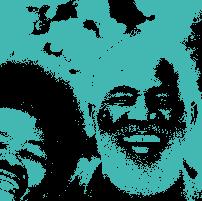




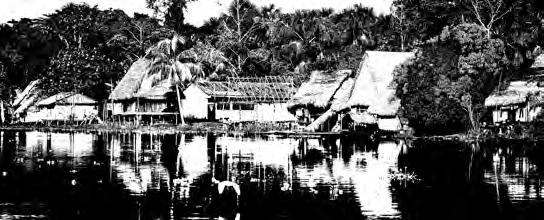




We have registered reserves in Brazil, the United States and Argentina. In these areas we do not have reservations that are five kilometers or less away from indigenous lands.
According to Bolivian legislation, we do not have reserves in that country, as they belong to the Bolivian State. Petrobras’ operations in Bolivia close to indigenous communities are located in the Sábalo field, in the San Antonio Block. In this camp, there are around 70 families in the Guaraní Tierra Comunitária de Origem (TCO), called Tucainty. TCO has an area of 20 ,000 hectares. In this area, there is a road approximately 36 km long, community houses are distributed along this road. It is characterized by dispersed housing (with a distance varying between two and five kilometers between dwellings).
The relationship with indigenous peoples and traditional communities is established both through mandatory actions, resulting from environmental licensing conditions (such as the Environmental Education Project, the Traditional Territories Characterization Project, and compensation projects for fishing activities), and through voluntary actions, such as corporate social responsibility projects and socio-environmental investments.
An example of these actions is the Povos - Território, Identidade e Tradição (Peoples - Territory, Identity and Tradition) Project, the result of a historical demand from traditional communities to environmental agencies and the Public Prosecutor’s Office. The Povos Project (Traditional Territories Characterization Project - PCTT), a pioneering condition of Environmental Licensing required of Petrobras by Ibama, related to the Pre-Salt Stage 1, 2, and 3 developments, is the most comprehensive initiative for social cartography and characterization of traditional communities in Brazil. It is a project carried out in the Santos Basin, which aims to characterize the traditional communities located in the municipalities of Mangaratiba/RJ, Angra dos Reis/RJ, Paraty/RJ, Ubatuba/SP, Caraguatatuba/SP, São Sebastião/SP, and Ilhabela/SP. It systematizes the information obtained in a digital webmaps platform (www.plataformapovos.org) and in graphic material with accessible language for use by communities.
The launch of the project’s results and the Webmaps Platform took place at Ibama’s headquarters in Brasília on November 12, 2024, with the presence of leaders from Fiocruz, Petrobras, Ibama, and the Forum of Traditional Communities (FCT), respectively.
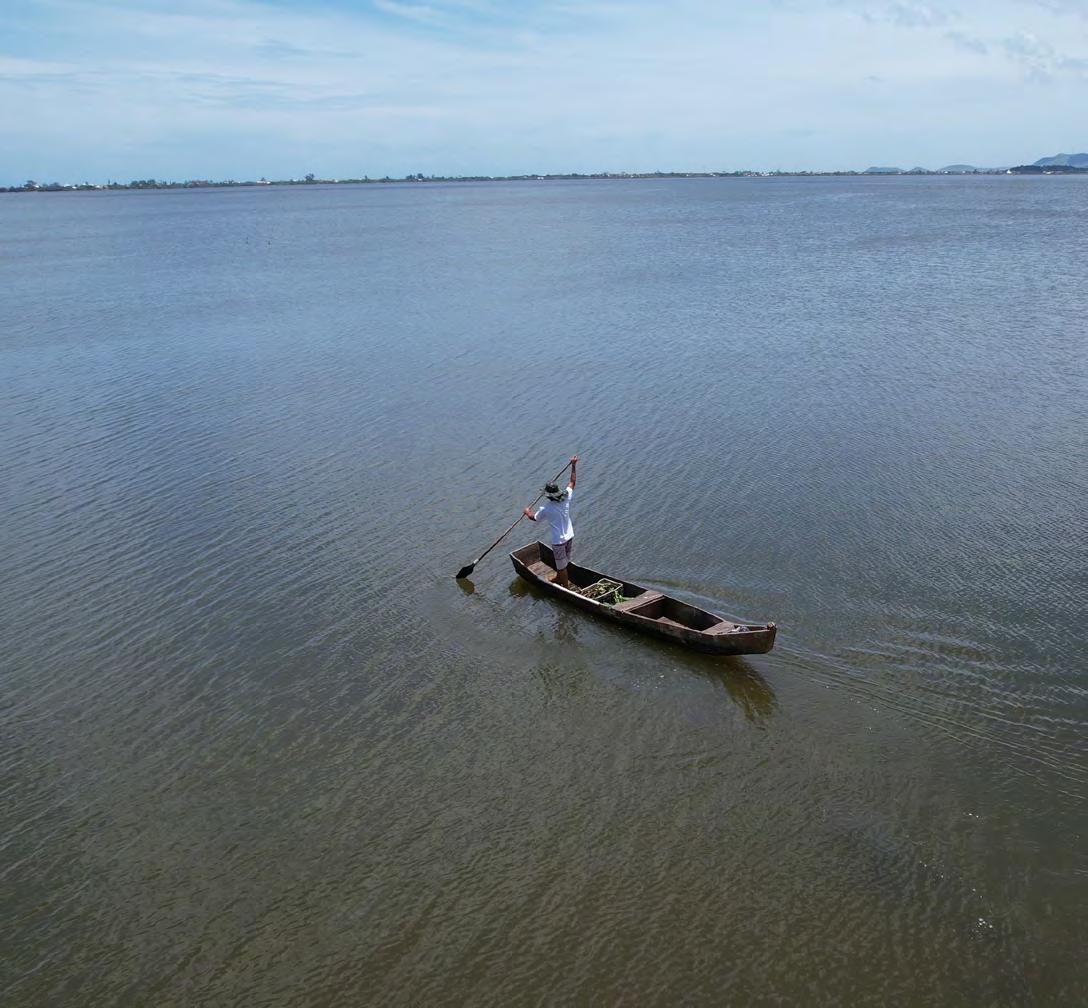
In the pilot project, which took place from 2018 to 2023 in the municipalities of Angra dos Reis/RJ, Paraty/RJ, and Ubatuba/SP, the traditional peoples and communities (PCTs) themselves carried out the characterization of the territories of the Caiçara, Quilombola, and indigenous communities through primary surveys, with the help of technicians, through workshops and field interviews, as well as through secondary data. The information collected included all land and marine territory occupied by the communities. The project’s execution is the responsibility of the Bocaina Observatory of Sustainable and Healthy Territories (OTSS), a partnership between the Forum of Traditional Communities (FCT) and the Oswaldo Cruz Foundation (Fiocruz).
The process was planned, discussed and structured with the communities, who validated information collected by the research team and decided which themes would be characterized and mapped throughout the project (according to the current situation of conflicts and vulnerabilities), in line with the National Policy for the Sustainable Development of Traditional Peoples and Communities (Decree No. 6040/2007) and Convention No. 169 of the International Labor Organization (ILO) on Indigenous and Tribal Peoples.
The FCT, the National Coordination of Caiçara Traditional Communities (CNCTC), the National Coordination of the Articulation of Black Rural Quilombola Communities (CONAQ), the Guarani Yvyrupa Commission (CGY), and community associations monitored the execution of the activities and acted as intermediaries between the communities and the technical team dedicated to the project, which also included community members.
At the end of the first five years of execution, a set of 98 characterized communities was gathered, distributed across ten micro-territories (grouping of communities) between the municipalities of Angra dos Reis, Paraty, and Ubatuba. The systematization of this information resulted in a set of documents important for the promotion of socio-environmental justice for these communities. In 2024, the project’s scope was expanded to the municipalities of Mangaratiba/RJ, Caraguatatuba/SP, São Sebastião/SP, and Ilhabela/SP, totaling seven municipalities. Petrobras and Ibama are in talks with the Forum of Peoples and Traditional Communities of the Ribeira Valley to also start the project in the municipalities of Iguape, Ilha Comprida, Cananéia, and Peruíbe, in the southern region of São Paulo. More information about the project can be found at the Comunica Bacia de Santos website.
Our voluntary socio-environmental investments develop specific actions focused on the registration and valorization of indigenous culture and the culture of traditional communities, starting from the strengthening of the protagonism of these populations.
Through the Petrobras Socio-Environmental Program, we support 65 socio-environmental projects that aim to contribute to the institutional strengthening and autonomy of indigenous peoples and traditional communities, which represents 57% of the number of projects currently supported by the Program. In total, there are 105 indigenous peoples and villages, 88 Quilombola communities and another 164 traditional communities assisted through support for conservation actions with sustainable use of natural resources, which consider ways of life, production systems and knowledge associated with socio-biodiversity.
Given that indigenous peoples are guardians of much of the world’s remaining biodiversity, they play an indispensable role in the conservation and sustainable management of natural resources. Indigenous peoples live mainly in areas that are important for mitigating climate change, due to the forests’ ability to capture carbon dioxide and produce oxygen, the number of water sources and biodiversity. In this way, the Berço das Águas project, supported by the Petrobras Socioenvironmental Program, seeks to reverse the environmental degradation of these ecosystems, in order to guarantee a better quality of life for these people and the sustainability of the planet.
Since 2011, Berço das Águas has contributed to the territorial and environmental management of several indigenous lands in the Juruena River basin. In the three previous editions of the project supported by Petrobras, the executing institution Operação Amazônia Nativa (OPAN) facilitated the preparation and implementation of territorial and environmental management plans in five indigenous lands: Manoki, Myky, Pirineus de Souza, Tirecatinga and Rikbaktsa. Currently in its fourth edition (2024-2026), the project focuses on the Rikbaktsa and Apiaká peoples, covering three Rikbaktsa indigenous lands (TI Erikpatsa, TI Escondido and TI Japuíra) and one Apiaká indigenous land (TI Apiaká do Pontal and Isolados), totaling 1,387,033 hectares. These territories are located in the region where the Juruena and Tapajós rivers form.
The project’s actions include territory monitoring and protection, sustainable management of natural resources, strengthening of indigenous organizations, and promotion of economic alternatives, such as community-based tourism. These initiatives aim to conserve biodiversity and ensure food security for the communities involved. The collaborative relationship between the project and indigenous peoples is fundamental to the success of the activities, reflected in workshops, training and the participatory development of territorial and environmental management plans.
Guided by the UN Sustainable Development Goals and the indigenous demands expressed at the 2nd Climate Justice Seminar for the Protection of the Rights and Sovereignty of Indigenous Peoples, we understand that guaranteeing fundamental rights is linked to investment in renewable energy, infrastructure and the preservation and restoration of terrestrial and aquatic biomes.
Among the developed projects, we also highlight those that foster income generation through sustainable production and/or community-based tourism:
Implemented by the Pacto das Águas (Water Pact) institution, the project covers over 1.4 million hectares of Amazon Rainforest in five indigenous lands and one extractive reserve located in the Northwest of the state of Mato Grosso. In 2024, the project solidified sustainable and collaborative practices in northern Mato Grosso, strengthening the Amazon’s socio-biodiversity by integrating traditional knowledge and innovation. Through 28 technical visits and 5 training sessions, it benefited 548 extractivists in the management and commercialization of products such as Brazil nuts and rubber and empowered 85 indigenous women extractivists in handicrafts and honey production. Environmental education initiatives reached 1,231 students and teachers, and an additional 279 people in indigenous lands and the Guariba-Roosevelt Extractive Reserve, promoting forest conservation and cultural belonging. A significant achievement was the development of the Rikbaktsa People’s Consultation Protocol, ensuring participatory decisions about their territories, aligned with human rights.
Implemented by the Imaflora institute and supported by Petrobras since 2013, the project contributes to maintaining forests standing through the implementation and maintenance of sustainable production systems on 480 hectares of forest and sustainable extractivism in the Amazon, promoting local socio-biodiversity products. Over the past three years, it has contributed over BRL 3 million to generating and increasing income for families through the management and commercialization of Amazonian socio-biodiversity products and family farming. Activities take place in an ethical market, with participants included in a system that guarantees the origin of products and traceability throughout the production chain. By establishing commercial partnerships with communities, companies and public schools interested in purchasing the products, the project has already benefited more than 1,086 members of traditional Amazon communities, including family farmers and Quilombolas from four communities (Erepecuru, Trombetas, Alto Trombetas I, and Mãe Domingas) organized into five associations and one cooperative. For this audience, more than 20 training courses have already been offered, three technical publications have been produced, and awareness campaigns have been developed on the value of standing forests. The project also has the advantage of strengthening biodiversity in the Trombetas-Mapuera, Nhamundá-Mapuera and Kaxuyana-Tunayana indigenous territories, in the aforementioned Quilombola communities and in seven conservation units in the states of Pará and Amazonas, covering an area of more than ten million hectares.
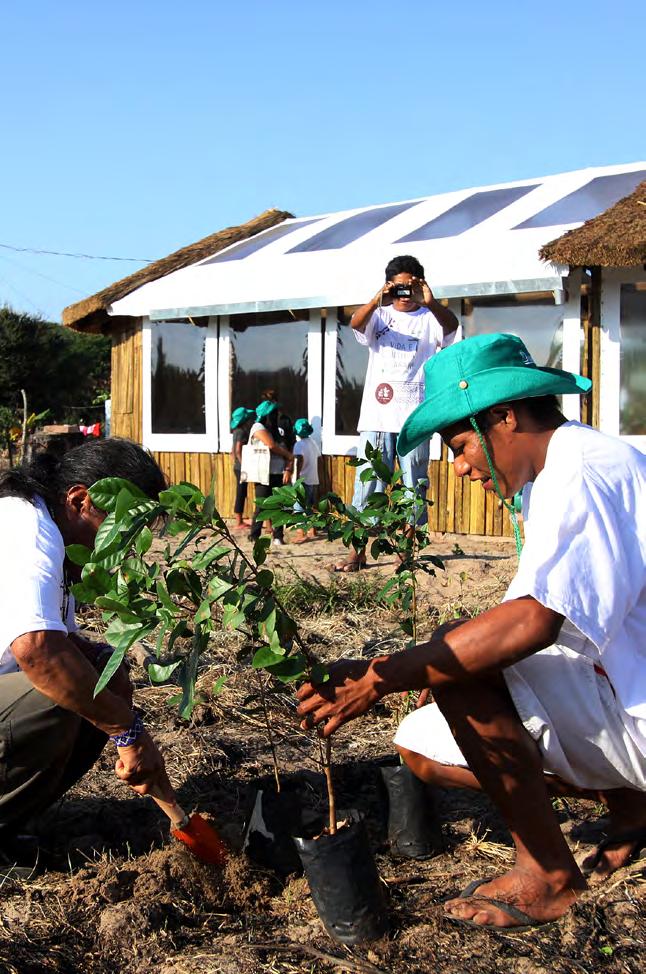
UÇÁ Project – engagement of traditional and local peoples in the conservation of Guanabara Bay and accessible environmental education (RJ)
The UÇÁ Project, carried out by the third sector organization Guardiões do Mar and supported by Petrobras since 2012, seeks environmental conservation and the promotion of human rights through actions aimed at the recovery of the mangroves of Guanabara Bay (RJ), with the leading role of vulnerable groups. Since its inception, the project has restored 18.2 hectares with the planting of 64,500 mangrove seedlings and is now preparing to restore another 20 hectares in the Guapimirim APA. Among its actions is the hiring of traditional peoples to clean the mangroves during the closed season for the mangrove crab, in the so-called LimpaOca Operation. In the last cycle of the project, from 2021 to 2024, 90 grants were provided to local fishermen and crab collectors, who removed 22,257 kg of solid waste from a 23-hectare area of mangroves in Guanabara Bay. In the 2023 edition of Operação LimpaOca, the project reached the milestone of half of women participants for the first time, an advance in gender balance when compared to other editions. Also, the project carried out more than 200 hours of training activities, strengthening skills, abilities and behaviors, including representatives of traditional and local peoples as audiences for the courses and training. The initiative also implemented affirmative actions to assist its audience with functional diversity. In partnership with the National Institute of Education for the Deaf, it used materials translated into Brazilian Sign Language - Libras, benefiting 225 deaf students. Additionally, the project launched the Virtual “Andada do UÇÁ” in Libras, which is one of the environmental education tools about the mangroves and Guanabara Bay. Another significant partnership with the Inclusion School of Universidade Federal Fluminense resulted in the creation of an unprecedented glossary of Libras signs about the mangrove ecosystem, with a free e-book.
In 2024, Transpetro began mapping water peoples and traditional communities. The work will provide consistent and relevant information about fishing communities in their areas of influence for efficient action in the event of an accident. The activity involves studying remediation actions through negotiation, based on listening sessions to understand the impacts experienced from spills, and creating joint projects to address community needs. Regarding traditional communities, in 2024 mapping was initiated for Indigenous and Quilombola communities in areas adjacent to Transpetro’s onshore terminals to understand their distribution, living conditions, and specific characteristics. This action is aligned with the guidelines of the subsidiary’s Social Responsibility Policy, approved in 2024.
Although the mapping prioritizes Indigenous peoples and Quilombola communities, it covers a broader range of traditional peoples, such as artisanal fisherfolk, shellfish gatherers, crab collectors, family farmers, Caboclos, extractivist peoples, riverine peoples (Ribeirinhos), Caiçaras, mariculturists, among others.
The indigenous territories identified at this stage of the mapping include:
1. Cajuhiri Atravessado – Peoples: Kambéba, Miránha, and Tikúna. Location: Coari River Terminal (UO-NORTE), where Transpetro executes the Basic Environmental Plan (PBA) in collaboration with FUNAI (National Foundation of Indigenous Peoples).
2. Caieiras Velha II – Peoples: Guarani Mbya and Tupiniquim. Location: Barra do Riacho Waterway Terminal (TABR), Espírito Santo (UO BAES);
3. Comboios – Peoples: Guarani and Tupiniquim. Location: Barra do Riacho Waterway Terminal (TABR), Espírito Santo (UO BAES);
4. Tupiniquim – People: Tupiniquim. Location: Barra do Riacho Waterway Terminal (TABR), Espírito Santo (UO BAES);
5. Guarani Mbya – Location: Angra dos Reis Terminal (UO-RJMG);
6. Ribeirão Silveira – People: Guarani. Location: São Sebastião Waterway T erminal (UO SPL SSPCO SPP).
In 2024, Transpetro held the 1st Seminar on Indigenous Culture and Traditionality in the city of Coari (AM). The event was attended by FUNAI, local leaders from UICAM (Union of Indigenous Peoples of Coari Amazonas), representatives of the Tikuna ethnicity, and representatives from the villages of Tupã da Fazenda, Cajuhiri Atravesado I, and Cajuhiri Atravessado II.
In addition to these actions, our subsidiary has a Basic Environmental Plan (PBA) that seeks to establish a permanent relationship of trust between the Indigenous population and the company, aiming for permanent and transparent dialogue capable of building bonds and minimizing conflicts. The plan has been developed since its approval in 2023 with three structuring programs: “Resgate dos Parentes” (Kinship Rescue); Strengthening the Production and Commercialization of Brazil Nuts and Açaí; and Improvement and Strengthening of the agricultural product value chain.
The Protective Intelligence and Corporate Security Policy is the document guiding security actions within the Petrobras System. Corporate security operations are conducted according to the treatment strategy for intelligence and corporate security risks, considering assets and their interdependence in the value chain, and acting crossfunctionally with the business and support areas of Petrobras and its subsidiaries.
In Brazil, the Federal Police regulates private security activities. We contract specialized private security companies to provide security services at our facilities, adhering to current regulations which stipulate that asset security activities may only be carried out within the boundaries of the guarded premises.
In our Brazilian operations, we also establish Memorandums of Understanding (MoUs) with public security forces for exchanging intelligence information aimed at protecting corporate assets. Security operations in Brazil also include conducting corporate investigations into security incidents and managing access control to company facilities.
Internationally, we operate in six countries: Argentina, Bolivia, Colombia, the United States, the Netherlands, and Singapore. In Argentina, the United States, the Netherlands and Singapore, Petrobras’ physical presence consists of administrative offices where security is the responsibility of the building management where the office is located; consequently, there is no local corporate security operation. In the case of Bolivia and Colombia, corporate security is operationalized by the respective Petrobras system companies based on the Protective Intelligence and Corporate Security Policy.
Our methodology for Intelligence and Corporate Security Risk Management includes analyzing the interaction between the internal and external environments of our facilities in order to identify threats that could compromise the security of people, installations, and our business. In managing our intelligence and corporate security processes, developing security studies, and creating other related outputs, we consistently adhere to legislation and standards related to human rights, as well as market best practices.
For the external scenario, we use intelligence analysis that covers, among other issues, the mapping and monitoring of external threats, through sources specialized in security risk management in Brazil and abroad, monitoring of crime rates and other information relevant to foresee and prevent potential conflict situations. Based on this analysis, we carry out a risk assessment and develop corporate security actions and procedures with a focus on preventing and responding to the risks of intentional acts, as well as anticipating critical security issues with the potential to impact the company’s business to managers.
In the internal context, we carry out processes and use technological resources that contribute to planning responses in cases of conflict. As an example of the technology used, we have drones used in large areas, such as refineries and onshore production fields, and the Mobile Property Security Units (UMSP), used in production shutdowns or occasional monitoring of remote locations.
The Local Property Security Plan (PLSP) is the plan that establishes standardized procedures and actions related to preventive and/ or reactive security practices. The entire security team at our units is trained in their respective PLSP, which is aligned with corporate guidelines, among which the following stand out:
• Conduct guide - guidelines to all members who make up the unit’s corporate security body (employees and private security service providers), so that they can perform their duties in an ethical and safe manner, as provided for by the company’s internal rules;
• Guidance on preventive action and proportional use of force, that is, what is necessary to contain the threat actor, when applicable;
In 2024, the human rights training plan included lectures aimed at raising workforce awareness and communicating the corporate guidelines and channels for making reports and complaints. These events were held in virtual and in-person formats, targeting direct employees and service providers, including leadership, within the Intelligence and Corporate Security (ISC) area. Additionally, 26 in-person workshops were held, addressing our guidelines on security and human rights and covering 598 professionals. Eight live streams titled “Human Rights in ISC: A look at caring for people” were also conducted, addressing themes such as “Masculinities and sexism,” “Violence against women,” “Guidelines on the use of social names,” “People with disabilities (PwD),” and the “Petrobras Well-Being Program (PPBEM),” with an average participation of 174 employees per event. Beyond training opportunities for the entire workforce, four specific training events were held for the leadership of the Intelligence and Corporate Security area, with an average participation of 46 leaders per event.
In addition to these awareness actions, security teams also participated in weekly Health, Safety, and Environment (HSE) Dialogues, during which themes related to human rights, diversity, and combating moral harassment, sexual violence, and discrimination were addressed.
It is important to highlight that the entire workforce performing asset security duties is trained and undergoes refresher training every 2 years, in compliance with relevant legislation and in accordance with the Federal Police (PF/MJ). Property security activity necessarily meets legal requirements, applicable both to organic security (consisting of own employees) and to contracted surveillance service companies. All security activities are subject to supervision by the Federal Police (PF/MJSP), the regulatory and supervisory body for private security activity in Brazil.
The syllabus for the initial training and refresher courses for security guards includes aspects of Constitutional and Criminal Law, private security legislation, and interpersonal relations. These are based on respect for human dignity, aiming to curb discriminatory practices or those disrespectful of human rights, especially concerning combating violence based on gender or sexual orientation, or against children, adolescents, the elderly, and people with disabilities (PwD), as well as ensuring the correct and proportional use of force.
Additionally, contracts with security companies stipulate the legal obligation to maintain the operating licenses of the contracted parties and ensure the training of professionals working at our units. Contracted companies are evaluated in terms of the quality of services provided, compliance with legal requirements and other items. The scores or ratings achieved by security service providers and other evaluation data are recorded in corporate systems, considered in critical review meetings, and are available for internal and external audits.
Complaints and reports related to corporate security activities can be communicated to the Petrobras General Ombudsman’s Office, with the anonymity of the reporting person guaranteed. These will be handled according to corporate procedures, with periodic reports made to senior management. If they refer to outsourced security services, the sanctions provided for in the contract are adopted.
In Brazil, less than 2% of our proven reserves are located within or near active conflict areas, according to the definition of the Sustainability Accounting Standards Board (SASB). This percentage refers to proven reserves according to Securities and Exchange Commission (SEC) criteria for fields with onshore production facilities situated in municipalities where more than 25 violent deaths have been recorded. We have no proven reserves within or near conflict areas in the United States and Argentina.
Our transparent and collaborative approach with the supplier market is based on principles of governance and sustainability. Through an extensive relationship agenda and the Supplier Channel , we maintain an ongoing dialogue with suppliers of goods and services, centralizing institutional information, detailed guidelines on registration, qualification and pre-qualification, as well as technical specifications and contractual drafts. This channel also serves to share our compliance and sustainability guidelines, accessible in the “ESG, Innovation and Compliance” section of the portal. ”
Additionally, our subsidiary Transpetro has a dedicated channel to interact directly with its supplier base.
We believe in transparent dialogue, active listening, strengthening the supplier base and continuous training as foundations for a solid and productive relationship. We hold monthly live-streamed events, widely publicized on the Supplier Channel, which address sustainable practices, human rights and strategic issues for the supply chain. In 2024, over 3,500 external participants attended these meetings. Concurrently, we conduct in-person meetings across various regions of the country (Petrobras Roadshow – Meeting with Suppliers) to strengthen regional markets, highlight local business opportunities and projects, promote decarbonization initiatives, present financing programs for suppliers, and reinforce Petrobras guidelines related to preventing corruption, sexual harassment, and workplace violence, among other relevant topics. Since 2023, these events have mobilized more than 1,100 supplier companies. In November 2024, we held the first Petrobras Webinar on Integrity in the Supply Chain, with the aim of training our supply chain on topics related to integrity. This edition addressed crucial issues such as human rights and labor relations, demonstrating to our suppliers how these themes are handled at Petrobras. This event represents a significant step forward towards our goal of training 100% of relevant suppliers on integrity and/or privacy by 2030, in addition to reinforcing our commitment to promoting ESG practices among our stakeholders.
In 2024, Petrobras implemented the Regionalization of Small-Value Purchases initiative (covering purchases up to BRL 85,000 / approx. USD $17,000), reinforcing its commitment to local development and valuing the communities where it operates, aligned with principles of respect for human rights and social responsibility. As a result, more than 56,000 items were contracted from regional companies, an increase of over 28% compared to 2023. By decentralizing procurement processes and bringing them closer to regional realities, the company improved its ability to identify local needs, establish more transparent relationships with suppliers, and strengthen the local economy.
This model accelerated the contracting of goods, incentivized job creation, expanded inclusion opportunities for under-represented groups, and contributed to promoting decent work practices and fairer, more sustainable commercial relations. Additionally, the strategy reduced transportation costs and service delivery times, while reinforcing attention to potential risks of human rights violations along the supply chain.
The presence of regional teams facilitated dialogue with stakeholders, ensuring respect for cultural diversity, the values of traditional communities, and applicable legislation. Thus, the regional purchasing policy consolidated a preventive approach, committed to the remediation of potential negative impacts, and ensured that business partners operated in alignment with the company’s social responsibility and sustainability guidelines.
In addition, in 2024 we expanded support for our suppliers by inaugurating in-person support centers in Ipojuca/PE, Macaé/RJ, Manaus/AM, Paulínia/SP, Rio de Janeiro/RJ, São José dos Campos/SP, and Salvador/BA. Complementing remote support via videoconferencing, these structures ensure accessible and effective channels for clarifying doubts about registration and other matters, further strengthening integration with the supply chain.
The project was recognized in the internal “Petrobras Pride” awards, in the “Commitment to Petrobras and the Country” category.
In its 7th edition, held in 2024, our awards program recognized the performance of 30 national and foreign companies that supplied goods or provided services between January 1, 2023, and June 30, 2024. The companies were awarded in various categories, with emphasis on eight special ones: Environment; Safety; Health; Research, Development & Innovation (RDI); Quality Management; Human Rights; Governance; and Decarbonization.
In the Human Rights dimension, awards were granted based on the evaluation of projects focused on:
• Promoting diversity and inclusion
• Combating prejudice, discrimination and harassment
• Eradicating child labor
• Eradicating slave labor or slave-like labor
• Addressing the sexual exploitation of children and adolescents
• Human rights due diligence
This initiative encourages the adoption of best practices and the sharing of successful experiences throughout the supply chain.
More information about the criteria and winners is available on the Supplier Channel
Strengthening the ESG (environmental, social and governance) culture among suppliers is a strategic priority. The ESG Journey for Suppliers offers educational content related to human rights, compliance, health, safety, environment (HSE), and climate change, promoting the continuous improvement of sustainable practices. In 2024, more than 600 companies participated in the ESG Journey.
Over 800 companies responded to the “ESG Questionnaire for Suppliers,” enabling the monitoring of practices and identification of improvement opportunities, contributing to a more engaged and sustainable supply chain.
In November 2024, we received the ESG in Purchasing award from INBRASC (Brazilian Institute of Supply Chain) in recognition of the positive results of these initiatives. This achievement reinforces our commitment to leading responsible practices, aligning supplier management with Petrobras’s sustainability and governance goals.
In addition to internal actions for supply chain engagement, in December 2024, we signed an international technical cooperation agreement with the United Nations Office on Drugs and Crime (UNODC) to develop a compliance training project for small and medium-sized enterprise (SME) suppliers. The objective is to disseminate good governance and compliance practices, according to the guidelines of the United Nations Convention Against Corruption (UNCAC) and Petrobras values. The agreement provides for the development of a risk assessment methodology, training courses, and tools for building integrity programs, and has the potential to impact more than 400 companies in our supply chain, which will receive personalized training in corporate integrity.
The procurement of goods and services at Petrobras includes Health, Safety, and Environment (HSE) and sustainability requirements, in addition to legal and regulatory ones, tailored appropriately to the risk, nature, and size of the goods and services being contracted. These requirements are considered in the documentation that specifies and supports all activities within the procurement and contract management process. Furthermore, these requirements are implemented, monitored, and evaluated throughout the contract term with suppliers.
Concern or the working conditions of contractor employees is a topic of significant importance for Petrobras’s human rights agenda. In 2023, the executive director of Corporate Affairs created a working group, with the participation of strategic areas of the company, to analyze and propose improvements in the working conditions of workers who work under Petrobras service provision contracts.
Based on a study of Petrobras’s contractual conditions, our internal oversight strategies, and the work context within these contracts, we developed an action plan with a horizon extending to 2030, aiming to promote improvements in supply chain management. One of the most recent outcomes concerns the Human Rights Clause, which will be presented next
By the end of 2024, we have expanded contract coverage through a new health plan clause, benefiting more than 50% of supplier company employees, including their dependents, with costs assumed by Petrobras.
Fair remuneration in the supply chain
As of May 1, 2024, we have reduced the payment term of contracts from 90 to 30 days. This standardization is in line with our 2025–2029 Business Plan, strengthening the financial health of the supply chain and meeting the social commitments of the ESG agenda, maintaining a solid supplier base to achieve the objectives set for the coming years.
We recognize the essential role of service provider companies in promoting diversity, equity, and inclusion (DEI). This commitment is fundamental for building a welcoming and respectful work environment, as well as increasing the representation of historically minoritized groups.
In 2023, we initiated a comprehensive assessment of opportunities to expand DEI efforts among service providers in the Búzios Field. Monthly meetings culminated in a survey of 57 companies, addressing three main dimensions: (i) the existence of diversity programs and the level of commitment; (ii) affirmative actions in employee recruitment and development processes; and (iii) the maturity level of the organizational culture regarding diversity. As a result, we developed the Diversity Dashboard, a tool designed to establish metrics, address challenges, share best practices, and define a collaborative action plan.
After identifying a lack of diversity in the teams involved in technical cooperation agreements (TCs) signed by us with public and private universities, we also created a working group (WG). This WG aims to foster the adoption of affirmative actions to increase the participation of under-represented groups in research projects within Science, Technology, Engineering, and Mathematics (STEM) fields.
The goal of the WG was to define criteria for the composition of teams executing the TCs signed with universities, with regard to diversity; and create a standard clause for inclusion in draft TCs that includes a minimum share for women, black people, people with disabilities and other underrepresented groups in project execution teams.
The WG was concluded in November 2023 with the proposal of a diversity clause reserving 20% of vacancies for professionals from underrepresented groups, ensuring their presence, preferably, in the composition of work teams. The clause became mandatory for all Technical Cooperation Agreements (TCs) signed by the Leopoldo Américo Miguez de Mello Research and Development Center (Cenpes) starting in May 2024. A total of 16 TCs have been signed to date (9 during the pilot phase and 7 after the clause’s mandatory implementation).
We implemented the Employability with Efficiency, Quality, and Safety Program (PROEQS) during the maintenance shutdown of the Presidente Bernardes Refinery (RPBC), with the main objective of boosting the employability of the local workforce. Developed in partnership with the Cubatão city hall, unions, workers’ associations, and the National Employment System (SINE), PROEQS aims to meet the needs of the formal labor market by promoting an effective match between job openings and qualified professionals and ensuring a transparent and collaborative hiring flow.
One of the most significant results of PROEQS was the hiring of 72% local labor from the Baixada Santista region, totaling 1,675 people hired, with 100% of these hires made through the Worker Support Program (PAT) and SINE. Additionally, the program stimulated the hiring of women, with 180 female employees hired. PROEQS not only met the goal for utilizing local labor but also contributed to social stability during the shutdown, which occurred without recorded instances of social movements or strikes.
In order to prevent any degrading work practices in our supply chain, our standard contract draft has a clause demanding a guarantee of compliance with labor precepts provided for in current Brazilian legislation. Failure to comply with this clause entitles us to terminate the contract with the supplier. Furthermore, there is also a clause prohibiting the use of child or slave labor in all activities related to the execution of the contract. This requirement is also included in the Ethical Conduct Guide for Suppliers, which extends this commitment to our suppliers’ subcontractors.
Furthermore, since 2005, we have been signatories to the National Pact for the Eradication of Slave Labor. In June 2015, we joined the National Pact for the Eradication of Slave Labor Institute - InPACTO. InPACTO is a non-profit organization that mobilizes different sectors, such as industry, civil society and the public sector, to promote decent work. It constitutes a space for debate, exchange of information and establishment of plans and joint actions for large companies operating in Brazil. It is also a means of articulation with the Ministry of Labor and the International Labor Organization (ILO).
By joining InPACTO, the associated company assumes the responsibility of fulfilling ten commitments related to the prevention and eradication of slave labor. In order to meet these objectives, an action plan was drawn up by the Social Responsibility, Legal and Procurement areas, covering the issue throughout the supply chain. The plan includes actions such as raising opportunities for improvement in internal standards and regulations related to contracting suppliers and developing an action plan to prevent and combat slave labor, together with partner areas, among other specific actions.
Regarding reports of child labor and slavery-like labor in our operations and supply chain, we found that, in 2024, there were no reports of this kind in the company.
As set out in our Supplier Ethical Conduct Guide, we are committed to the highest standards of integrity, social and environmental responsibility, and ethical conduct. Thus, our suppliers must provide safe working conditions, treat their workers with dignity and respect, act with integrity and ethics, and be in full compliance with applicable laws and regulations. These obligations are set out in both our draft contract and the Guide to Ethical Conduct for Suppliers.
In November 2024, Petrobras inserted the new human rights clause into the standard contractual draft for the provision of services, which aims to encourage Petrobras’ supply chain to respect and promote human rights in its operations.
The inclusion of the new human rights clause is an important strategy for the protection of socially vulnerable individuals, communities and groups. In addition to preventing and mitigating risks, it promotes responsible practices in the supply chain. Additionally, this clause strengthens the reputation and competitiveness of companies, creating long-term value for all parties involved. For Petrobras, it is an opportunity to ensure that its strategies and practices are aligned with universally accepted principles within its supply chain and, in doing so, promote leadership by example in the industry.
The clause seeks to give greater effectiveness to the provisions outlined in Petrobras’s Supplier Code of Ethical Conduct, Human Rights Guidelines, Social Responsibility Policy, and Diversity, Equity and Inclusion Policy. It does so by ensuring that supplier companies commit to respecting human rights—as established in the International Bill of Human Rights, the ILO Declaration on Fundamental Principles and Rights at Work, and other national and international instruments—and require the same commitment from their subcontractors.
The clause incorporates several important achievements, such as the inclusion of underrepresented groups in contracts involving more than 80 people, the requirement for gender pay equity, the protection of human rights defenders as well as Indigenous peoples and traditional communities, and safeguarding whistleblowers against retaliation while reports are under investigation.
Points were also included such as respect for the right to freedom of association, the adoption of sustainable environmental practices, and the provision of an annual declaration of compliance regarding Human Rights.
Additionally, emphasis was expanded on issues like promoting a safe and healthy work environment; commitment to promoting and protecting human rights; prohibiting the practice or tolerance of any act of prejudice, discrimination, harassment, sexual exploitation of children and adolescents, child labor, or conditions analogous to slavery; and cooperation by contracted parties with company audits and investigations.
With the inclusion of the new human rights clause, Petrobras reinforces its commitment to the value of Care for People.
In order to mitigate the risks related to integrity in the contracting process, we carry out the integrity due diligence (IDD) process in our supply chain. The result of this process is expressed through the Integrity Risk Degree (GRI), which can be low, medium or high. Companies with a high GRI are prevented from participating in contracting procedures with Petrobras, except in exceptional cases provided for in our internal rules.
In 2024, we carried out the integrity due diligence process on 1,821 suppliers. Since October 2023, in line with Petrobras’ ESG commitments, we have expanded the scope of the DDI to cover verification of respect for human rights and the protection of personal data in our supply chain.
In line with our commitment to operating with integrity and fulfilling the strategic commitments outlined in our PE 2050, in 2024 we implemented the human rights due diligence (HRDD) procedure for the company’s relevant suppliers. This initiative, which aims to cover 100% of these suppliers by 2030, reinforces our dedication to acting ethically, with integrity, and transparency by promoting the company’s commitment to human rights within our supply chain.
Based on these documents and internal standards guiding the inspection of goods and services contracts, we verify compliance with contractual clauses regarding aspects related to Health, Safety, and Environment (HSE), as well as Social Responsibility (SR), including labor obligations. For the latter, we require monthly submission of necessary documentation as proof of fulfillment of labor and social security obligations and payment of the National Severance Fund (FGTS). Non-compliance with these contractual norms and obligations is subject to administrative sanctions.
We assess the performance and quality of our suppliers and, when necessary, apply the consequence management system as provided for in our Quality Guide for Suppliers. This can range from the application of fines and other
penalties stipulated in contracts up to the initiation of a Commission for Analysis and Application of Sanctions (CAASE), in compliance with articles 83 and 84 of Law No. 13,303/16. A CAASE may be called in cases of labor, social security or HSE non-compliances, abandonment of contract, unjustified withdrawal from bidding process, failure to comply with the Ethical Conduct Guide for Suppliers, among other conduct considered serious.
Regarding sanctioning processes (CAASE) related to non-conformities in labor practices, 16 companies were sanctioned out of a total of 45 companies sanctioned in 2024. 10. It should be noted that, for contracts considered to pose a greater risk of human rights violations, such as in cases involving intensive use of labor, there is a declaratory social responsibility clause that establishes commitments to social responsibility and human rights for the contracted companies.
In order to assess whether these requirements were met by contracted companies, in 2024, seven social responsibility assessments were carried out with service providers through a checklist, which assessed whether all contractual Social Responsibility requirements had been fulfilled. Among the contracts submitted to the checklist evaluation, no contractual breach was identified.
In addition consulting a checklist, to raise awareness among suppliers and service providers who worked on maintenance shutdowns at our refineries, we carried out a series of actions highlighting the commitments present in our Code of Ethical Conduct, in the Social Responsibility Policy and in the Diversity, Equity and Inclusion Policy and in our Human Rights Guideline. During meetings with this audience, we highlighted the need to develop actions to promote and advocate for human rights, addressing issues such as combating slave-like work, child labor, sexual exploitation, moral and sexual harassment, and discrimination of any kind.
10 Information on sanctioning processes is related to the parent company Petrobras.
In this line of action, at the Presidente Bernardes Cubatão Refinery (RPBC) we held seven human rights workshops for service providers and employees who worked on the unit’s maintenance shutdown, with an audience of more than 160 people affected. We also included a lecture on human rights in the integration training for all 2,350 service providers who participated in the RPBC Maintenance Shutdown.
For continuous human rights diligence in the supply chain, we adopt practices involving dialogue with routine service providers at the Presidente Getúlio Vargas Refinery (Repar), holding presentations on the topic during contract kick-off meetings attended by senior leadership from the contracted companies operating at the unit.
Our subsidiary, Petrobras Biocombustível (PBio), conducts administrative oversight of service contracts, verifying deposits related to social security and the national severance fund (FGTS, INSS; eGFIP), paystubs, and negative debt certificates (CND and CNDT) It also requires, as standard practice, the provision and proper use of personal protective equipment (PPE) in contracts, withholds a percentage of contract payments as a guarantee for labor dues payment, and establishes clauses related to human rights and HSE-focused training.
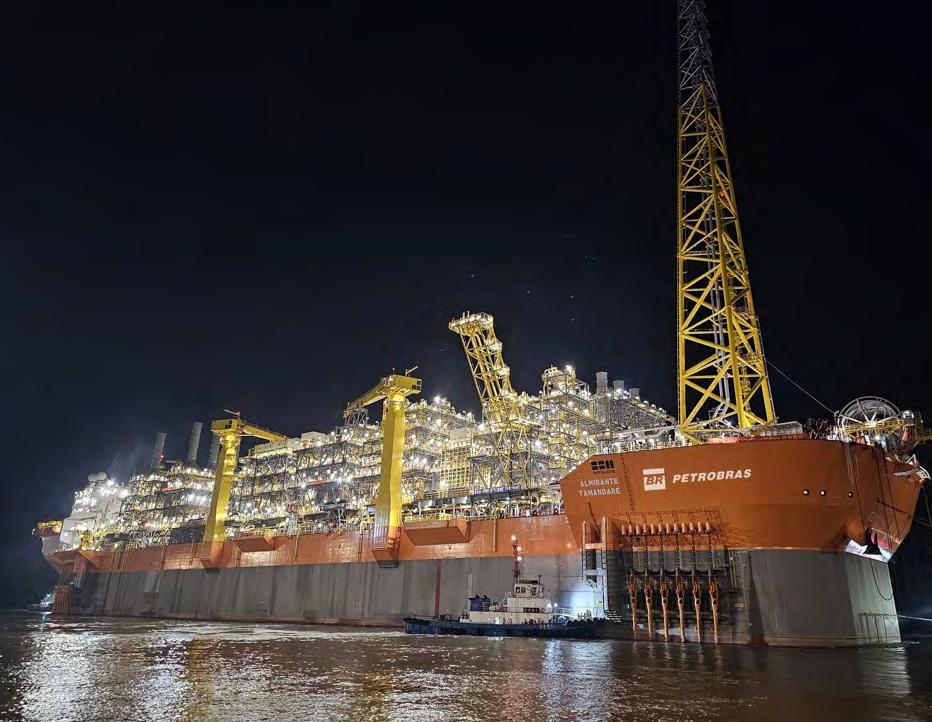
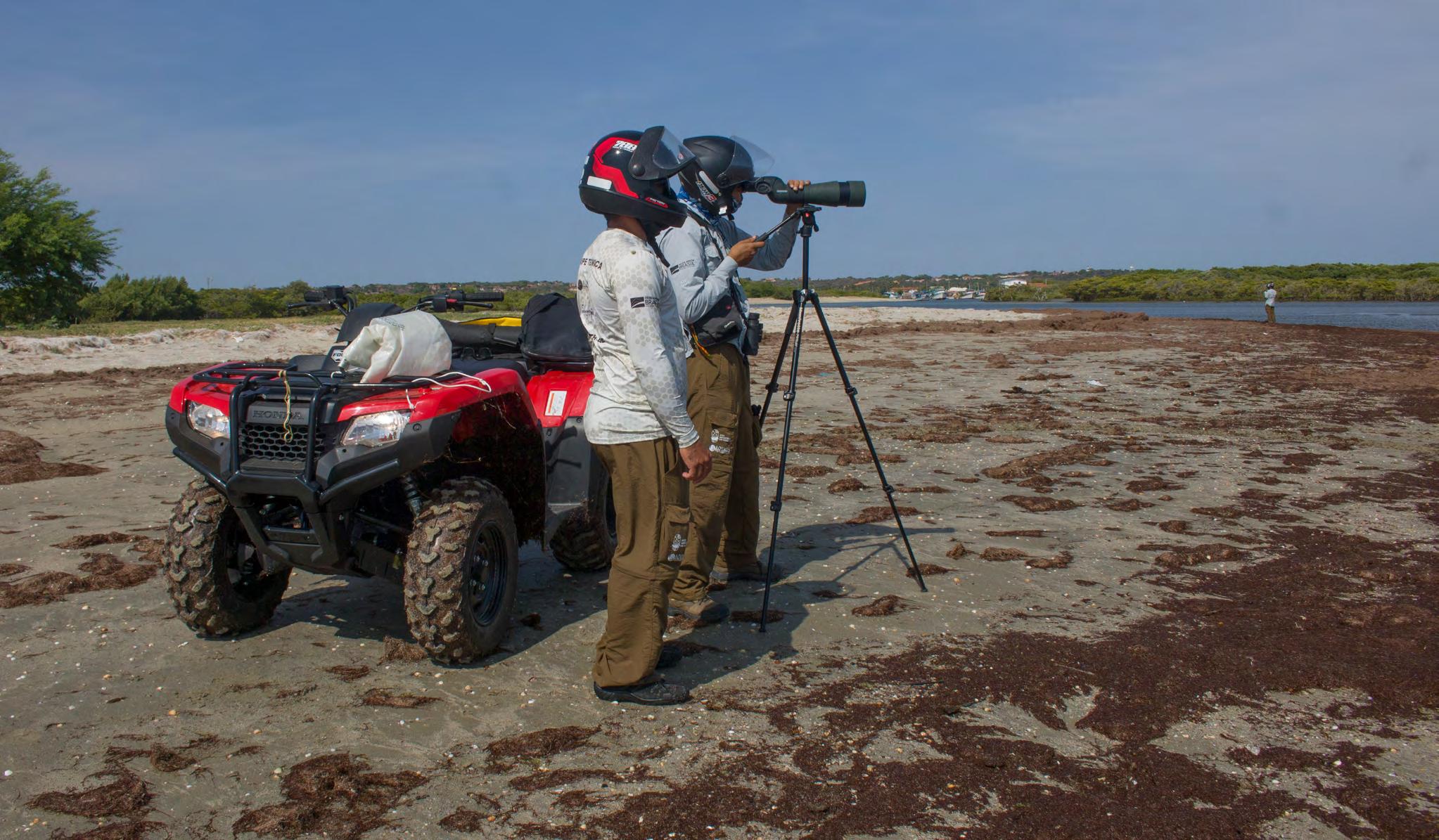
The Human Rights Commission (HRC) is the human rights governance forum at Petrobras, responsible for strategic decisions related to human rights and for managing the implementation of the guidelines and guiding principles established by Petrobras’ Human Rights Guidelines, in an integrated, broad and transversal manner across the business. The Human Rights Action Plan (HRAP) is a HRC management tool that brings together initiatives to achieve the human rights commitments established in the Strategic Planning, such as the promotion and prevention of human rights violations, including the treatment of risks of human rights violations. The HRC is responsible for preparing, monitoring, reviewing and validating the implementation of the PADH, approving strategies and monitoring the completion of actions. The implementation of the Plan is the collective responsibility of all HRC members and is monitored by indicators on a periodic basis.
To monitor our human rights management, we analyze our performance in the main sustainability indexes and benchmarks developed by nationally and internationally recognized institutions. These indexes help us to identify points of improvement related to our human rights processes. These include:
• Dow Jones Sustainability Index
• Corporate Human Rights Benchmark
• EcoVadis
We also monitor performance indicators for our internal processes that allow us to assess our performance and establish mechanisms for continuous improvement, in accordance with the most critical aspects of human rights, in addition to monitoring our performance in the main goals and objectives established in our strategic plan. Some of these indicators are:
• Percentage of employees trained in human rights
• Percentage of people with disabilities
• Percentage of Black individuals
• IERE - Racial Equity Index in Companies (Business Initiative for Racial Equality and Data Zumbi Institute)
• Managerial gender equality indicator (women in leadership)
• Racial equality indicator in management (Black individuals in leadership)
• Gender pay equality indicator (management function)
• Percentage of own E&P and refining operations with human rights diligence
• Percentage of relevant suppliers with human rights due diligence

Our Internal Audit area has played a strategic role in strengthening our commitment to human rights, conducting activities that promote the continuous improvement of processes and internal controls.
In 2024, audit work was carried out seeking to assess the alignment of corporate practices with the company’s human rights values and commitments. Highlights included assessments of community preparedness for major incidents and improvement plans for socio-environmental projects, as well as evaluation of the effectiveness of mitigation measures for harassment and discrimination risks.
Also in 2024, the first human rights audit was conducted on platform construction contracts, which included on-site inspections at 11 contracted and subcontracted shipyards in Brazil, China, South Korea, and Singapore. The initiative, under the responsibility of Internal Audit with technical support from the Social Responsibility area, assessed human rights aspects in the contracting and execution of services for platform construction and decommissioning, based on commitments we have undertaken. The overed six platforms in the construction phase and two platforms undergoing decommissioning, and it prompted actions to improve the evaluated processes.
One of the main challenges in implementing our human rights agenda is the cross-cutting nature of the theme within a company possessing Petrobras’s size and broad scope of operations. As a cross-cutting theme, it encompasses various company areas and processes, making the integration of these processes and actions a complex task. Aiming to increase the integration of human rights actions, we expanded our human rights commission by incorporating new areas. Throughout 2024, we reviewed and prioritized the actions within our Human Rights Action Plan (PADH).
The revised plan provided for greater integration between the human rights and just energy transition agendas. Thus, we continue to ensure our new businesses have minimal negative impact on people and the environment through robust processes covering project assessment, licensing, environmental characterization, stakeholder engagement, social and environmental risk analysis, and due diligence for community protection.
Another highlight of the PADH revision was the increased focus on human rights due diligence (HRDD) processes within our operations and supply chain. In 2024, we initiated the pilot project for integrated HRDD in our operations. This pilot was fundamental for establishing the internal processes and standards that will guide the application of due diligence across all our operations, according to the target set in our strategic planning.
Aiming to improve the integration of actions and prioritize the human rights themes mapped in the HRDD pilots for our operations, we continue to strengthen the corporate programs targeting our main challenges, such as the Commitment to Life Program, the Petrobras Program against Sexual and Workplace Violence (PPCVST), the Racial Equity Program, and the Women’s Mentorship Program.
Additionally, in 2024, the risk of human rights violations in our operations and supply chain was elevated to a strategic corporate risk within our Business Risk Matrix. Consequently, this risk and its corresponding response plan will be monitored by the company’s senior management, including our Board of Directors (BoD), throughout 2025.
Through the implementation of these processes, we reaffirm our purpose to respect human rights, fulfill our responsibility to prevent negative impacts on people arising from our activities, and enhance our contributions to society. In 2025, we shall remain engaged in implementing our human rights agenda integrated with a just energy transition.
